You are using an outdated browser. Please upgrade your browser or activate Google Chrome Frame to improve your experience.

Japanese Phrases for Tourists: 116 Essential Phrases for Your Japanese Vacation
Before I traveled to Japan for the first time, everyone assured me that “Everybody speaks English there,” and I wouldn’t need to use Japanese at all.
But in reality, most of the people I encountered in Japan had a fairly elementary level of spoken English .
For a better travel experience, you should learn some basic travel words and phrases in Japanese.
Greetings and Basic Japanese Phrases
Airport phrases you’ll hear, airport phrases you’ll use, asking for directions, receiving directions, transportation phrases, hotel phrases, eating and drinking in japan: what you’ll hear, eating and drinking in japan: what you’ll say, shopping in japan: phrases you’ll hear, shopping phrases you’ll use, number of items in japanese, tips to use your new phrases: politeness and pronunciation, how to study these japanese travel phrases.
Download: This blog post is available as a convenient and portable PDF that you can take anywhere. Click here to get a copy. (Download)

I’ll provide the hiragana, kanji and romaji for each word, and will explain the use of certain Japanese phrases for tourists in context.
1. Hello — konnichiwa
2. good morning — ohayou gozaimasu, 3. nice to meet you — hajimemashite, 4. goodbye — sayounara, 5. please — onegaishimasu, 6. thank yo u — arigatou gozaimasu, 7. you’re welcome — dou itashimashite, 8. excuse me/sorry — sumimasen.
This is definitely one to memorize. I say すみません at least 30 times a day in Japan. It’s a magical word.
It helps you push through a crowd, get attention from a waiter, ask for directions or be excused for basically any touristy blunder.
Simply saying すみません and gesturing is a pretty good way to express that you need help, but don’t speak Japanese.
9. Yes — hai
10. no — iie, 11. let’s eat/ “bon appetit” — itadakimasu .
Similar to the French “ bon appetit” , this is what Japanese people say before they eat. It doesn’t have a literal translation in English, but it’s a way to give thanks for a meal .
You should also remember this phrase’s pair: ごちそうさま (gochisousama) or ごちそうさまでした (gochisousama deshita). These phrases are used at the end of a meal and translate as “What a good meal,” or “Thank you for the meal,” the latter being the more polite form.
12. I don’t understand — wakarimasen
13. i don’t speak japanese — nihongo o hanashimasen, 14. do you speak english — eigo o hanashimasu ka , 15. can you please repeat that — mou ichido itte kudasai, 16. can you please speak slowly — yukkuri hanashite kudasai, 17. what is your name — onamae wa nan desu ka, 18. my name is… — watashi no namae wa…, 19. what is this — kore wa nan desu ka.
これ and それ literally just mean “this” and “that.”
20. How much does this cost? — kore wa ikura desu ka?
If you’re pointing at something that you can’t reach, you say それは いくらですか?
21. Can you please help me? — tasukete moraemasuka ?
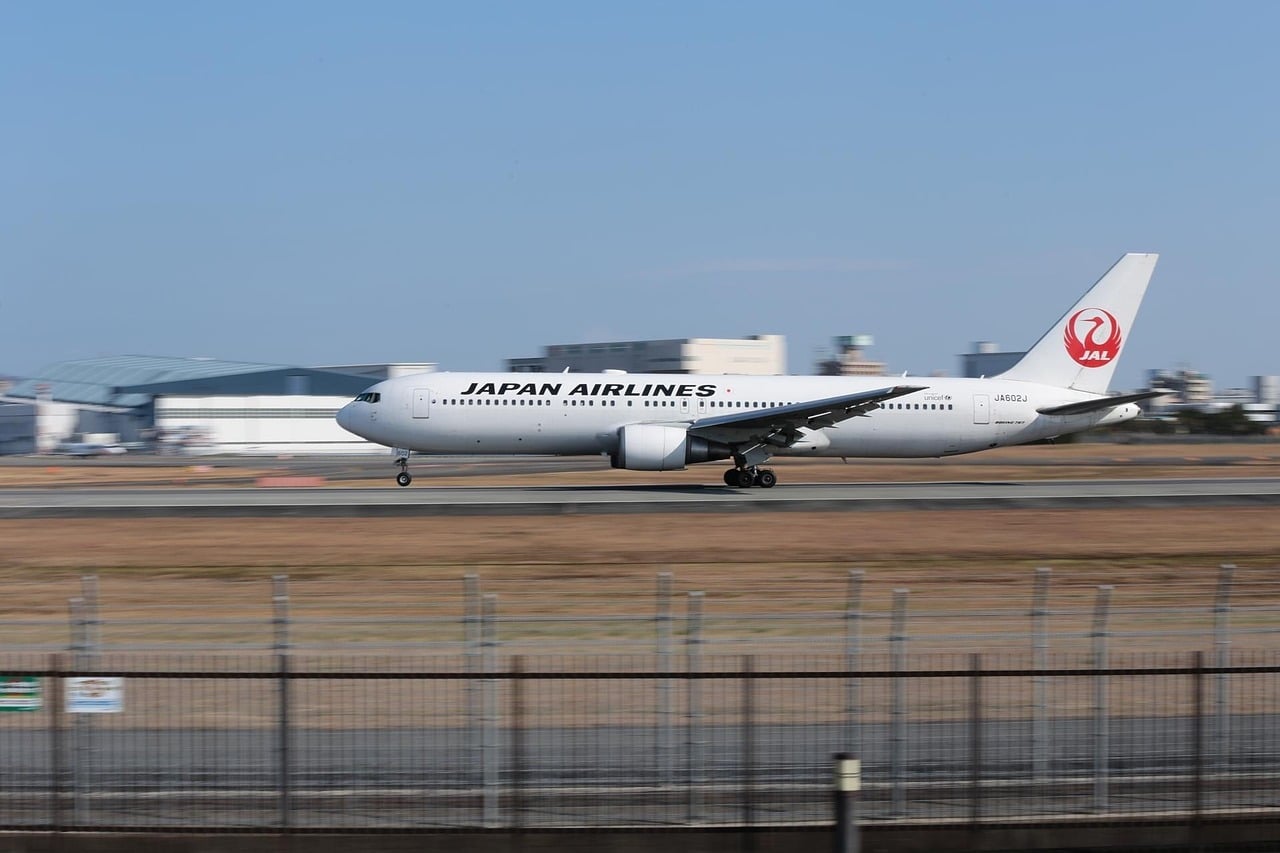
Japanese airports aren’t just places to land: they’re an entire cultural showcase on their own. For example, at the Narita Airport , you’ll see pet hotels , gacha machines , the (in)famous smart toilets and even a Pokémon Store !
22. Welcome, please come in — yokoso, o-hairi kudasai
23. please show your ticket — chiketto o misete kudasai, 24. please show your passport — pasupooto o misete kudasai, 25. what is your reservation name — yoyaku-mei wa nan desu ka, 26. the flight is delayed — furaito chien shiteimasu, 27. the flight has been canceled — furaito kyanseru saremashita, 28. baggage claim is this way — baggeji kureimu wa kochira desu, 29. we have arrived at … airport — … kuko ni tochaku shimashita, 30. we will depart for … airport — … kuko e shuppatsu shimasu, 31. there is a delay in the flight — furaito ni okure ga arimasu, 32. there are restrictions on carry-on baggage — kinai mochikomi no nimotsu niwa seigen ga arimasu.
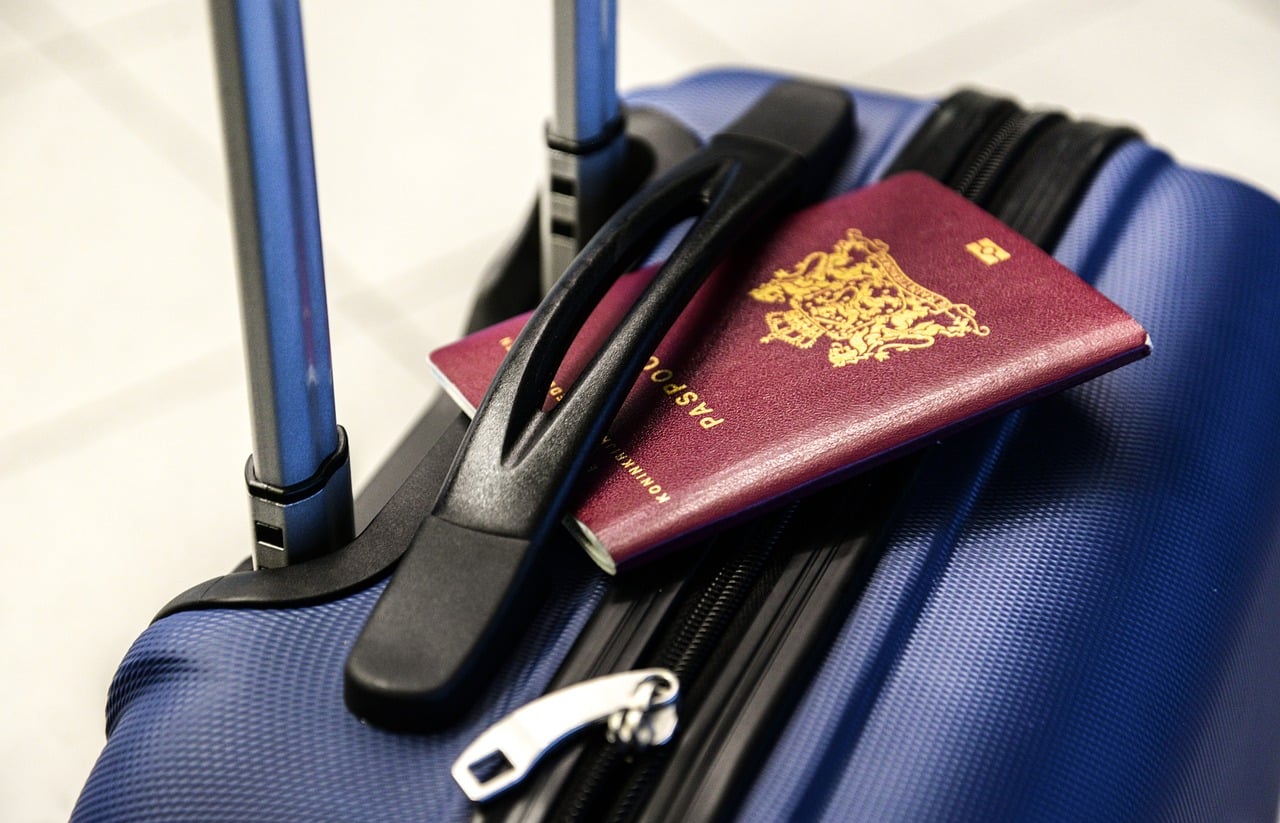
33. Please tell me how to get to the airport — kuko e no ikikata o oshiete kudasai
34. is this a departure flight — korewa shuppatsu-bin desu ka, 35. is this an arrival flight — korewa tochaku-bin desu ka, 36. where is the boarding gate — tojyo-guchi wa doko desu ka, 37. i’ll check my baggage — tenimotsu azukemasu, 38. please call a taxi — takushii o yonde kudasai, 39. i’d like to rent a car — rentakaa o karitai desu, 40. where is the gate for the connecting flight — noritsugi-bin no geeto wa doko desu ka.

Asking for directions is sort of daunting, especially when the person answers in a whole stream of fast-paced Japanese.
But you’ll find that Japan is one of the best places to be a lost and hopeless tourist. There’s always someone nearby who’s more than happy to help. I’ve even had people take time out of their days to walk me where I needed to go!
Simply say wherever it is that you want to go followed by どこですか? — doko desu ka? (Where is …?).
41. I want to go… (here) — (koko) ni ikitai desu
Say ここ if you have an address written down or a point marked on a map of where you want to go.
If you know the name or address of the place where you want to go, simply say the place name followed by に行きたいです . For example, if you want to go to Shinjuku station, you simply say 新宿駅に行きたいです — Shinjuku eki ni ikitai desu . (I want to go to Shinjuku station.)
42. Where is the…? — …wa doko desu ka?
43. can you please show me where we are on the map — watashitachi ga doko ni iru no ka, chizu de oshiete kudasai.
This might seem like an odd question (and a bit of a mouthful), but it can be a lot more helpful than asking for directions from someone who doesn’t know English.
44. Is it near? — chikai desu ka?
45. is it far — tooi desu ka.

46. Go straight ahead — massugu itte kudasai
47. turn left — hidari ni magatte kudasai, 48. turn right — migi ni magatte kudasai.

In Japan, public transportation is how most people get around. If you’re not used to taking the bus, train or anything similar, better keep the following phrases handy!
49. Take me to this address, please — kono jyusho made tsureteitte kudasai
50. what is the fare — ryoukin wa ikura desu ka, 51. stop here, please — koko de tomatte kudasai, 52. does this bus go to (street name) — kono basu wa … ni ikimasu ka, 53. does that train stop at … — sono denshya wa … de tomarimasu ka, 54. a map, please — chizu o onegai shimasu, 55. this hotel — k ono hoteru, 56. the subway — chikatetsu , 57. the train station — denshya no eki, 58. the bus stop — basutei, 59. the taxi stand — takushii noriba, 60. the exit — deguchi, 61. the entrance — iriguchi, 62. the bathroom — toire.

Like other service-oriented businesses in the country, Japanese hotels subscribe to the concept of omotenashi , which roughly translates to pouring your whole heart into service. That means you can expect employees at Japanese hotels to go above and beyond when it comes to making you feel welcome.
63. I have a reservation under the name of … — … no yoyaku o shiteimasu
64. i would like to check-in — chekkuin shitai desu, 65. what time is check-in — chekkuin wa nanji desu ka, 66. is breakfast included — choshoku wa fukumareteimasu ka, 67. where is my room — watashi no heya wa doko desu ka, 68. please give me a wake-up call at … — … ni weikuappu kooru onegaishimasu., 69. where is the nearest convenience store — ichiban chikai konbini wa doko desu ka, 70. can you recommend a good restaurant nearby — chikaku no oishii resutoran o shokaishite moraemasu ka, 71. what time is check-out — chekkuauto no jikan wa nanji desu ka, 72. where can i store my luggage — nimotsu wa dokoni azukeraremasu ka, 73. is there wi-fi in the hotel — hoteru ni wa wai-fai ga arimasu ka, 74. where is the nearest atm — ichi-ban chikai atm wa doko desu ka, 75. i’d like to have some extra towels, please — yobun no taoru o kudasai., 76. what time is breakfast served — choshoku wa nanji kara desu ka, 77. excuse me, i need an iron and ironing board — sumimasen, airon to iron-dai ga hitsuyo desu..
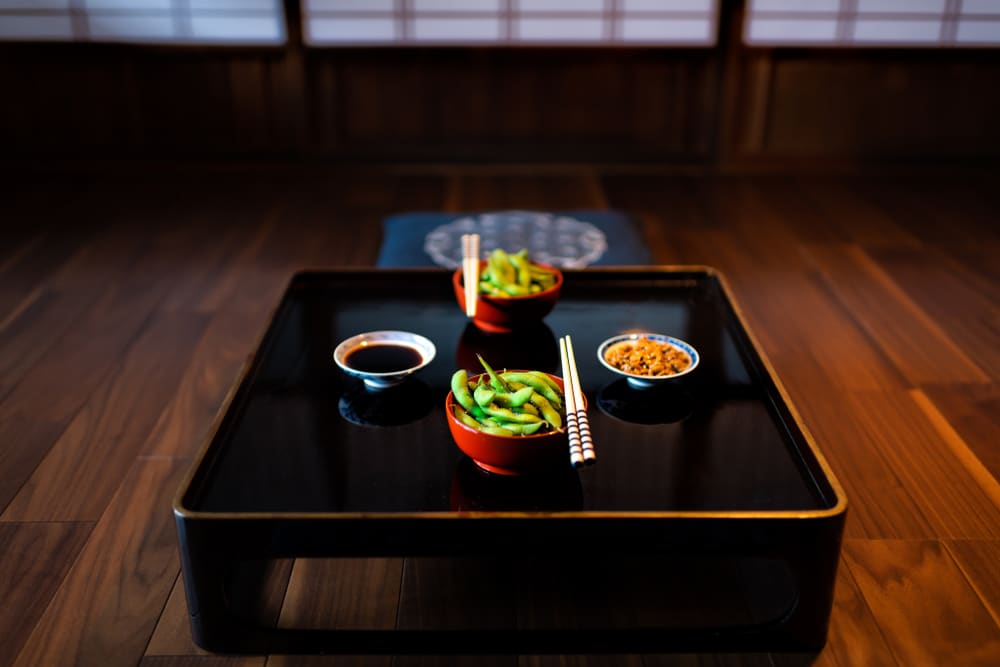
Like Japanese hotels, Japanese restaurants also practice omotenashi. Here are some of the more common phrases you’ll hear from Japanese restaurant staff.
78. Welcome — Irasshaimase
79. how many people in your party — nan mei sama desu ka, 80. this way, please — kochira e douzo, 81. certainly (in response to your order) — kashikomarimashita, 82. thank you for waiting — omatase itashimashita.

The best restaurants in Japan are the authentic ones that don’t cater to tourists. But these are also the places that have no English menus, and sometimes no English-speaking waitstaff.
Luckily, it’s very common for Japanese menus to feature photos of all the dishes. And many places have models of their dishes on display, so you likely won’t be going in completely blind.
Use these phrases , and you should be in and out of a restaurant without too many hiccups.
83. A table for two, please — futari you no teeburu o onegai shimasu
You can also replace futari with the number of people who you need to have seated:
- one — hitori ( 一人 )
- three — sannin ( 三人 )
- four — yonin ( 四人 )
If you’re confused about Japanese numbers and counters, don’t despair. You can just do as the locals do and indicate the number of diners by holding up your fingers.
84. The menu, please — menyu o onegai shimasu
85. what are today’s recommendations — kyo no osusume wa.
If everything on the menu looks appetizing and you’re not quite sure what to order, use this phrase.
86. Water, please — mizu o onegai shimasu
87. two beers, please — biiru o nihai onegai shimasu, 88. can i please have (one, two) of this — kore o (hitotsu, futatsu) onegai でdekimasu, 89. do you have a vegetarian dish — bejitarian youno ryouri ga arimasu ka.
I’ve traveled in Japan with vegetarians twice, and this question usually draws quite strange looks. Vegetarianism basically doesn’t exist in Japan, although Japanese cuisine is generally quite vegetarian-friendly.
It might work better to say これは肉ですか? — kore wa niku desu ka? , to say “is this meat?” Follow up with 私は肉を食べません — watashi wa niku o tabemasen, which means “I don’t eat meat,” if you want to make yourself understood.
90. Is … in it? — … wa haitte imasu ka?
Alternatively, you can also ask if specific ingredients are included in your food, so you’ll know whether you should order it or not.
91. That’s okay — daijyoubu desu
You can also use this expression to ask someone if they’re okay. Just add the question particle ka to the end: 大丈夫ですか ? — daijyoubu desu ka?
92. The check, please — okanjyou o onegai shimasu
Say the above, or you can do as the locals do and catch the waiter’s eye (with a smile!) and draw a clockwise circle in the air with your index finger pointing towards the roof.
In some restaurants, you need to bring the check to the cash register which is usually located by the restaurant’s doorway.
93. Cheers! — kanpai!
94. it was delicious — oishikatta desu, 95. water — mizu, 96. wine — wain, 97. beer — biiru , 98. tea — ochya, 99. coffee — coohii, 100. juice — juusu, 101. meat — niku, 102. chicken — toriniku , 103. pork — butaniku, 104. beef — gyuniku , 105. fish — sakana , 106. rice — gohan, 107. bread — pan , 108. vegetables — yasai , 109. fruit — kudamono.
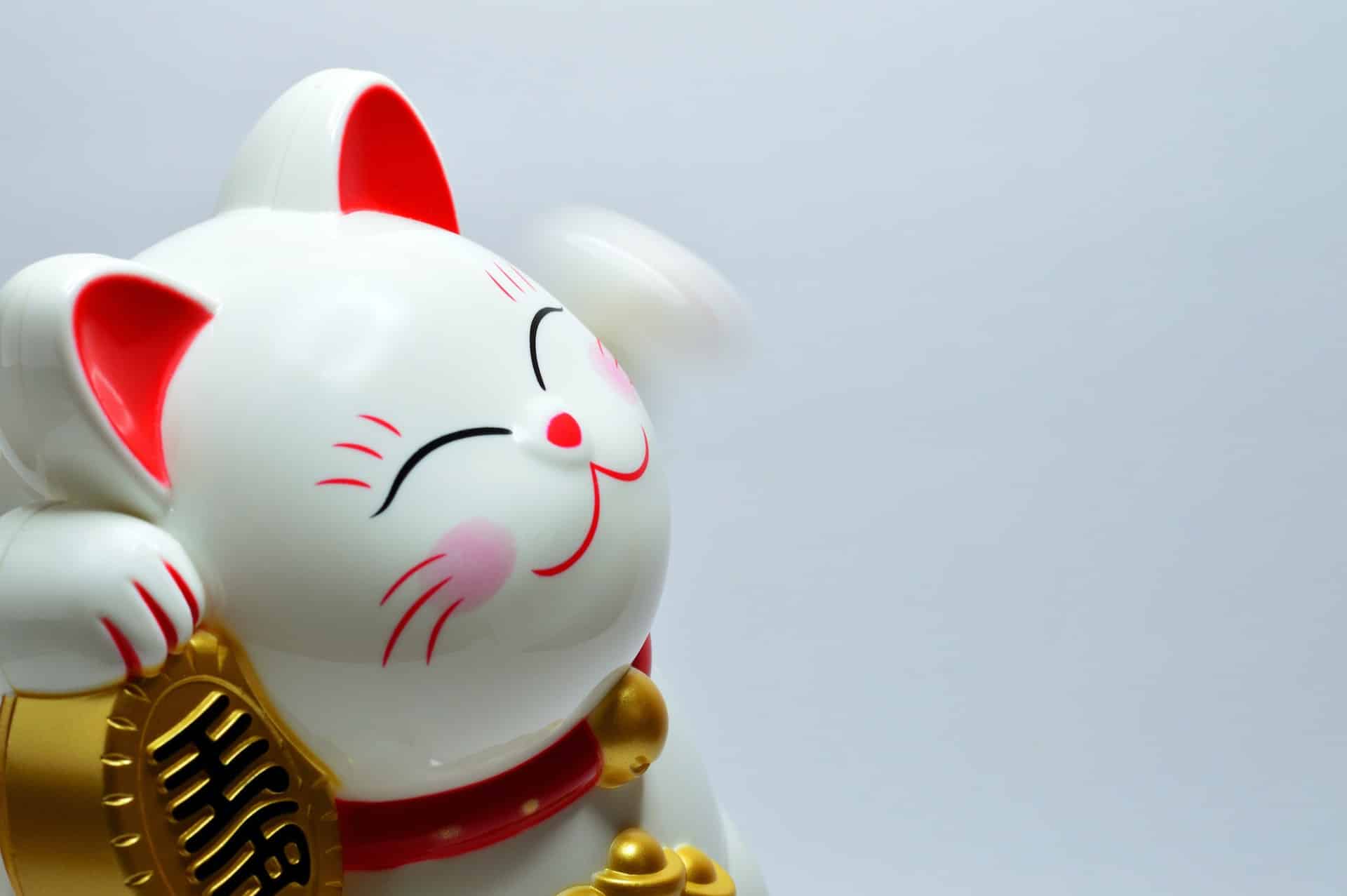
When you’re met with cries of いらっしゃいませ!, you’re not really expected to respond to this greeting. As for me, I just smile and say こんにちは which means, of course, “hello.”
Walking into a department store is particularly surreal, with each assistant taking cues from the others, so that every time a customer walks in, いらっしゃいませ bounces around the entire floor.
110. Are you looking for something? — nani ka osagashi desu ka?
111. is that all — ijyou de yoroshii desu ka, 112. here it is / here you go — hai, douzo.

113. I would like this — kore o onegai shimasu
114. i would like one of those — sore o hitotsu onegai shimasu, 115. i would like to pay in cash — genkin de onegai shimasu, 116. i would like to pay by credit card — kurejitto kaado de onegai shimasu.
The only real challenge with ordering meals in Japanese is the use of counters.
We have counters in English, too (for example “sheets” of paper, “glasses” of water, “blades” of grass), but not as many or as complicated as in Japanese.
Luckily Japanese has a “universal” counter, つ ( tsu ), which you can use for anything, including food.
The numbers one to four as つ counters are pronounced 一つ ( hitotsu )、 二つ ( futatsu )、 三つ ( mittsu ) and 四つ ( yottsu ). You can use this counter for drinks too, and the waiter will understand you.
However, if you want to be a little more impressive, you can use the drinks counter: 杯 ( hai/bai/pai depending on the number used with it). The numbers one to four using this counter are 一杯 ( ippai )、 二杯 ( nihai ) 、 三杯 ( sanbai ) and 四杯 ( yonhai ).
If you want to learn more about counters, this post explains them in more detail.
All the examples I’ve given are in the polite, neutral form of speech . You basically can’t go wrong speaking this way in Japan, so you don’t need to worry about making any social faux pas!
Some notes on pronunciation:
- Avoid turning vowels into dipthongs (vowel sounds that run into each other, like the oi in “coin”). Pronounce each vowel on its own even when there are two vowels next to each other. Onegai is read as “o-ne-ga-i,” not “o-ne-gai”
- The sound ou and repeated vowels like ii and ee are exceptions: they show an elongation of the sound. Ohayou is read as “o-ha-yoh,” not “o-ha-yo-u.”
- Treat ん (n) as its own syllable. Konnichiwa is read “ko-n-ni-chi-wa,” not “ko-ni-chi-wa.” It’s subtle, but it makes a difference!
- Repeated consonants are pronounced. For an example of how to do this, just read the word “bookkeeper” out loud.
- The small kana っ like in いって signify a break between the sounds —”it-te,” not “i-te.”
- Small y- kana like ゃ in おちゃ add the y sound to the preceding syllable —”o-chya,” not “o-chi-a.”
- は (ha) as a particle is pronounced wa, and を (wo) as a particle is pronounced o.
The beauty of Japanese is that it’s an extremely phonetic language, so if you say the words exactly as you read them, you can’t really get them wrong.
Having said that, people will probably struggle to understand you if you speak in a strong non-Japanese accent, so it might pay to listen to some spoken Japanese before you start practicing pronunciation.
The most important thing to remember is that, unlike English speakers, Japanese speakers don’t put emphasis on the second or third syllable of a word—there’s some emphasis on the first syllable, but it’s subtle.
Some ways that you can listen to Japanese being spoken is by watching Japanese films , television programs , anime or YouTube clips .
The Japanese language program FluentU has a little bit of everything in the media, with interactive subtitles and customizable flashcards for a well-rounded learning experience.
Maybe this seems like a lot, but learning Japanese travel phrases for tourists will make your trip run more smoothly, and the people you meet will appreciate your effort.
Speaking the local language tends to get people on your side. They’re less likely to try to rip you off, and often will want to become your best friend.
I like to make little phrasebooks for myself when I travel, so I can have these Japanese travel phrases and vocabulary always on hand.
I’ve been treated to tea and dinner in people’s homes, and once was driven around a city with a personal guide/impromptu friend all day, just because I struck up conversations in the local language.
Don’t be scared! Give it a try!
Enter your e-mail address to get your free PDF!
We hate SPAM and promise to keep your email address safe

Boutique Japan
20 Essential Japanese Phrases for Travelers to Japan
If you’re visiting Japan and a little worried about the language barrier (or you simply love languages), we’ve got you covered with these essential Japanese phrases for travelers.
In our guide to what we believe are the most important Japanese phrases for travel, we’ll introduce you to a selection of key words and phrases — and explain why the Japanese language barrier is not as worrisome as you might think.
The truth is, you do not need to speak any Japanese to have a successful, wonderful trip to Japan (and if you’re looking for travel inspiration, check out our favorite destinations in Japan ). However, learning a few key Japanese phrases can make your trip just that much better. So let’s get into it!
Download our Free Japanese Phrasebook:
Originally written in 2014, this post was updated and republished on November 1, 2019.
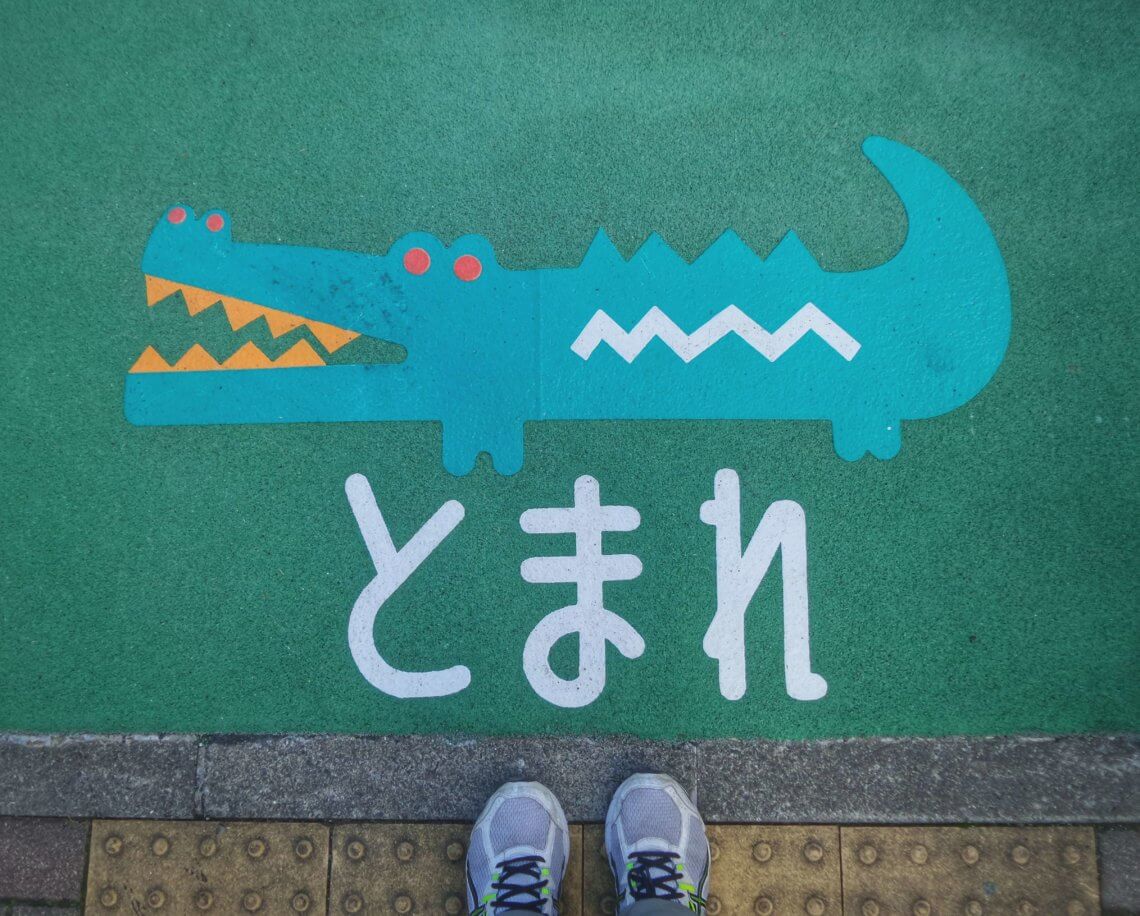
The Most Essential Japanese Words & Phrases for Your Trip to Japan
Learning Japanese can seem daunting, but don’t worry. You don’t need to learn any of these words or phrases to have a great time (see why we love Japan ).
However, as any seasoned traveler knows, making a little linguistic effort can go a long way, and it can be helpful to learn even a little of the local language for your travels. We’ve narrowed it down to a small selection of key words and phrases, divided by category:
- The Basics: Key Japanese Words and Phrases
- Food and Drink: Eating Your Way Around Japan
- Now or Later: Time-Related Phrases in Japanese
- Getting Around Japan: Transportation-Related Phrases
Here is a quick look at the words and phrase you’ll find below:
Top 20 Essential Japanese Travel Phrases:
- Konnichiwa (こんにちは) – Hello
- Arigatou Gozaimasu (ありがとうございます) – Thank you
- Sumimasen (すみません) – Excuse me
- __ o Kudasai (__をください) – I would like __, please
- __ wa Doko Desu ka? (__はどこですか) – Where is __?
- Itadakimasu (いただきます) – An expression of gratitude for the meal you’re about to eat
- Omakase de (お任せで) – Used to order chef’s recommendation (often for sushi)
- O-sake (お酒) – General term for alcohol
- Nihonshu (日本酒) – Japanese sake
- Kinen Seki (禁煙席) – Non-smoking seat
- Ima Nanji Desu ka? (今何時ですか) – What time is it now?
- Nanji ni? (何時に?) – At what time?
- Asa (朝) – Morning
- Kyou (今日) – Today
- Ashita (明日) – Tomorrow
- __ ni Ikitai (__に行きたい) – I want to go to __
- Tomete Kudasai (止めてください) – Stop, please
- Kippu (切符) – Ticket
- Shinkansen (新幹線) – Bullet train
- Dono Densha? (どの電車?) – Which train?
If you’re concerned about memorizing all this Japanese, or want to learn even more words and phrases, download Boutique Japan’s Tiny Phrasebook for free.
And for an introduction to how to say these words and phrases, see our bonus video to help you practice your Japanese pronunciation .
Basic Japanese Words and Phrases
Let’s start with a few of the most basic-yet-essential Japanese words and phrases. Even if you only remember how to say hello or thank you , you’ll find that Japanese people will be appreciative of your efforts!
1. Konnichiwa (こんにちは) – Hello
Let’s start with one you’ve probably heard before: the word for hello is konnichiwa .
Konnichiwa is typically used during the day, and there are other phrases for good morning and good evening ( ohayou gozaimasu , and konbanwa , respectively). But when you’re starting out it’s best to keep things simple, and if you simply learn konnichiwa you can use it throughout the day to say hello !
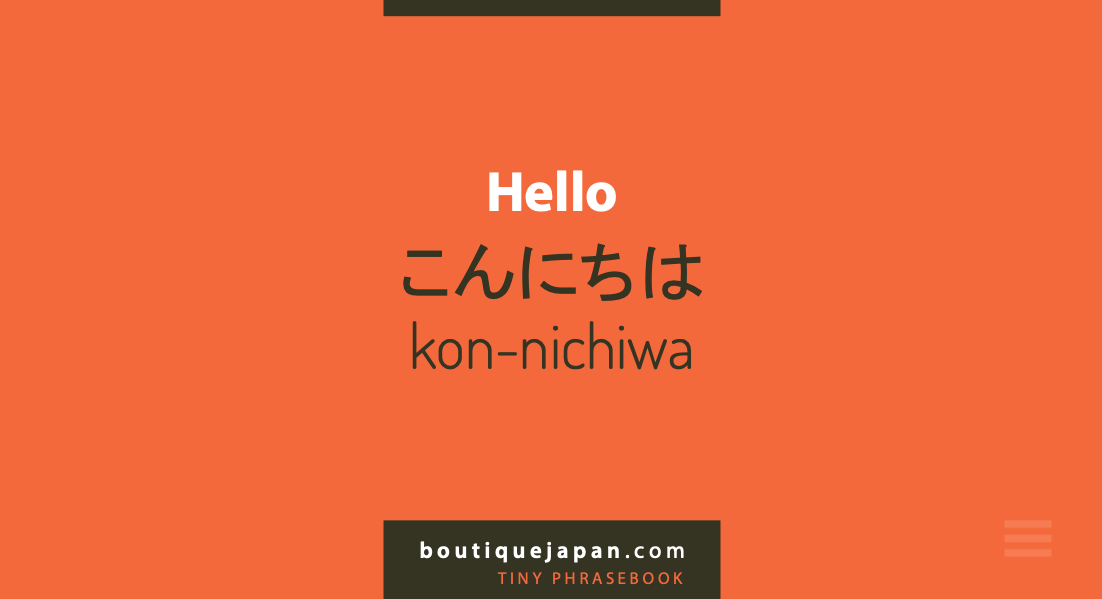
2. Arigatou Gozaimasu (ありがとうございます) – Thank you
In Japan, etiquette is no joke, and chances are you’ll be saying thank you a lot (learn more in our guide to Japanese etiquette ).
The word for thank you in Japanese is arigatou gozaimasu (in Japanese, the u at the end of some words is barely pronounced to the point of being nearly silent). You can usually simply say arigatou , which is a little more casual but usually perfectly fine. In Japan, where politeness is such a key part of the culture, you’ll be saying arigatou gozaimasu a lot!
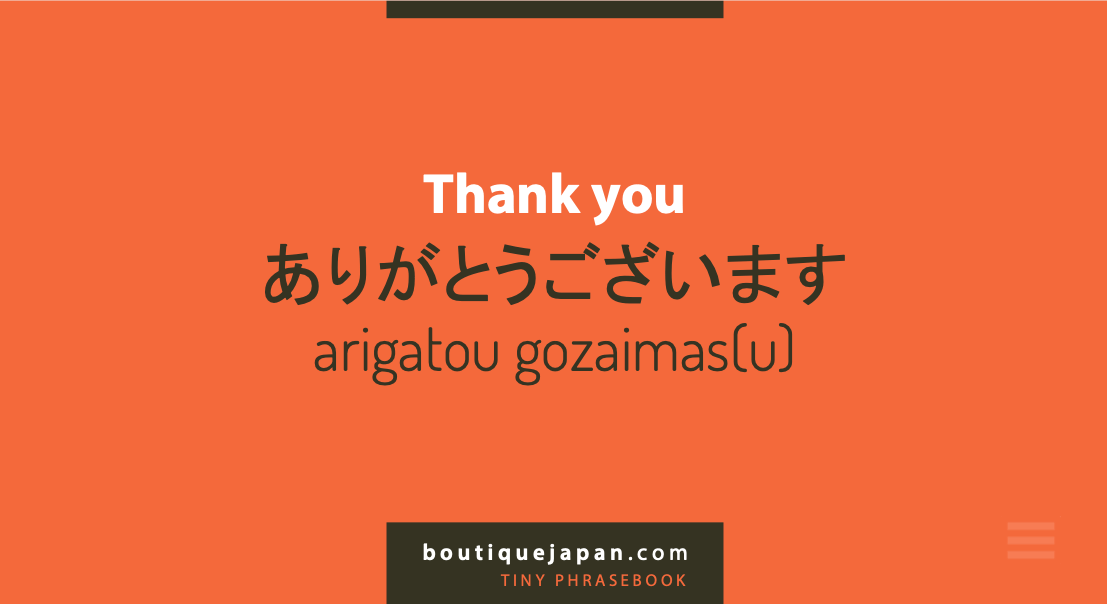
3. Sumimasen (すみません) – Excuse me
Excuse me is an important expression in any language, and Japanese is no exception.
The word for excuse me in Japanese is sumimasen . Chances are you’ll also be using this one quite a bit, so if you can try and memorize it! It’s a doubly useful word, as it can be used both to get a person’s attention, and also to apologize.
For example, use sumimasen at an izakaya (a Japanese-style gastropub) to get a waiter’s attention. At izakaya , it’s often called out as sumimaseeeeee~n ! On the other hand, if you accidentally walk onto a tatami floor with your shoes on (something you’re likely to do at some point) you can use sumimasen to say I’m sorry .
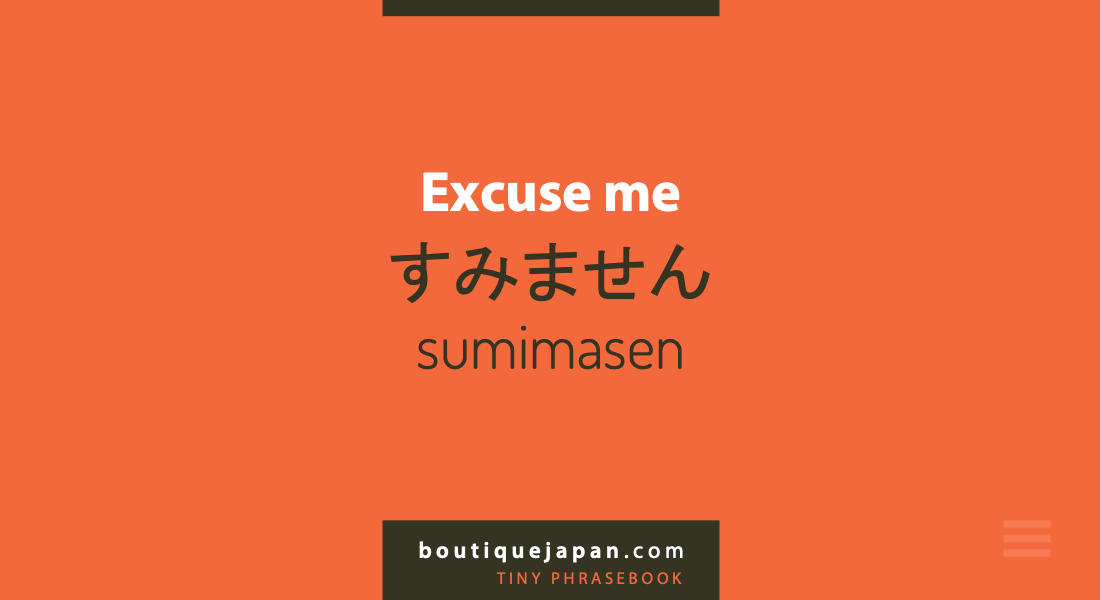
4. __ o Kudasai ( をください) – I would like , please
Now that we’ve covered three basic essentials, we can move onto two key sentences that will hopefully help you a lot.
First is I would like __, please . This is useful in a variety of situations: at restaurants, in stores, and on many other occasions you’ll encounter while traveling. In Japanese, it’s __ o kudasai (simply fill in the __ [blank] with the item of your choice).
To get the most out of this phrase, you may want to learn a few vocabulary words, such as water (mizu), beer (biiru) , sake , and others you think you may need.
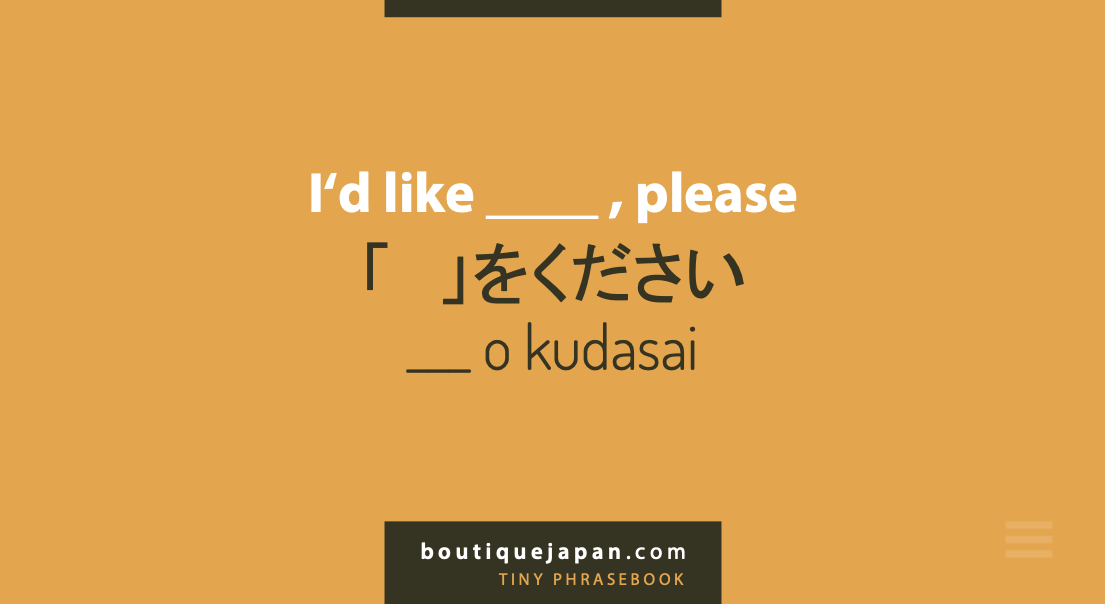
5. __ wa Doko Desu ka? ( はどこですか) – Where is __?
Last but not least, we think it’s quite useful to be able to ask Where is the __? This is useful even if you can’t understand the answer, because once you ask, people will be able to point you in the right direction, or even help you get to where you’re going!
In Japanese, it’s __ wa doko desu ka? (simply fill in the __ [blank] with the place you’re trying to reach, such as the Ghibli Museum ). One key vocabulary word that often goes along with this phrase for travelers is eki , which means station (for example, Shinjuku eki is Shinjuku station ).
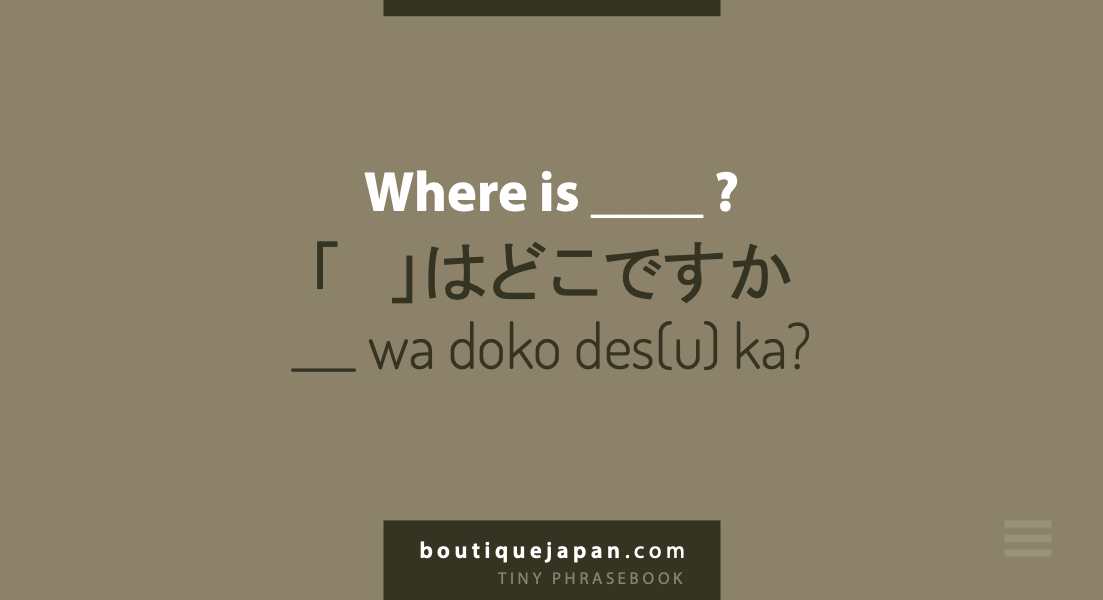
Eating Your Way Around Japan: Food and Drink Phrases
For many travelers, Japanese food is a top priority! From classic Tokyo sushi restaurants to the legendary food culture of Okinawa , there’s a lot to take in. For alcohol afficionados, Japan also offers sake , Japanese whisky , shochu , and other traditional beverages.
While you don’t need to speak any Japanese to enjoy eating and drinking in Japan, these key words and phrases will help you make the most of your culinary experiences.
6. Itadakimasu (いただきます) – An expression of gratitude for the meal you’re about to eat
Certainly not required, but if you say itadakimasu before you begin eating, whether in a restaurant or at a person’s home, they will surely be impressed with your manners.
Essentially, this phrase expresses humility and thanks for the meal you are about to enjoy. The website Tofugu does a very nice job of explaining the meaning of itadakimasu .

7. Omakase de (お任せで) – Used to order chef’s recommendation (often for sushi)
If you’re a passionate sushi enthusiast, you probably already know the meaning of omakase .
When you tell a chef omakase de , you’re letting them know that you’re placing the meal in their hands. Especially for travelers with adventurous palates, this is the best way to experience a meal at a Tokyo sushi shop , for example.
However, the phrase is not only used at sushi restaurants, and can often be used at other types of establishments as well.

8. O-sake (お酒) – General term for alcohol
Technically osake , this word has tripped many a non-Japanese speaker up! While in English the word sake means, well, sake , in Japanese the word sake — more politely, osake — refers to alcoholic beverages in general.
( Sake and osake are virtually interchangeable; the “o” is what is known as an honorific prefix, but unless you’re studying Japanese in more depth, you really don’t need to worry about this!)
So if you’re looking for sake (which in Japanese is called nihonshu) , it’s best to ask for nihonshu (see below). If you’re simply looking for an adult beverage (such as nihonshu , shochu , or Japanese whisky ), the catchall term sake will do the trick.

9. Nihonshu (日本酒) – Japanese sake
See above for the distinction between sake and nihonshu !
10. Kinen Seki (禁煙席) – Non-smoking seat
Encountering cigarette smoke is somewhat of an unavoidable aspect of traveling around Japan. This being said, most of our travelers are quite averse to smoke, and fortunately it’s possible to travel around Japan without smoke becoming too much of a nuisance.
In some places, such as restaurants, you may have a choice between the smoking and non-smoking sections. Kinen means non-smoking, and seki means seat : put them together and you’ve just conveyed that you’d like to be seated in the non-smoking area!

Time-Related Phrases in Japanese
Time-related phrases can be extremely helpful in certain travel situations, and below you’ll find a few of the most practical Japanese words and phrases on this topic.
11. Ima Nanji Desu ka? (今何時ですか) – What time is it now?
Chances are you’ll have a watch or cell phone on you, but once in a while you may need to ask a stranger for the time.
The basic phrase is simply nanji desu ka? which means, What time is it? People also commonly say ima nanji desu ka? which simply means, What time is it now? ( Ima means now.)

12. Nanji ni? (何時に?) – At what time?
This is a particularly useful phrase while traveling. It can be helpful when purchasing rail tickets (see more on getting around Japan below), making meal reservations, or arranging tickets to events.
Sure, you could just ask nanji? ( what time? ) and hope your point gets across, but by adding the preposition ni you can be assured of much more clarity!
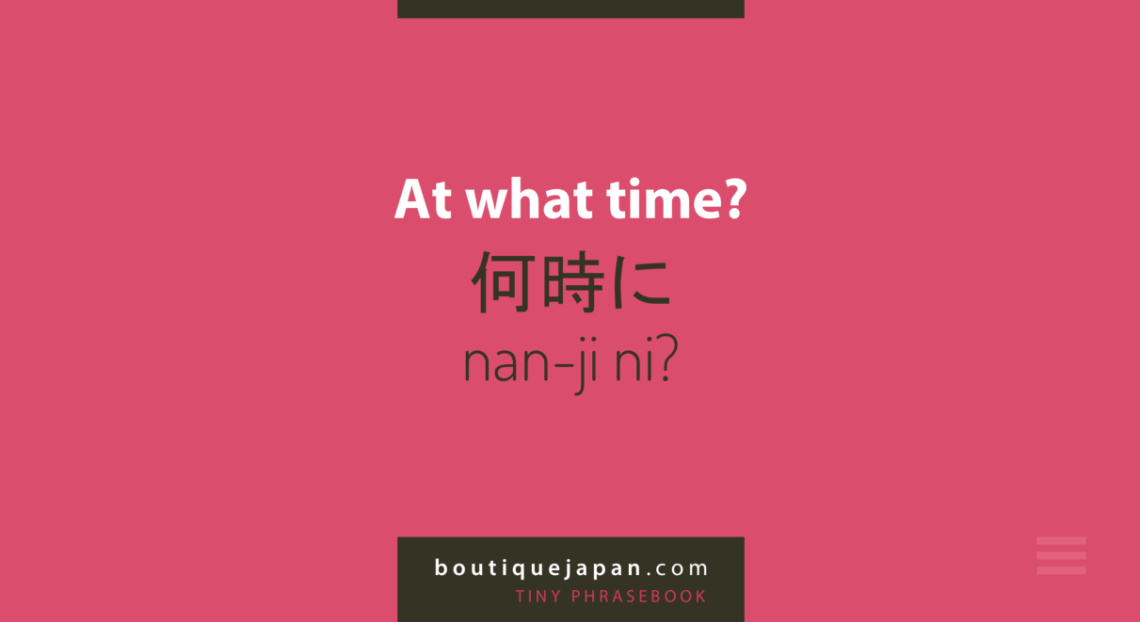
13. Asa (朝) – Morning
This one is fairly self-explanatory: asa means morning . While it’s no surprise that a food-loving culture like Japan has multiple words for breakfast , one of the most common is asagohan ( gohan literally means rice , but is more generally used to mean food ).

14. Kyou (今日) – Today
Words like today and tomorrow can be particularly useful when buying train tickets, for example. For more on transport, see the transport-related phrases below.

15. Ashita (明日) – Tomorrow
When pronouncing the word for tomorrow, ashita , the i is virtually silent, so it ends up sounding more like ashta . If you need to express the day after tomorrow, the word is asatte .

Getting Around Japan: Transportation-Related Phrases for Travelers to Japan
For some travelers, one of the biggest concerns about not speaking the language is the prospect of getting around the country, navigating the trains, and trying to avoid getting lost.
Fortunately, Japan has an incredibly efficient and easy-to-use rail network, and you can read all about it in our guide to train travel and getting around Japan . And here are some key Japanese words and phrases to help you on your way.
16. __ ni Ikitai ( に行きたい) – I want to go to __
On its own, ikitai means, I want to go .
To express that you’d like to go somewhere, use the phrase __ ni ikitai (simply fill in the __ [blank] with the place you’re trying to reach). For example, Kyoto ni ikitai means, I want to go to Kyoto .

17. Tomete Kudasai (止めてください) – Stop, please
Tomete means stop , and is particularly useful in taxis. The kudasai here means please , and makes the phrase much more polite ( tomete on its own would come off as quite brusque).

18. Kippu (切符) – Ticket
Kippu means ticket (as in train tickets). As you can easily imagine, when purchasing rail tickets it can be very useful to be able to tell the ticket agent that you’d like a ticket to a certain place!
Made means until or to (in this case, to your destination). For example, Osaka made means to Osaka . Thus, Osaka made no kippu means ticket to Osaka . Put it all together with kudasai (for politeness) and you have Osaka made no kippu o kudasai .

19. Shinkansen (新幹線) – Bullet train
Ah, the shinkansen . One of the utter joys of traveling around Japan is the world-famous shinkansen (bullet train).
Whether you have the well-known Japan Rail Pass or not, if you’re doing any domestic travel within Japan, chances are you’ll end up on the incredible (and incredibly pleasant) shinkansen for at least one if not more of your journeys. Enjoy, and grab a bento and some nihonshu (see above) for the ride!

20. Dono Densha? (どの電車?) – Which train?
Wondering which train you need? Imagine you’re in Kyoto Station, headed for Tokyo. You’re on your shinkansen’s departure platform, but you see two trains.
You show your ticket to a friendly Japanese person, and ask, dono densha? They take a look at your ticket and the two trains, and point you to the right one. And you’re on your way – happy travels!

Download our Free Japanese Phrasebook PDF
For those of you who want to learn even more Japanese for travel, we’ve created the Boutique Japan Tiny Phrasebook.
Our Tiny Phrasebook features carefully selected Japanese words and phrases designed to help you get the most out of your trip to Japan. You’ll find all of the words and phrases featured above, and many more!
The phrasebook is a beautifully designed PDF (it may take a few moments to load depending on your internet speed).
Simply save it to your smartphone, tablet, or computer. We suggest using an app like iBooks (or another PDF reader) so you can search for words and navigate easily.
Bonus Video: Practice your Japanese Pronunciation
One of the best things about Japanese is that it’s surprisingly easy to pronounce. Unlike several other languages throughout Asia, Japanese is not a tonal language.
In the video below, we go over basic pronunciation for some of the most useful Japanese words and phrases for your trip to Japan.
Do you need to speak any Japanese to travel around Japan ?
Absolutely not. You can travel to Japan without learning any of these words and have a great time.
People ask us about the Japanese language barrier all the time, with common questions such as, Do Japanese people speak English? How much (or how little)? The language barrier is a common myth that shouldn’t get in your way. Most of our travelers don’t speak a single word of Japanese, yet come back with testimonials of how much they love Japan .
The truth is that most Japanese people speak at least a little bit of English. These days, all Japanese students study English for a minimum of six years in secondary school, and many students — as well as adults — also take English-language classes after school or on weekends.
English-language fluency is not widespread, so most people you meet probably won’t be fluent in English, but almost everyone you meet will know at least a few English words – and many will know anywhere from hundreds to thousands.
Sometimes you may find that the people you meet are hesitant to try their English on you, but you’ll likely find that you can communicate in basic English in a huge variety of situations while traveling around Japan.
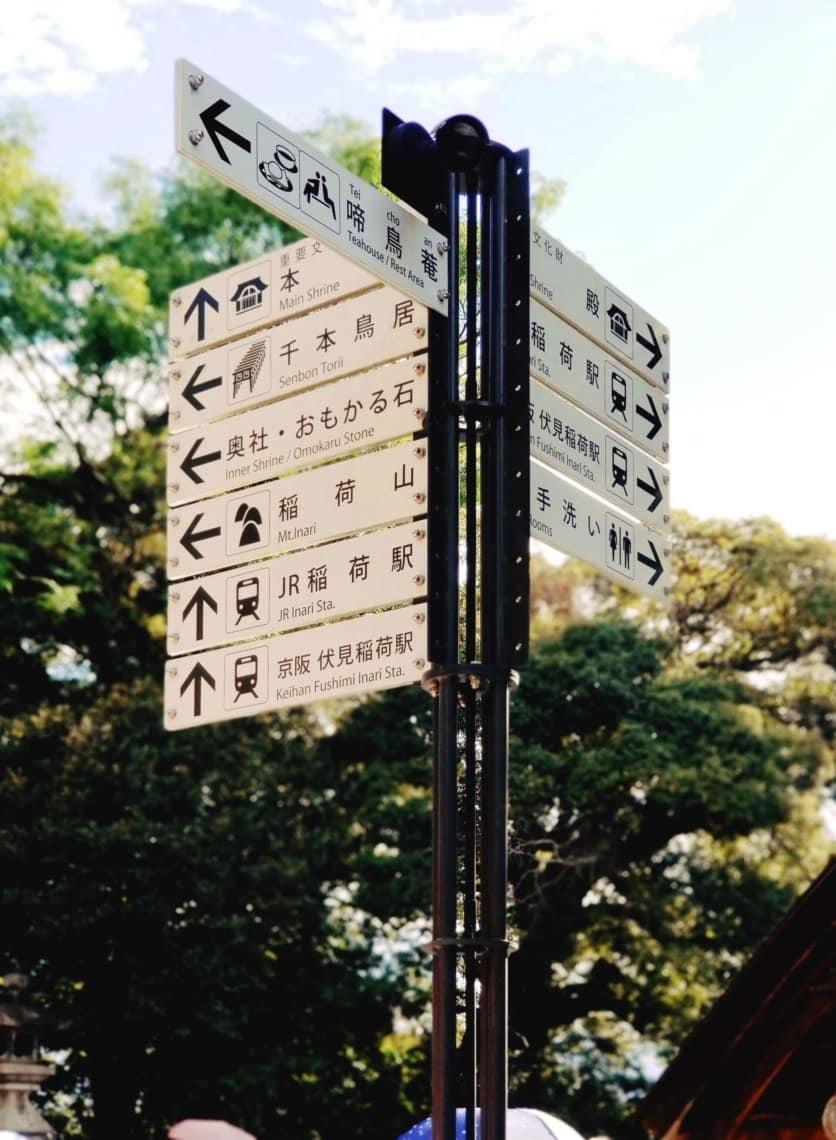
The Japanese Written Language
You may also be worried about the written language. The good news is that you don’t need to be able to read or write Japanese to enjoy Japan.
Japanese people don’t expect you to be able to read the Japanese language, and you’ll find English-language signage throughout the country. This is especially true in places frequented by travelers, such as sightseeing spots, shopping areas, train stations, airports, and often even on the street.
As for at restaurants, though it’s not always the case, in some cases you will find English-language menus. When English-language menus are not available, photos are often included to make pointing and ordering possible.
Despite Japan’s travel-friendliness, every visitor to Japan at some point finds him or herself in a situation in which linguistic communication is simply not possible, and sign language and gesturing are required.
Getting lost in a foreign country where you don’t speak the language is a fear of many would-be travelers, but if you had to pick a country in which to get lost, you couldn’t do much better than Japan! Japan is by far one of the safest countries in the world, with crime rates that are astonishingly low compared to places like the US and most of Europe. And Japanese people will often go to surprising lengths to help tourists.
Back when I first moved to Japan I spoke very little Japanese, and on my first visit to Kyoto I accidentally took the wrong train and ended up wandering around a neighborhood with no idea how to get where I wanted to go. Luckily, an older gentleman with his wife spotted me looking confused and came up to me with perhaps one of the only English phrases he knew: “ Are you lost? ” I said yes and showed him the name of the place I wanted to go.
If he had simply pointed me in the right direction it would have been helpful, but instead he started walking me in the right direction. After a few minutes of walking his wife split off, presumably to go home, and we continued. After 15 minutes of walking he had dropped me off at exactly the spot I needed to be, and – as is typical in Japanese culture – expected nothing in return. I thanked him profusely and we had a good laugh despite our inability to communicate linguistically.
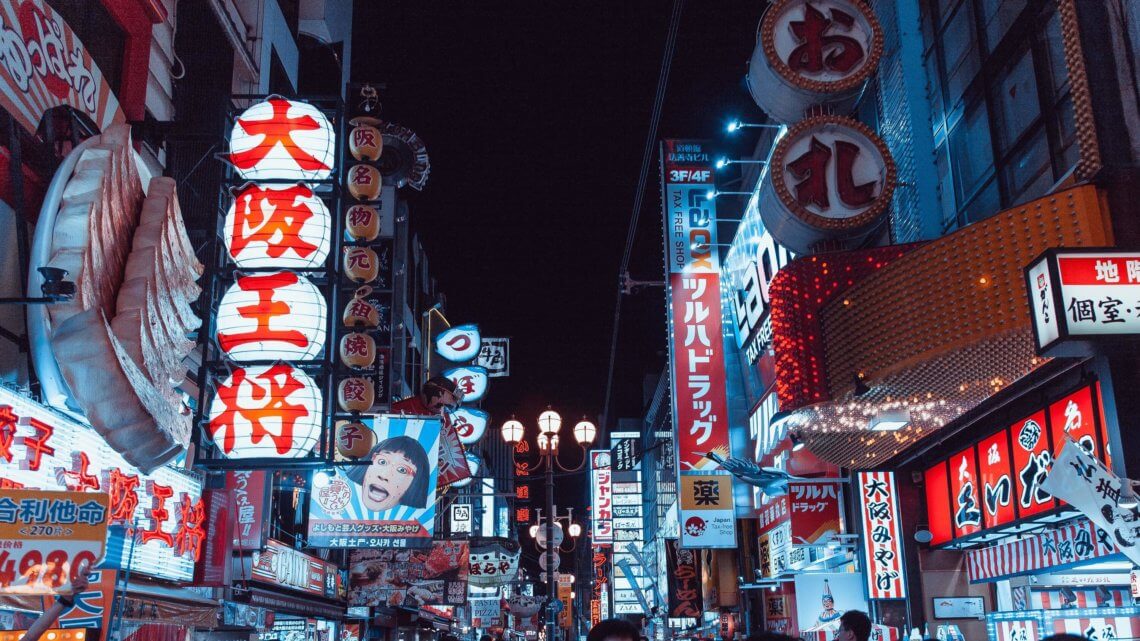
Why Learn Any Japanese if You Won’t Need it?
Almost everyone who has visited Japan has a similar story of a random act of kindness and generosity from a Japanese stranger (or a tale of a camera or passport left on a train being miraculously returned). So you can rest assured that even if you forget all of the words and phrases we’ve shown, you’ll be in good hands with the wonderful people of Japan.
But aside from the fact that it’s a rich and fascinating language, learning even just one or two Japanese words or phrases will help endear you to the Japanese people you meet during your trip, and enhance your overall travel experience.
Japanese people tend to be extremely appreciative of visitors who take the time to learn even just a word or phrase or two, and if you try then chances are you’ll be greeted with oohs and aahs of encouragement.
We hope you’ve found our guide to Japanese words and phrases for travelers helpful. Arigatou gozaimasu!
More Great Posts

Japan’s Best Boutique and Luxury Hotels & Ryokans
The best hotels and ryokans in Japan range from charming traditional inns in the countryside, to stylish design hotels and…

Traveler’s Guide to the JR Pass (Is It Worth It?)
The Japan Rail Pass (or JR Pass, for short) can be a good way to get around Japan, but many…
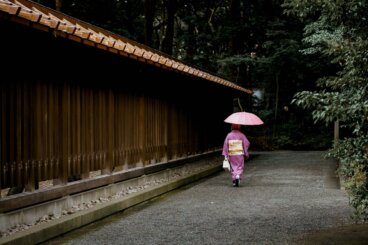
Major Holidays and Peak Travel Seasons in Japan
If you’re considering a trip to Japan during one of the country’s peak travel seasons, be aware that things can…
Plan Your Japan Trip
Learn more and contact us to discuss your unique trip.
Get Started
- The Process
- Testimonials
Join the journey: Click here to get our top tips for affordable travel!

Japanese Phrases for Travelers (A Cheat Sheet)
When traveling through Japan, it is VERY helpful to have some Japanese phrases under your belt. On my visit there, I found that many people I encountered did not speak English, so I’m so glad that I took some time to a (little) bit of Japanese before my visit.
Keep reading for a list of the top Japanese phrases for travelers, as well as some general information on the language and tips on how to start learning on your own! Your trip to Kyoto , Tokyo , and beyond will be better because of it.
Table of Contents
The Top Resources for Learning Japanese
- iTalki : Practice with Live Teachers at a low cost
- LingoPie : Learn the language by watching videos in Japanese
- Writing Practice Book : Learn how to write in Japanese script
START LEARNING TODAY!
Japanese Language Overview
Language history.
The exact origins of Japanese are disputed by top linguists, as there is evidence that it could have originated from either the Polynesian, Chinese, or the Ural-Altaic languages. For a time, many scholars agreed that Japanese is part of the Ural-Altaic language family, which also includes Turkish, Korean, Manchu, and Mongolian. Japanese has been compared with Korean due to similarities in structure, use, and grammar, but the relation is still debated. Today, it the only major language whose origin is still unknown.
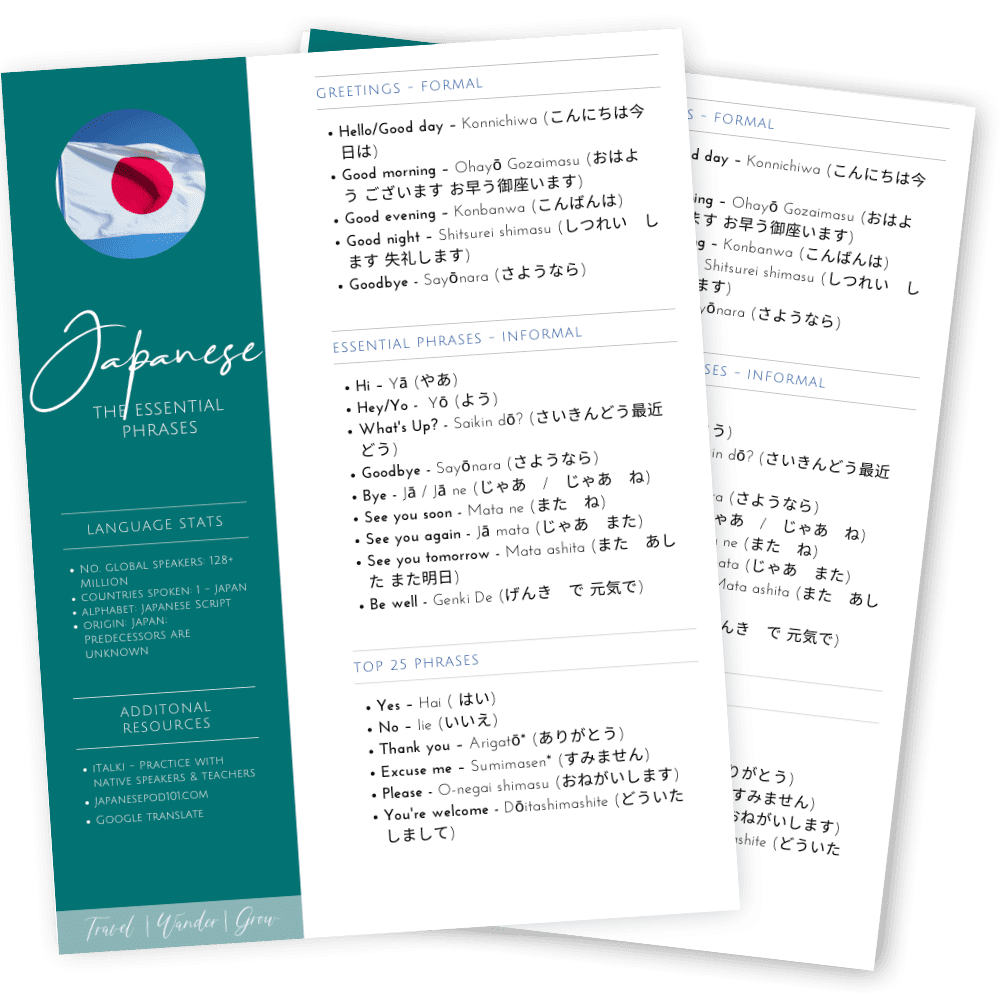
Get your free download!
Japanese phrases pdf.
This free download includes all the key Japanese phrases that you will need for your travels to Japan. In addition, get details on the best resources to improve your speaking and listening skills as well.
Japanese language history can be split into five main periods:
- Old Japanese (Prior to 8th Century)
- Late Old Japanese (9th – 11th Century)
- Middle Japanese (12th – 16th Century)
- Early Modern Japanese (17th-18th Century)
- Modern Japanese (19th Century – now)
Japanese has been a recognized language for the past 1200 years, from around the 8th century AD, where the earliest Japanese writings have been found. Some earlier evidence of the Japanese language has appeared in Chinese writings from as early as the 3rd century AD, but it is not known how long the language has existed on the island.
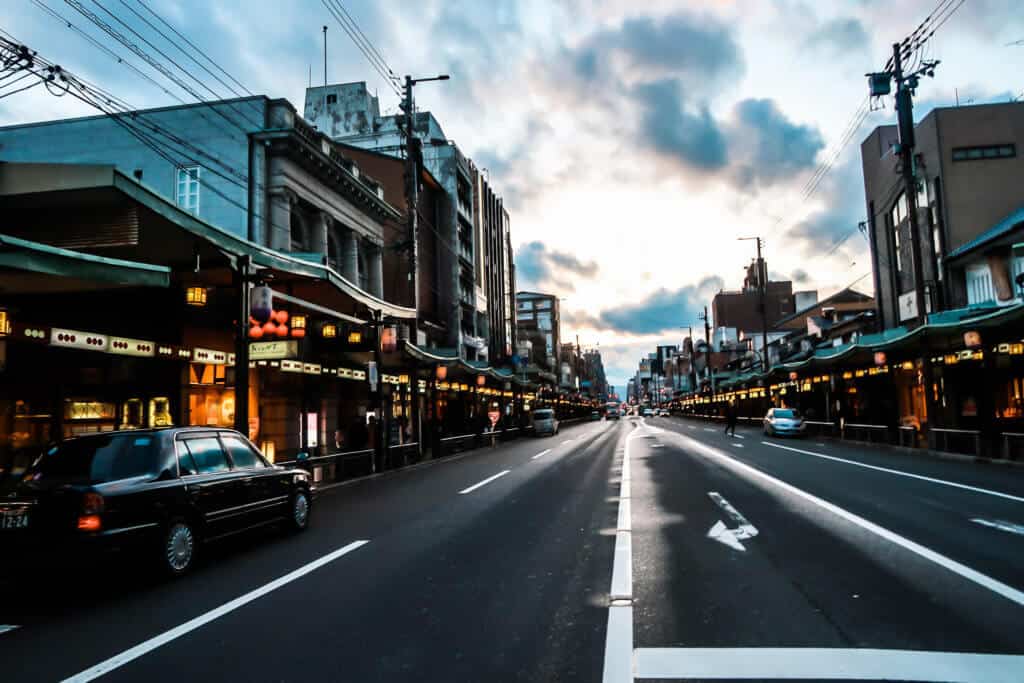
The Language Today
Today, Japanese is spoken by over 125 million people, most of whom reside in Japan. It is not the official language of Japan, but is the de facto national language of Japan. The standard form of the language is called hyojungo “standard Japanese or kyostugo “common language”. This is the variety of the language that is taught in schools and used in TV and official communications.
There are dozens of dialects spoken throughout Japan, as with many old languages. Some differences are more minor (e.g., changes to pronunciation or words used), while other dialects are so distinct from each other that they are mutually unintelligible. This is most often the case for dialects coming from peripheral regions, mountain villages, or isolated islands in the country.
I will also note, there are other languages spoken in Okinawa, as well as the Ryukyu and Amami Islands, known as the Ryukyuan languages. These languages are part of the Japonic language family, and some are considered endangered languages by UNESCO. Their decline is use is due to a shift in greater use of Standard Japanese and other dialects.
RELATED: Kyoto Travel Guide
Japanese Script
An interesting fact about Japanese that did not know until recently, is that Japanese has no genetic relationship to Chinese. Which was surprising to me because the language does use mostly Chinese characters in its written script. There have been two methods of using Chinese script – the first by using them as characters to represent an object or idea. The second method involves using the script to pronounce Japanese words phonetically – which is not widely done today.
Over time, the Japanese script has been modified from the traditional Chinese characters with the overall simplification of some characters. Additionally, there has been the incorporation of hiragana characters, which are also simplified and have a more rounded appearance.
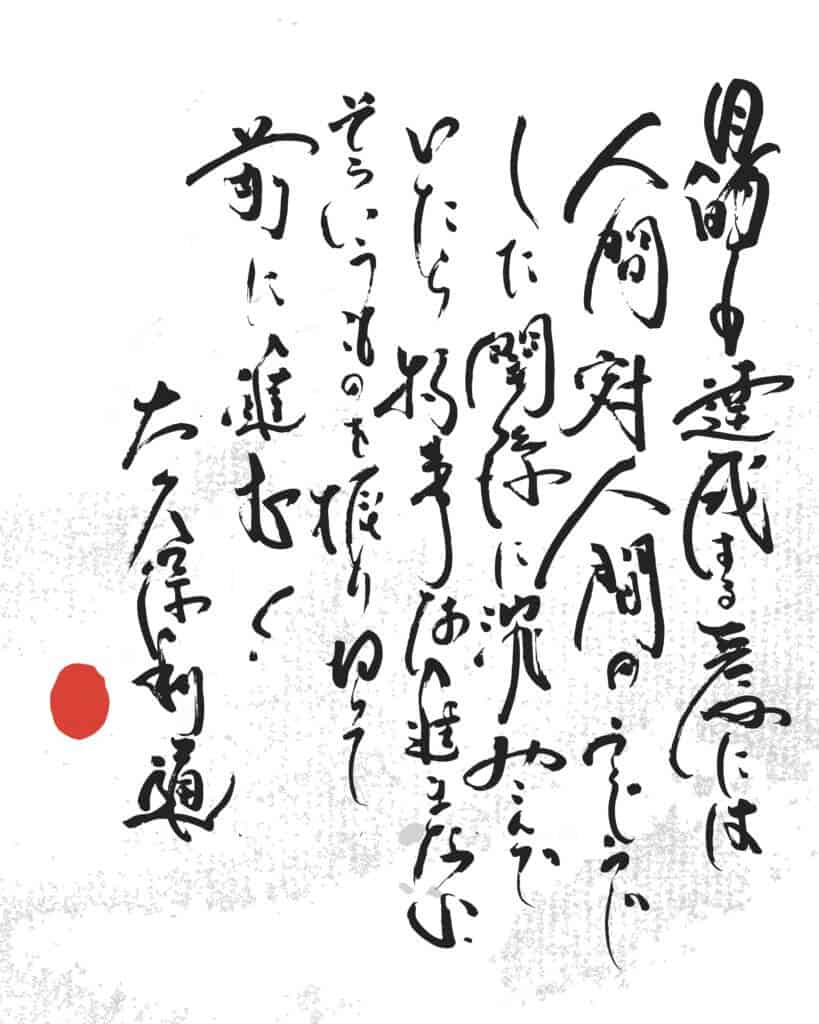
Additional Observations on Japanese
For the true language nerds out here are a few interesting facts about Japanese:
- There are no diphthongs in Japanese, only monophthongs, demonstrating that all Japanese vowels are “pure”
- Word order is classified as subject-object-verb, but the only strict rule there is that the verb must be at the end of the sentence
- The culture in Japan is VERY polite, and that is also represented in the spoken language as there is an extensive grammatical structure to express politeness, formality, and even differing levels of social status
Basic Japanese Words and Pronunciation
Japanese greetings – formal.
Here are some basic formal greetings (hi / goodbye) that you’d use on a regular day.
- Hello/Good day – Konnichiwa (こんにちは今日は)
- Good morning – Ohayō Gozaimasu (おはよう ございます お早う御座います)
- Good evening – Konbanwa (こんばんは)
- Good night – Shitsurei shimasu (しつれい します 失礼します)
- Goodbye – Sayōnara (さようなら)
Note, when greeting others in Japan be sure to accompany your words with a slight bow. This bow is often done again when saying goodbye as well.
Japanese Greetings – Informal
If you stay in Japan for a time and make friends, it may be appropriate for you to incorporate informal greetings into your vocabulary:
- Hi – Yā (やあ)
- Hey/Yo – Yō (よう)
- What’s Up? – Saikin dō? (さいきんどう最近どう)
- Bye – Jā / Jā ne (じゃあ / じゃあ ね)
- See you soon – Mata ne (また ね)
- See you again – Jā mata (じゃあ また)
- See you tomorrow – Mata ashita (また あした また明日)
- Be well – Genki De (げんき で 元気で)

Top 30 Japanese Phrases
Outside of Japanese greetings, here are the top 30 phrases that you should learn before visiting Japan:
- Hello – Kon’nichiwa (こんにちは)
- Yes – Hai ( はい)
- No – Iie (いいえ)
- Thank you – Arigatō* (ありがとう)
- Excuse me – Sumimasen* (すみません) – This phrase is important when trying to get the attention of your waiter in restaurants, and when passing people in tight quarters.
- Please – O-negai shimasu (おねがいします)
- You’re welcome – Dōitashimashite (どういたしまして)
- I’m sorry – Gomennasai (ごめんなさい)
- Do you speak English? – Eigo o hanasemasu ka (えいごをはなせますか。)
- I only speak a little Japanese – Watashi wa nihongo ga sukoshi shika hanasemasen. (わたしは にほんごがすこししか はなせません。)
- What is your name? – O-namae wa nan desu ka. (おなまえはなんですか。)
- My name is __ – Watashi no namae wa ___ desu. (わたしのなまえは かおりです)
- How are you? – O-genki desu ka. (おげんきですか。)
- I’m fine, thanks – Genki desu. (げんきです)
- I’m very glad to meet you – Oaidekite ureshī desu. (おあいできて うれしいです。)
- I don’t understand – Wakarimasen (わかりません。)
- What did you say? – Nante iimashita ka. (なんていいましたか。)
- Can you speak more slowly? – Motto yukkuri hanashite kudasai. (もっと ゆっくりはなしてください。)
- I understand you perfectly. – Yoku wakarimasu. (よくわかります。)
- How much is it? – Ikura desu ka? (いくらですか?)
- Do you have ___? – ______ wa arimasu ka? (はありますか)
- Help! – Tasukete (助けて。)
- I don’t need it. – Iranai (いらない)
- Great! / I’m glad! – Yokatta (良かった)
- Are you okay? – Daijoubu desu ka. (大丈夫ですか)
- What happened? – Doushitanda. (どうしたんだ)
- Welcome – Irasshaimase. ( いらっしゃいませ)
- How much does it cost? – Ikura kakarimasu ka? (いくらかかりますか?)
- It costs. .. – Hiyō ga kakarimasu (費用がかかります)
Note: I’ve put an asterisk by the phrases that I used the most while traveling through Japan.
Counting to 10 in Japanese
There are two methods of counting in Japanese: 1) Sino-Japanese and 2) Native Japanese. Sino-Japanese is used most often (by far), so this is what is demonstrated in the tabel below:
RELATED: The Link Between Languages and Travel
Pronouncing Japanese the Right Way
Check out this video from a native speaker that covers pronunciation for many of the phrases listed above. For best results, practice saying the words out loud so that you get used to speaking them.
Japanese Travel Phrases PDF
Keep your learning going by downloading this Japanese Phrases PDF. You will be able to practice as needed before your trip!
FAQs about Learning Japanese for Travel
Before your trip to Japan, some common phrases you should learn are “Arigatou gozaimasu” (Thank you very much), “Sumimasen” (Excuse me/I’m sorry), “Konnichiwa” (Hello), “O-genki desu ka?” (How are you?), and “Eigo o hanashimasu ka?” (Do you speak English?).
Japanese people often say “Ittekimasu” (I’ll go and come back) before leaving their home, which is a polite way of saying they are heading out. Similarly, upon returning, they say “Tadaima” (I’m back) to announce their arrival.
The Japanese word for travel is “tabi” (旅).
Some must-know phrases for Japanese travel include “Doko desu ka?” (Where is it?), “Ikura desu ka?” (How much does it cost?), “Eki wa doko desu ka?” (Where is the train station?), “Kudasai” (Please/give me), and “Osusume no o-sake wa arimasu ka?” (Do you have any recommended sake?).
Some cool Japanese phrases include “Yoroshiku onegaishimasu” (Please take care of it/Thank you in advance), “Kawaii” (Cute), “Oishii” (Delicious), “Ganbatte” (Good luck/Do your best), and “Natsukashii” (Nostalgic).
Learning Japanese for Travel | Final Recommendations
That wraps my list of essential Japanese phrases for travelers. Now that you know WHAT you need to learn, the next step is to take it into practice. I suggest that you do that by downloading the attached PDF of key Japanese phrases, and practice the phrases daily for at least a month before your trip.
To complement learning these phrases, there are a few additional resources that you may find helpful:
- iTalki – On this site you can practice with a tutor, formal teacher, or others just seeking to do a language exchange (for free!). The paid lessons have very cheap options, with some as low as $5 an hour. Check it out!
- LigoPie – Practice listening and reading Japanese with videos. You can make changes to the speed you are listening to as well. This is the best way to rapidly increase your comprehension skills!
- Japanese Pod – There are so many free resources on the website and through the podcast they offer. There are paid options as well.
- Duolingo – I don’t find this app useful for practicing spoken language, but it will help you remember key phrases through repetition.
Have you studied Japanese before? Let me know if you have any additional tips in the comments below!
Related Posts on Japan:
- 2 Days in Kyoto
- 4 Days in Tokyo
- Hakone Travel Guide
- The Best Samurai Experience in Kyoto
- Ninja Akasaka Review
Additional Travel Language Guides:
- Portuguese for Travel
- Spanish for Travel
- Italian for Travel
- Thai for Travel
- Greek for Travel
- Language and Travel
Don’t forget to pin this for later!
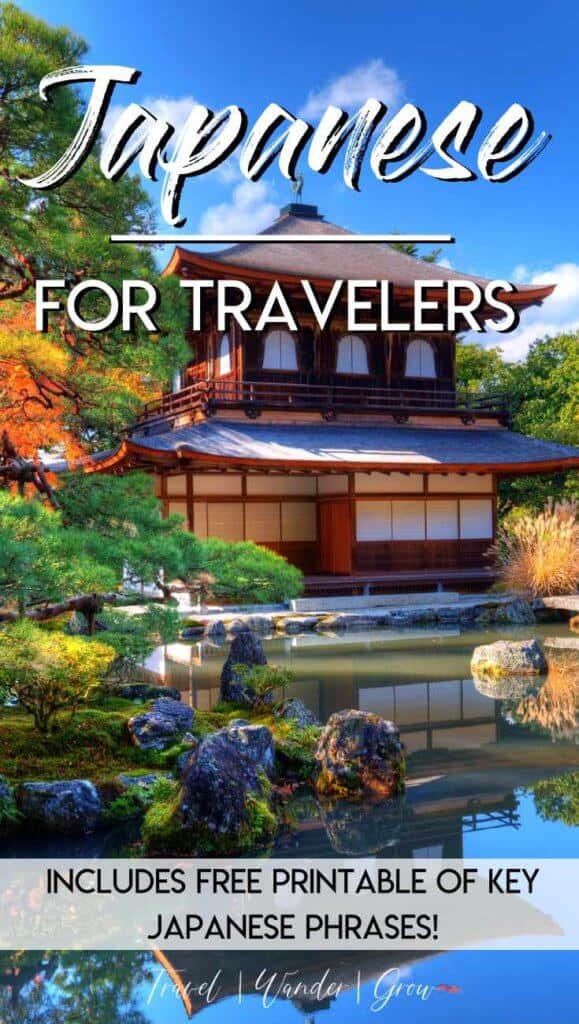
Christen Thomas is the founder of TravelWanderGrow, established in 2018. She has lived abroad and traveled extensively to over 30 countries. In addition, she is a certified Travel Advisor and is an expert in planning trips focused on city history and culture. As a frequent traveler, she also shares tips on how to prepare to travel well and how to save money while doing so.
Pinning this for later as we’re hoping to visit Japan in the next few years. Great breakdown of the common phrases. I had a Japanese roommate in high school so I’ve heard a lot of these phrases, but never knew how to spell them – so interesting!
Glad you have found the guide helpful, Emily! Hope you get to practice the phrases soon :).
I am Korean-American & can speak conversational Korean. I feel I would be able to easily pickup Japanese but they seem to talk so fast! Thanks for sharing this post! My husband & I hope to visit Japan later this fall…it will come handy!
Doesn’t it always seem that others speak so fast when you are learning a language? Hopefully you can put these to good use on your trip to Japan!
Very useful and interesting. Thank you! Keep it coming
Glad you found it helpful, Oliver!
Leave a Reply Cancel reply
Your email address will not be published. Required fields are marked *

Japanese Travel Phrases for an Enjoyable Trip to Japan

Are you traveling to Japan and want to learn practical Japanese travel phrases? This article is designed to help you learn the most useful Japanese words for travel.
It’s always good to learn basic words when you travel to a foreign country. Not only does it make getting around easier, but it also allows you to enjoy communicating with the locals.
In general, Japanese people are not so good at speaking English , free wifi services aren’t very prevalent (especially outside of the central cities), and Japan is still more of a cash-based society than you may think. However, Japanese people are very kind; they’ll listen to you patiently and do their best to help. So just use these basic Japanese travel phrases to talk to Japanese people when you want to ask something.
When you speak even a little bit of Japanese, locals will appreciate your effort and will be more friendly. Here’s JapanesePod101’s list of practical Japanese travel phrases for your travels to Japan!
Table of Contents
- Greeting/Communication
- Asking for Directions
- Restaurants
- When You Need Help
- Conclusion: How JapanesePod101 Can Help You Learn More Japanese

1. Greeting/Communication

To begin our list of essential Japanese travel phrases, we’ll go over greetings and basic travel phrases in Japanese for solid communication. These simple Japanese travel phrases can make a world of difference in your conversations and overall experience in Japan.
- Romanization: Kon’nichiwa
- English Translation: Hello
In terms of must-know Japanese travel phrases, you probably already know that this is the most common Japanese greeting word . You can say this to anybody for any occasion during the daytime.
- Romanization: Hai / Iie
- English Translation: Yes / No
Hai is “Yes” and it’s pronounced like the English word “Hi.” In Japan, saying yes also means that you understand. Iie is “No” and it’s pronounced ‘EE-eh.’
3- ありがとうございます
- Romanization: Arigatō gozaimasu
- English Translation: Thank you
Arigatō gozaimasu is the polite way to say “Thank you” in Japanese, and you can use this for any occasion. In case of a casual situation, you can just say Arigatō , or even more casually, Dōmo (どうも) which means “Thanks.”
4- いいえ、いりません
- Romanization: Iie, irimasen
- English Translation: No, thank you.
It literally means “No, I don’t need it,” in Japanese. At a restaurant, say this phrase when a waiter offers to fill your glass of water and you don’t want more.
- Romanization: Sumimasen
- English Translation: I’m sorry / Excuse me
This word is usually used to say “sorry” or “excuse me” . Say this when you bump into someone in a crowd or when you ask someone for directions. Japanese people also use this to mean “thank you,” in some cases, such as when someone picks up something you dropped.
- Romanization: Onegai shimasu
- English Translation: Please
When you request something, it’s polite to say Onegai shimasu . When someone offers you something and says please, she/he would say Dōzo (どうぞ) in Japanese.
- Romanization: Watashi wa XX desu.
- English Translation: I am XX.
Watashi is “I,” wa is “am/is/are,” and desu is a present-tense word that links subjects and predicates; it’s placed at the end of a sentence. You can put your name, or your nationality, such as: Watashi wa Amerika-jin desu (私はアメリカ人です) which means “I am American.”
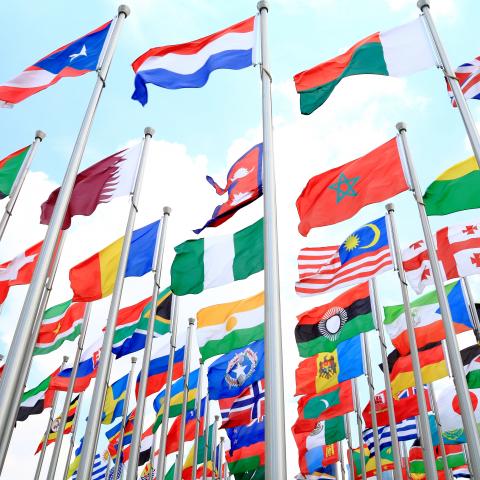
8- 私は日本語がわかりません
- Romanization: Watashi wa nihongo ga wakarimasen.
- English Translation: I don’t understand Japanese.
Nihongo is stands for the Japanese language, and Wakarimasen means “I don’t understand.” If you don’t know something, you can just say Wakarimasen meaning “I don’t know.”
9- 英語を話せますか
- Romanization: Eigo o hanasemasu ka
- English Translation: Can you speak English?
This is one of the most useful Japanese phrases for travelers. Eigo means “English,” Hanasemasu is a polite way to say “I speak,” and ka is a word that you add to the end of a complete sentence to make a question.
10- 英語でお願いします
- Romanization: Eigo de onegai shimasu
- English Translation: English, please.
This is another important Japanese travel phrase. De is the particle, and in this case it means “by” or “by means of.” The phrase literally translates as “English by please.” You can also say M saizu de onegai shimasu (Mサイズでお願いします) which means “Medium size, please.”
2. Asking for Directions

One of the most important Japanese travel phrases you should know are directions . Here are some useful vocabulary words and two Japanese language travel phrases you need to know!
1- Vocabulary
- 駅 ( Eki ) : Station
- 地下鉄 ( Chikatetsu ) : Subway/Metro
- トイレ ( Toire ) : Toilet
- 銀行 ( Ginkō ) : Bank
- 切符売り場 ( Kippu uriba ) : Ticket machine/Office
- 観光案内所 ( Kankō annaijo ) : Tourist information office
- 入口 ( Iriguchi ) : Entrance
- 出口 ( Deguchi ) : Exit
- 右 ( Migi ) : Right
- 左 ( Hidari ) : Left
- まっすぐ ( Massugu ) : Straight
- 曲がる ( Magaru ) : Turn
- 交差点 ( Kōsaten ) : Intersection
- 角 ( Kado ) : Corner
2- XXはどこですか
- Romanization: XX wa doko desu ka
- English Translation: Where is XX?
Doko means “where” and you replace XX with the name of where you want to go.
For example
- Toire wa doko desu ka (Where is the toilet?)
- Deguchi wa doko desu ka (Where is an exit?)
3- XX e wa dō ikeba ii desu ka (XXへはどう行けばいいですか) : How can I go to XX?
- Romanization: XX e wa dō ikeba ii desu ka
- English Translation: How can I go to XX?
Dō is “how,” e is “to,” and ikeba ii can be translated as “good to go.” When you want to know how you can get somewhere, replace XX with where you want to go.
For example:
- Eki e wa dō ikeba ii desu ka (How can I go to the station?)
- Ginkō e wa dō ikeba ii desu ka (How can I go to the bank?)
4- Other Examples
1. この道をまっすぐ行きます ( Kono michi o massugu ikimasu. ):Go straight on this street.
Kono michi is “this street” and ikimasu is the polite way to say “Go.” O is a Japanese postpositional particle which indicates an object (in this case, kono michi ).
2. 次の角を右へ曲がります ( Tsugi no kado o migi e magarimasu. ):Turn right at the next corner.
Tsugi no kado means “next corner” and magarimasu is the polite way to say “Turn.” E is another postpositional particle that indicates direction; this can be translated as the English word “to.”
3. 交差点を渡って左へ行きます ( Kōsaten o watatte hidari e ikimasu. ):Cross an intersection and go to the left (direction).
Watatte is a conjugated form of wataru which means “cross.”
3. Shopping
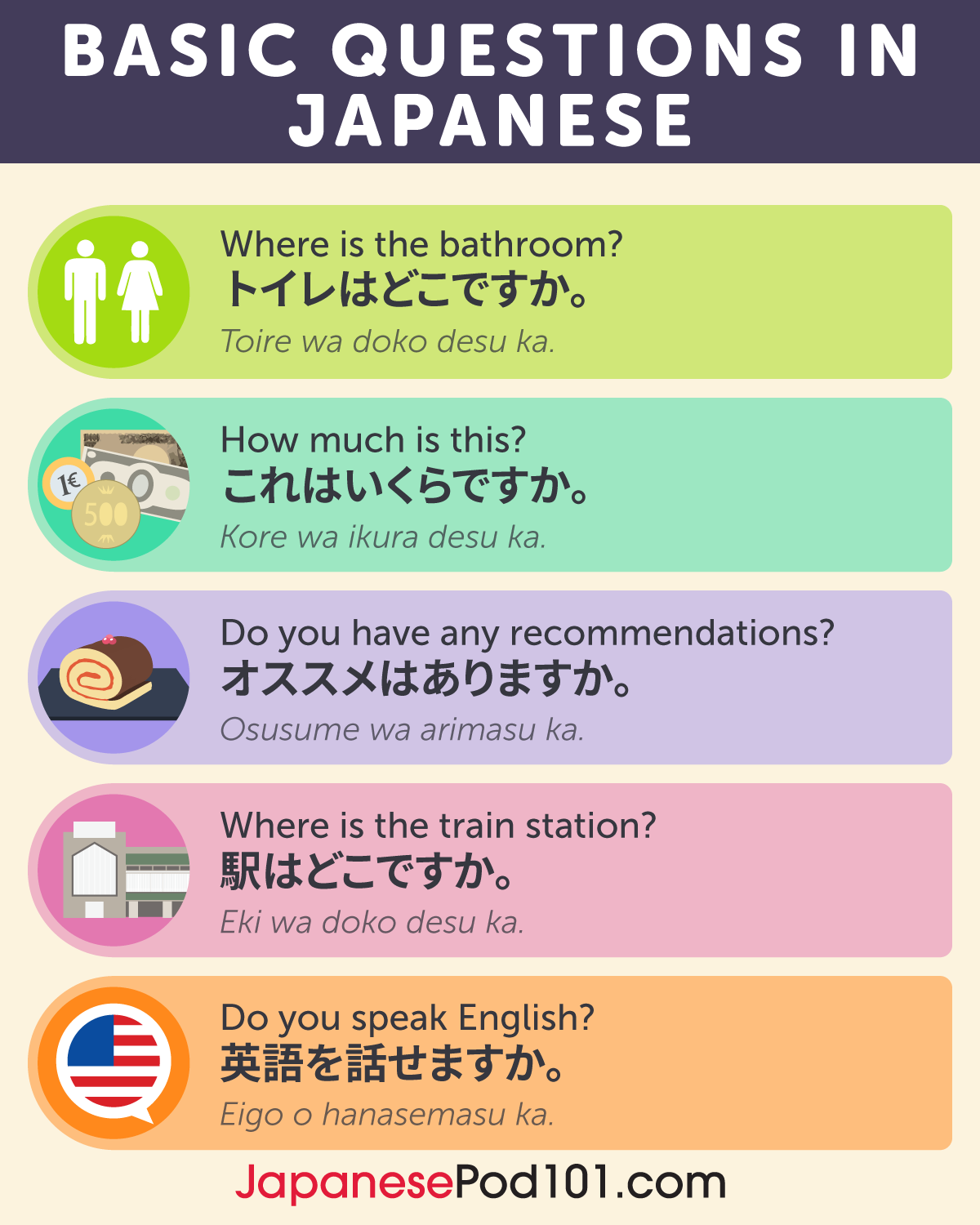
You’ll definitely love shopping when traveling in Japan, and some of the best Japanese phrases for travel are those related to this fun past-time. Knowing some useful Japanese words will make your shopping even more enjoyable.
1- XXはありますか
- Romanization: XX wa arimasu ka
- English Translation: Do you have XX?
When you’re at a store and looking for something, you can use this phrase by replacing XX with what you want.
- Romanization: Ikura desu ka
- English Translation: How much is it?
This is probably one of the most useful Japanese words for traveling and shopping. You can say Ikura desu ka in many situations, such as when you’re shopping, buying tickets, paying for a taxi, etc.
- Romanization: Menzei dekimasu ka
- English Translation: Can you do a tax exemption?
Did you know that, as a traveler, you can get a sales tax exemption when you purchase things greater than 5,000 yen? Menzei is “tax exempted” and dekimasu means “can do.” Don’t forget to say this when you buy something big!
- Romanization: Kore wa nan desu ka
- English Translation: What is this?
Kore is “this” and nan is another form of nani which means “what.” There are many unique foods, gadgets, and things which are unique to Japan, so when you wonder what it is, point to it and say this phrase.
- Romanization: Kore o kaimasu
- English Translation: I’ll buy this.
Kaimasu is the conjugation of the verb kau , which means “buy.”
6- カードは使えますか
- Romanization: Kādo wa tsukaemasu ka
- English Translation: Can I use a credit card?
Kādo is “card” and you pronounce it just like the English word “card.” Tsukaemasu is a conjugation of the potential form of the verb tsukau which means “use.” This phrase is useful when you want to use your card at small shops and restaurants.

4. Restaurants
Japan has an array of delicious foods, of which sushi and ramen are just the tip of the iceberg. Amazingly, Tokyo is the city with the most Michelin-starred restaurants in the world, for several consecutive years. Enjoy yummy food at restaurants with useful Japanese words for restaurants and easy Japanese travel phrases related to food.
- 英語のメニュー ( Eigo no menyū ) : English menu
- ベジタリアンのメニュー ( Bejitarian no menyū ) : Vegetarian menu
- 豚肉を含まないメニュー ( Butaniku o fukumanai menyū ) : Menu without pork
- 水 ( Mizu ) : Water
- 白/赤ワイン ( Shiro / Aka wain ) : White / Red wine
2- XXはありますか
When you want to ask if the restaurant has something you want, say this phrase (replacing XX with what you want).
- Eigo no menyū wa arimasu ka (Do you have an English menu?)
- Aka wain wa arimasu ka (Do you have red wine?)
- Romanization: XX o kudasai
- English Translation: Can I have XX?
This is another very useful phrase. Simply replace XX with what you want. You can also use this versatile phrase in various occasions, such as when shopping, choosing something, etc.
- Kore o kudasai (Can I have this?)
- Mizu o kudasai (Can I have water?)
4- お会計お願いします
- Romanization: O-kaikei onegai shimasu
- English Translation: Check, please.
O-kaikei means “check.” In Japan, people often cross their index fingers in front of their face as a gesture to indicate “check, please” at casual restaurants. However, when you’re at a nice restaurant, simply tell a waiter: O-kaikei onegai shimasu .
5. When You Need Help

Sometimes you get faced with unexpected emergencies while you’re traveling. Japan is famous for being one of the safest countries in the world, but you might fall very ill or be caught in a great earthquake.
1- Vocabularies
- 警察 ( Keisatsu ) : Police
- 病院 ( Byōin ) : Hospital
- 救急車 ( Kyūkyūsha ) : Ambulance
- ドラッグストア/薬局 ( Doraggu sutoa / Yakkyoku ) : Drug Store/Pharmacy
- タクシー ( Takushī ) : Taxi
2- XXを呼んでください
- Romanization: XX o yonde kudasai
- English Translation: Can you call XX?
When you’re severely ill or in case of emergency, let people know by using this phrase. Japanese people will kindly help you.
- Yūkyūsha o yonde kudasai (Can you call an ambulance?)
- Keisatsu o yonde kudasai (Can you call the police?)
3- どこでインターネットを使えますか
- Romanization: Doko de intānetto o tsukaemasu ka
- English Translation: Where can I use the internet?
Although large cities in Japan provide free public wifi at major stations, metros, and cafes, you may need to find internet access in smaller cities. Remember that there will be kind Japanese people who will share their personal hotspots, or look things up for you with their own phones, as well.
4- 電話を貸してください
- Romanization: Denwa o kashite kudasai
- English Translation: Can I use your phone?
Denwa is “phone” and kashite is a conjugation word of kasu , which means “lend.” This phrase is literally translated as “Please lend (me) a phone.”
- Romanization: Tasukete kudasai
- English Translation: Please help me.
I believe this phrase is the last thing you would ever use in Japan, but in case something does happen, this is useful survival Japanese for tourists.

6. Conclusion: How JapanesePod101 Can Help You Learn More Japanese
I hope this article of Japanese travel phrases is helpful and that you’ll enjoy your trip to Japan!
If you would like to learn more about the Japanese language, you’ll find more useful content on JapanesePod101.com . We provide a variety of free lessons for you to improve your Japanese language skills.
We also have YouTube channel: JapanesePod101 . It’s fun to learn Japanese through watching videos and listening to actual Japanese pronunciation, so we recommend you check it out!
Don’t forget to study with our free Japanese vocabulary lists , read more insightful blog posts like this one, and download our mobile apps to learn anywhere, anytime! Whatever your reason for learning Japanese , know that we’re here to help and you can do it ! Keep in mind that the best way to learn Japanese phrases for travel is repetition and practice.
Before you go, let us know in the comments how you feel about using these useful travel phrases in Japanese after reading this article. More confident, or still a little confused about something? Feel free to ask questions in the comments!
Or sign up using Facebook
Got an account? Sign in here

How To Say ‘Thank you’ in Japanese

How to Say Hello in Japanese: Practical Japanese Greetings

How to Say I Love You in Japanese – Romantic Word List

All About the Japanese National Anthem : Kimigayo 君が代

100+ Useful Japanese Classroom Phrases & Vocabulary

50+ Restaurants Phrases for Eating Out in Japan
How to celebrate april fools’ day in japanese.
- Forum Spotlight
- Everyday Kanji
- Explore Japan
- Scheduled Maintenance
- Benkyō Blog
- Max in Shanghai
- Nathan's Notebook
- Samurai Theologian
- Japanese Holidays
- Japanese Dictionary
- Japanese Food
- Japanese Language
- Japanese slang
- Japanese Translation
- Kanji Mnemonics
- Kanji Scrabble
- Kanji Curiosity
- Advanced Japanese
- Japanese Alphabet
- Japanese Grammar
- Japanese Lessons
- Japanese Online
- Japanese Phrases
- Japanese Podcasts
- Japanese Words
- Tips & Techniques
- Learn Japanese
- Getting Started Living in Japan
- Media Coverage
- Motoko's Blog
- Feature Spotlight
- Speak Japanese
- Success Stories
- Teaching Japanese
- Team JapanesePod101
- Travel Japan
- Uncategorized
- Word of the Day
- Immigration, Visas
- Tokyo Intern
Copyright © 2024 Innovative Language Learning. All rights reserved. JapanesePod101.com Privacy Policy | Terms of Use . This site is protected by reCAPTCHA and the Google Privacy Policy and Terms of Service apply.
The journey is the reward
42 Basic Japanese Phrases to Survive in Japan [With Audio]

Japan’s beauty is unique in Asia and attracts millions of people worldwide. Who hasn’t thought to themselves at least once,
I would love to get lost here.
If you plan to travel to Japan someday, learning some basic Japanese phrases will not onl y help you to survive in Japan, but also increase your chance of communicating with native Japanese that adds amazing flavor to your journey.
In this post, we’ll present you with 42 basic Japanese phrases that can navigate you through your stay in Japan. From introducing yourself, navigating public transportation and asking for directions, shopping, eating out, and coping with an emergency, this article will cover almost all the basic Japanese phrases for tourists .
Read on to prepare for your next trip to Japan!
Table of Contents
Japanese Phrases for Meeting and Greeting
We all know that Japanese people speak and act politely. Here are some greeting phrases that will make your life in Japan a lot smoother.
First, if you want to talk to someone, you’d better start with a greeting. If you meet somebody in the morning, you can start the conversation by saying:
Note that Japanese people use “すみません” frequently to apologize for things like stepping someone in the bus, or stopping someone to ask for direction. So this could be one of the most useful Japanese phrases you want to memorize.
Japanese Phrases for Navigating Public Transportation and Getting Around
When Using Public Transportation, y ou may have heard that Japanese cities like Tokyo have one of the most complex railway systems in the world. But don’t worry, here are several phrases to help you survive in those underground labyrinth ( Navitime can help to navigate you through Japan’s confusing metro system). First, you need to find the bus stop (バス停, basutei) or the railway station (駅, eki).
You may want to try the Japan Rail Pass to save some money as well as effort to buy tickets every time. Also, a useful app called HyperDia can help you decide which train to take and warn you when a journey isn’t covered by the Japan Rail Pass .

Now try yourself!
To find digital maps or travel brochures, you can consult JNTO-Travel Brochures . For all the help you received, you can express your gratitude with the simple phrase:
Japanese Phrases for Shopping
While traveling in Japan, you may find there are so many things you want to purchase and take home. Then what phrases are used when shopping for souvenirs?
Don’t forget to get your tax refund if you are an international tourist staying in Japan for less than 6 months.

Japanese Phrases for Eating Out
After walking and shopping, you may find yourself hungry and want some authentic Japanese cuisine. With these basic Japanese phrases, you can walk into any restaurant you want with confidence.
If you want to ask for an English menu, you may say: 英語のメニュー、お願いします。(eigo no menyu, onegaishimasu.) When you find something you are interested in, you can just point to the menu and tell the waiter:
If you want to order the food by its name, you could use the sentence structure “ください (kudasai)”. For example, if it is the tea that you want, you can say:

If you happen to be dining with a Japanese person, say this before you start:
Japanese people say “ いただきます ” before eating (not towards anyone, but to the food), and “ごちそうさまでした” after finishing it. You can say “ごちそうさまでした” to the owner of the restaurant, and he or she will be very much glad. When you are satisfied with the food, you can say this Japanese phrase to compliment the food:
After finishing the delicious meal, you may want to express your gratitude by saying:
As one can imagine, the amount of help you might receive doesn’t only depend on the welcoming nature of your host but also on how respectful you are.
💡Tips: Japanese dining etiquette 101
- Don’t point at someone or something with your chopsticks.
- Use the chopsticks to grab your food, not as a fork.
- Do not leave your chopsticks planted up in your rice.
- Don’t pass on food to other people around you from chopsticks to chopsticks.
To better plan your trip and find local cuisine, you can consult: Japan Travel ; Japan-Guide and Gurunavi. Before going to Japan, you might want to know more about Japanese Manners Do’s and Don’ts . Know their manners so that you can use these Japanese phrases wisely.
Japanese Phrases for Emergency
I do hope you will not run into any unpleasant situations in Japan. However, as the saying goes, “Better safe than sorry”, I hope you can remember the following phrases to prepare for any emergency cases that might occur. First, the situation will be a lot better if you can find anyone who is able to speak English, so you can try to find one by asking:
If it is getting dangerous, just shout out:
If you get lost, try to explain your situation to people around you. Remember you can get help from the embassy and do note down the phone number and address of the embassy of your country. If you cannot use your phone, try to ask others for help:
Except for the last section, I do hope all the basic Japanese phrases you learned in this post will come in handy during your stay in Japan. As a bonus, I will introduce several cute Japanese phrases that can be used to express your emotion when talking to native speakers!
Japanese Phrases to Express Emotion
You may have already known the phrase, Japanese people do use “かわいい” a lot. It seems that “かわいい” can be used to show their likeness for almost anything, from clothes, stationery, to buildings and shops.
Another phrase that you are most likely to hear in Japan is “すごい ”. Try to use “ すごい” to compliment others and you may make some native friends.
If you are interested in learning more Japanese phrases, check out LingoDeer’s travel phrasebook and learn 1000+ common Japanese travel phrases for free . You may also encounter some anime expressions;)
If you already fall in love with Japanese, go on and read our blog articles How long does it take to learn Japanese, or this essential guide to Learn Japanese From Beginner to Advanced. Hope you can find something useful there, too!
See, learning Japanese is not as hard as you think! If you wish to find more Japanese learning resources, check out this article about the best Japanese learning apps and hopefully you’ll find one suits you!
Wish to learn more Japanese phrases but don’t know where to start? Let me help!
I’m LingoDeer . I’m here to make your Japanese learning journey smart and fun!
Try LingoDeer for FREE
Published by Cindy Fan
Hi, I am Cindy Fan. I majored in Japanese for four years in undergraduate school and spent 7 months in Tokyo as an exchange student. There, I fell in love with Japanese culture. Currently, I am studying for an LLM degree at BFSU. View all posts by Cindy Fan
Leave a comment Cancel reply

[…] Related post: Essential list of Japanese travel phrases. […]
[…] time now to be finalizing your plans, making a list of things to see and do, booking tickets, and learning the phrases you need to get you […]
[…] will find you are one step closer to understanding Japanese culture. You may also want to know some basic Japanese phrases to show your […]
Discover more from LingoDeer
Subscribe now to keep reading and get access to the full archive.
Type your email…
Continue reading
Unconventional language hacking tips from Benny the Irish polyglot; travelling the world to learn languages to fluency and beyond!
Looking for something? Use the search field below.
Home » Articles » 25 Essential Japanese Phrases for Travellers and Tourists
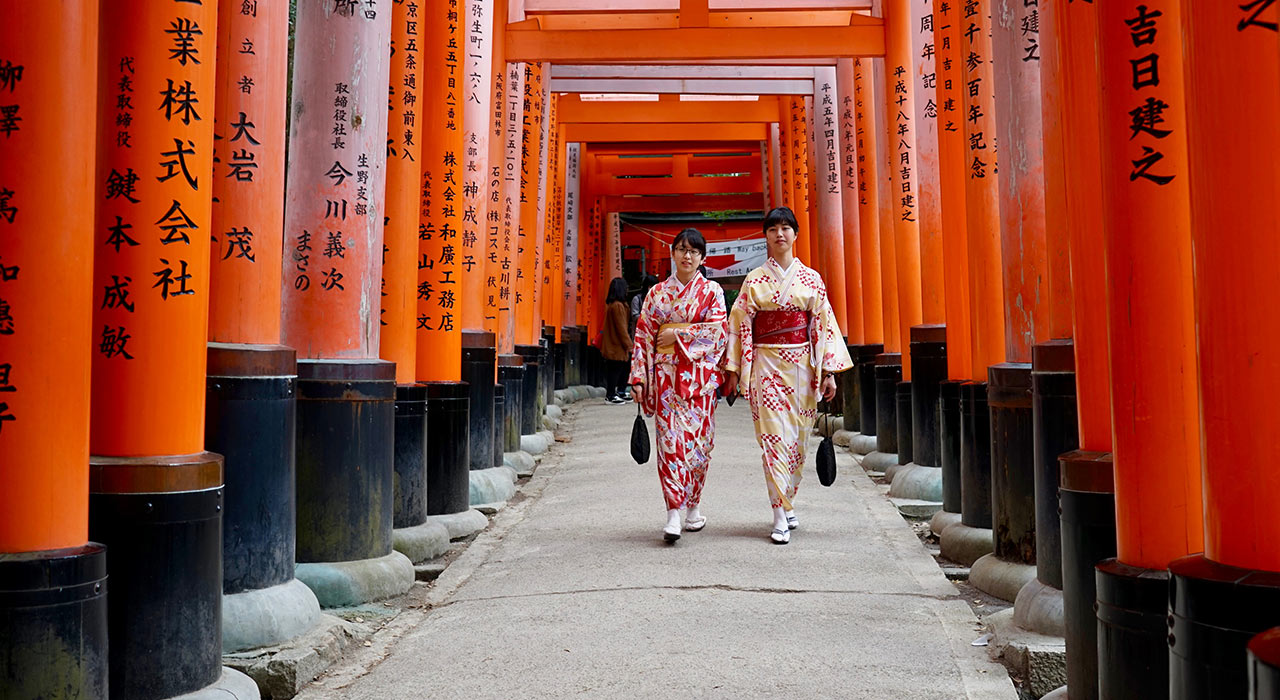
Full disclosure: This post contains affiliate links. ?
written by Caitlin Sacasas
Language: Japanese
Reading time: 12 minutes
Published: Dec 30, 2019
Updated: Sep 17, 2021
25 Essential Japanese Phrases for Travellers and Tourists
Getting ready to travel to Japan? You’ll need to know a few Japanese phrases before you go!
Learning even a few travel phrases in Japanese will break down a lot of barriers during your stay.
Japan is becoming more foreigner-friendly — you’ll notice updated signage includes English in main cities. And many Japanese people have spent some time learning English in school. But most people aren’t comfortable talking in English.
Japanese people know how hard it is to learn their language. They highly respect anyone who tries to learn and they appreciate your effort. Your willingness to try speaking Japanese will encourage them to try speaking the English they know. It’ll help you get by, and make your stay much more enjoyable.
Besides, it’s incredibly rewarding to visit a foreign country and connect with locals in their native language . And it shows a lot of respect for their culture, which the Japanese highly value.
So here are 25 essential Japanese phrases for all you travelers out there. All these phrases will be in formal, standard Japanese speech so they’re appropriate in any situation.
If you blast through these and you’re ready to learn more, check out JapanesePod101 . It’s the best podcast for learning Japanese, with courses dedicated to learning Survival Japanese — everything you need to know in Japanese to get by. Plus, there are culture classes, beginner to advanced lessons, and more. It’s definitely my favorite for getting started.
Okay, let’s start speaking Japanese!
1. “Hello” in Japanese – こんにちは ( Konnichiwa )
In Japanese, you can greet someone with こんにちは. It means “hello,” but there are many ways to greet someone in Japanese .
Konnichiwa also translates as “good afternoon,” so it’s best used during the day. In the morning, you can use おはようございます ( Ohayou gozaimasu ), and in the evening, こんばんは ( konbanwa ).
Konnichiwa actually means “This day is…” but it’s used now to say hello.
2. “Please” in Japanese – ください ( Kudasai )
There are a couple of ways to say “please” in Japanese. The most universal one is ください. It means “please,” and you’d use it to ask a favor of almost anyone.
For instance, if you’re at a restaurant, you can say メニューをください ( Menyu- o kudasai ) to say “Please give me a menu.”
If you want to be more polite, you could use お願いします ( Onegai shimasu ). Either version of “please” is okay, but this one is better if you’re asking something of someone with higher status, or if you’re asking for a service. At a restaurant, both ください and お願いします are acceptable. Another example: if you’re ready for the check, you say お会計お願いします ( o-kaikei onegai shimasu ).
Unlike English, where “please” can be at the beginning or end of the sentence, it always comes at the end of the sentence in Japanese.
3. “Thank You” in Japanese – ありがとうございます ( Arigatou gozaimasu )
To thank someone in Japanese, you say ありがとうございます. That’s the most common way.
But maybe you learned “thank you” was “ Domo arigatou , Mr. Roboto.” from the song. どもありがとう does mean “thank you” as well, but more like “Thank you very much.” And it’s a little less formal without the ending ございます ( gozaimasu ).
4. “Excuse Me” in Japanese – すみません ( Sumimasen )
When you want to get someone’s attention, you can say すみません, followed by your question or request.
You can also use this to ask someone (politely) to move, or even to apologize in place of “sorry.”
5. “Let’s Eat” in Japanese – いただきます ( Itadakimasu )
いただきます is a unique Japanese phrase. It’s used like “let’s eat” in English or “bon appetit” in French. But it’s original meaning is “I humbly receive” and it’s always said before every meal, even when you eat alone. It’s a way to give thanks for the food, almost like saying grace.
When eating with others, it’s the signal to begin eating. You clap your hands together in a prayer position and say “いただきます!”
But, if you wanted to suggest grabbing a bite to eat, the polite way to ask would be 食べませんか ( Tabemasen ka , “Would you like to eat?”).
6. “Thank You for the Food” in Japanese – ごちそうさまでした ( Gochisousama deshita )
After a meal, you always say ごちそうさまでした. It means “thank you for the food,” and you’d say it to whoever treated you to your meal or cooked your food. Even if you paid for or made your own meal, you say this as an expression of gratitude to have food to eat.
7. “One” in Japanese – 一つ ( Hitotsu )
There are two different ways to count in Japanese , but for most basic phrases you’ll need to know “one” as 一つ. Hitotsu is the universal counter for the number 1, meaning you can use it to specify how many of anything you want or have.
The phrase 一つをください ( Hitotsu o kudasai ) means “one, please.” You can use it to ask for one ticket, one pastry, one of anything while you’re out. Simply point and say Hitotsu o kudasai .
8. “Yes” and “No” in Japanese – はい ( Hai ) and いいえ ( Iie )
To say “yes” in Japanese, you say はい and “no” is いいえ. Both of these are the polite, formal way to say them. However, you’ll more often hear うん ( un ) and ううん ( uun ) even though these are informal. Since you’re learning the basics, stick to hai and iie for now, but just know you may hear un and uun from others.
There’s another way to say “no” that’s more common because it’s less direct than iie . I’ll get to that in a moment.
9. “What’s Your Name?” in Japanese – お名前は何ですか ( O-namae wa nan desu ka )
In Japanese, you can ask for someone’s name by saying お名前は何ですか. “Ka” is a question particle, so it takes the place of “?” at the end of a sentence in Japanese.
When replying, Japanese people say either only their last name or their last name and then first name. If you want to answer this question, you can simply say your name followed by です ( desu ). So here's how that exchange might look:
“お名前は何ですか。” ( O-namae wa nan desu ka ) “たけうちなおこです。お名前は何ですか。” ( Takeuchi Naoko desu. O-namae wa nan desu ka. ) “サカサスケイトリンです。” ( Sakasasu Keitorin desu. )
In that example, the other person is Naoko Takeuchi (if only I was so lucky as to introduce myself to the creator of Sailor Moon!). But in Japanese, she’s known by her family name first: Takeuchi Naoko.
As a 外国人 ( gaikokujin , “foreigner”), I could say my name as either Keitorin Sakasasu or Sakasasu Keitorin . Either way is fine.
After meeting someone, it’s respectful to say よろしくお願いします。( Yoroshiku onegai shimasu , “Nice to meet you.”)
10. “How are you?” in Japanese – お元気ですか ( O-genki desu ka )
In Japanese, you can ask someone how they are with お元気ですか. But it’s more common to say お元気でした ( O-genki deshita ), which is past tense for asking someone “How have you been?” You don’t often ask how someone is doing in Japanese, but rather how they have been since you’ve seen them last (when it’s been a while).
11. “I’m Sorry” in Japanese – ごめんなさい ( Gomen nasai )
To apologize in Japanese, you can say ごめんなさい ( gomen nasai ) or ごめんね ( gomen ne ). Gomen ne is more casual, but still quite common even in semi-formal situations. すみません ( Sumimasen ) works, too, or you could ask someone “Excuse me” and then follow with “Sorry” – ごめんね!
12. “What’s This?” in Japanese – これは何ですか ( Kore wa nan desu ka )
Chances are, in Japan, you’ll stumble across some wild and totally different things. There are a lot of things unique to Japanese culture , from the toilets to the vending machines. So this is a good phrase to have ready!
If you don’t know what something is, ask これは何ですか and someone will explain it to you or help you out.
13. “I Don’t Understand” in Japanese – わかりません ( Wakarimasen )
Still don’t know what that thing is? Or is someone trying to talk to you in Japanese, and you don’t follow along? Then reply with ごめんなさい。わかりません。( Gomen nasai. Wakarimasen ).
Don’t be embarrassed to explain that you don’t understand. It won’t hurt the other person’s feelings — and you’re just starting out! It’s better to be honest than to run into trouble because you pretended to understand .
14. “What Does _ Mean?” in Japanese – は何意味ですか (*__ wa nan imi desu ka*)
Didn’t understand a certain word in particular? You can then ask “ _ は何意味ですか. “ Insert the word you didn’t understand into the blank.
For instance, if someone told you that thing in the vending machine is a 傘 ( kasa ), and you don’t know what kasa means, then you can ask 傘は何意味ですか ( Kasa wa nan imi desu ka ). The other person can either explain it’s for rain — “雨のためですよ” ( Ame no tame desu yo ) — or they’ll tell you “umbrella” if they know it in English.
15. “Say it Again More Slowly, Please” in Japanese – もう一度ゆっくり言ってお願いします ( Mou ichido yukkuri itte onegai shimasu )
If you still don’t understand or can’t keep up, use this phrase. Japanese people talk very fast, and the words can run together easily. So if you didn’t understand because you need to hear it slower, say すみません、わかりません。もう一度ゆっくり言ってお願いします ( Sumimasen, wakarimasen. Mou ichido yukkuri itte onegai shimasu ).
Or, you could shorten it to ゆっくりお願いします ( Yukkuri onegai shimasu ). This is just “more slowly, please.”
16. “How do you say ?” in Japanese – _ は日本語で何と言いますか (*__ wa nihongo de nan to iimasu ka*)
If you don’t know the word for something in Japanese, you don’t have to completely revert back to English! You can say _ は日本語で何と言いますか and fill in the blank with the English word.
Using our umbrella example again, you could say “Umbrella は日本語で何と言いますか” and the other person can tell you it’s kasa .
17. “Do you speak English?” in Japanese – 英語を話せますか ( Eigo wo hanasemasu ka )
You can ask someone if they speak English with 英語を話せますか. You could use this phrase with any language, and swap out eigo (“English”) for any other language. 日本語を話せますか ( Nihongo wo hanasemasu ka ) means “Do you speak Japanese?”
If you’re really trying to learn the language, not just get by briefly on a trip to Japan, then I would encourage you to keep trying to speak only in Japanese . This is your chance to learn and really speak! Don’t waste it by reverting back to English. You can always use phrases like the last one – “ _ は日本語で何と言いますか” – over and over again to learn how to say what you need!
18. “Where is ?” in Japanese – _ はどこですか (*__ wa doko desu ka*)
If you’re lost or looking for something, and all the signs are in kanji that you can’t read yet, then ask someone for help with “ _ はどこですか.” Some words you might want to fill in the blank with:
- トイレ ( toire ) – Bathroom
- 駅 ( Eki ) – Train station
- 地下鉄 ( Chikatetsu ) – Subway
- バス停 ( Basu tei ) – Bus stop
- ホテル ( Hoteru ) – Hotel
- 地図 ( Chizu ) – A map
- 入口 ( Iriguchi ) – Entrance
- 出口 ( Deguchi ) – Exit
- レストラン ( Resutoran ) – Restaurant
19. “How Much is This?” in Japanese – これはいくらですか ( Kore wa ikura desu ka )
When you’re out shopping, you can find out the price of something by asking これはいくらですか. Keep in mind yen — represented by 円 ( en ) in Japan — is like counting pennies. If someone said 1000 yen ( sen en in Japanese), that’s actually about $10.
20. “It’s a bit…” in Japanese – ちょっと… ( Chotto… )
Ah, yes. The universal phrase, ちょっと. Chotto means “a little” or “a bit.” As a phrase by itself, it shows hesitation, and means “It’s a bit… (inconvenient, not good for me).”
You’ll hear this phrase used in place of no ( iie ) more than you hear a direct “no.” One thing you’ll learn is that Japanese is not a very direct language, and relies heavily on context and body language.
So, if you asked how much something was with “これはいくらですか” and it was too expensive, you can say “Aaa… chotto…” to say “Ah, that’s a bit pricey.” To be more direct, you could say ちょっと高い ( Chotto takai ), “It’s a bit expensive.” You may be able to score a cheaper price by being direct, but directness like that isn’t considered polite.
21. “What do you recommend?” in Japanese – おすすめは何ですか ( Osusume wa nan desu ka )
If you don’t know what’s good at a restaurant or shop, you can ask someone おすすめは何ですか to get their opinion.
This is a nice phrase to know because then you can ask locals what’s good around here, where you should eat, or what the house specialty is. It’s a good way to truly experience the country!
22. “Does this go to __?” in Japanese – これは__に行きますか ( Kore wa _ ni ikimasu ka)
This is another helpful phrase to know if you plan on using any of the public transportation. The train system can be especially confusing, so if you’re not sure you’re hopping on the right line, ask! “これは__に行きますか” will get a yes or no answer from someone. Fill in the blank with the destination of where you want to go.
23. “Do you have ?” in Japanese – __はありますか (* wa arimasu ka*)
If you’re looking for something, you can use the phrase “__はありますか” to ask. But this is also helpful if you’re at a restaurant and you’re wondering if they can meet your dietary needs. For instance, if you’re vegetarian, you could ask ベジタリアンメニューはありますか ( Bejitarian menyu- wa arimasu ka ).
If you can’t eat something specific, use the phrase “ は食べられません。” ( wa taberaremasen) For example, I can’t eat gluten. So I could say グルテンは食べられません。( Guruten wa taberaremasen. ) If it’s an allergy, you can say にアレルギーがあります。 (* ni arerugi- ga arimasu.*)
Here’s a few things you may not be able to eat:
- 肉 ( niku ) – Meat
- 牛肉 ( gyuuniku ) – Beef
- 豚肉 ( butaniku ) – Pork
- 鶏肉 ( toriniku ) – Chicken
- ピーナッツ ( pi-nattsu ) – Peanuts
- 小麦 ( komugi ) – Wheat
- 卵 ( tomago ) – Eggs
- 大豆 ( daizu ) – Soy
- 魚 ( sakana ) – Fish
- 貝類 ( kairui ) – Shellfish
- 乳製品 ( nyuuseihin ) – Dairy
24. “Can you take my picture, please?” in Japanese – 写真を撮ってもらえますか ( Shashin wo totte moraemasu ka )
Of course, you’ll want to capture your journey to Japan! So if you’re walking about and need someone to take your picture, you can politely ask them for the favor with 写真を撮ってもらえますか. Or you could simplify it with 写真ください? ( Shashin kudasai? )
25. “I’ll have a beer to start, please” in Japanese – とりあえずビールをください ( Toriaezu bi-ru wo kudasai )
This classic phrase is a must-know. Anytime you go out in Japan, you’ll hear people say とりあえずビールをください, or just とりあえずビール ( Toriaezu bi-ru )! It’s such a set phrase, everyone picks it up quickly. Drinking culture is a big part of Japan, and it’s rude to turn down a drink. Usually, everyone starts off the first round with beer, which is why this phrase is so common. When it’s time to toast, say かんぱい!( Kanpai , “Cheers!”)
Enjoy Your Trip to the Land of the Rising Sun with these Japanese Phrases!
These Japanese phrases will help you put the right foot forward during your stay in Japan, and help you have a deeper cultural experience.
Can you think of any other helpful Japanese phrases for travelers to know? Share them in the comments! 気を付けて ( Ki wo tsukete ) — or “Be safe!”
Caitlin Sacasas
Content Writer, Fluent in 3 Months
Caitlin is a copywriter, content strategist, and language learner. Besides languages, her passions are fitness, books, and Star Wars. Connect with her: Twitter | LinkedIn
Speaks: English, Japanese, Korean, Spanish
Have a 15-minute conversation in your new language after 90 days
LinguaJunkie.com
A very cranky language blogger dishing out brutal language tips.
25+ Easy Japanese Travel Phrases for Beginners to Say
Looking to learn some Japanese travel phrases?
Well, if you’re traveling to Japan, then you’ll likely need some of these phrases about toilets, money, English and much more.
By the way, if you want to hear REAL Japanese, check out this audio lesson by JapanesePod101. Press play below. Why? It’s one thing to read about Japanese and another to hear native speakers — you learn faster!
- “Survival Phrases S2 #1 – Thank You!”
- Lesson by by JapanesePod101.com (click here for more fun audio lessons)
So, here are the most useful Japanese travel phrases.
1. Konnichiwa こんにちは Hello/Good Day

You’re probably somewhat aware of this word “Konnichiwa.” A very common Japanese greeting . You can use it to greet people during the day. This means, you wouldn’t use it during the morning or evening.
2. Ohayou Gozaimasu おはようございます Good Morning
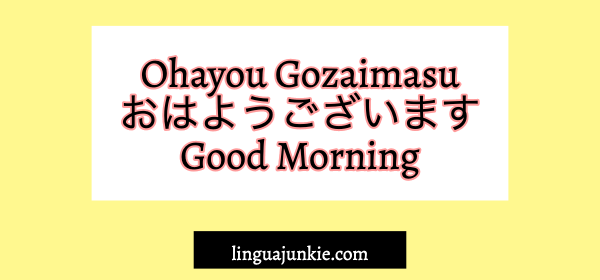
This is a good Japanese greeting to know. So, if you’re entering a hotel, a shop or some other place in the morning, you can say this first. Use this before 11AM.
Now, what about evening?
3. Konbanwa こんばんは Good evening

Feel free to use this Japanese greeting after 6PM or so.
4. Hai はい Yes, いいえ iie No
These are just basic words you and every one should know.

If you’re curious, you can learn more ways to say yes in Japanese here , and more ways to say no in Japanese here . But, as a traveler, “hai” and “iie” are good enough.
5. Arigatou Gozaimasu. ありがとうございます Thank you very much
You’ll likely want to say thank you to shop staff, airline staff or a water at a restaurant.
So, just say “Arigatou Gozaimasu.” This is pronounced “a-ree-ga-to go-zay-mas”.
You can also check out this JapanesePod101 (they’re a Japanese learning program) audio lesson here to hear the pronunciation.
- Lesson by by JapanesePod101.com (click here for more fun lessons at JapanesePod101.com)
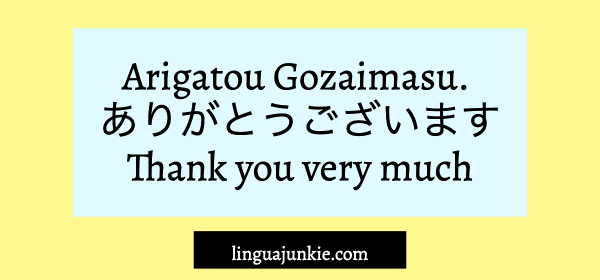
There are several ways to say thank you depending on the politeness level. Obviously, the longer, the more polite. Use “Arigatou gozaimasu” to be on the safe side.
- Thanks (super casual – only with friends)
- Thank you (casual, okay to use with most people)
- Thank you very much (polite, standard, most common way to say it – the SAFEST phrase to use)
- Thank you very much (MORE polite, because it’s in past tense).
So, these were some really basic phrases.
Now, we’re going to go from 0 to 100 and cover more complex ones.
6. Toire wa doko desu ka? トイレはどこですか? ) Where is the bathroom?
This is probably one of the most useful Japanese travel phrases.
You’ll always need the toilet, right? That’s why it’s good to know
Since Japan uses very different characters from English, it’s possible that you may not recognize the sign for the bathroom. Also, keep a look out for the high-tech toilets when visiting Japan!
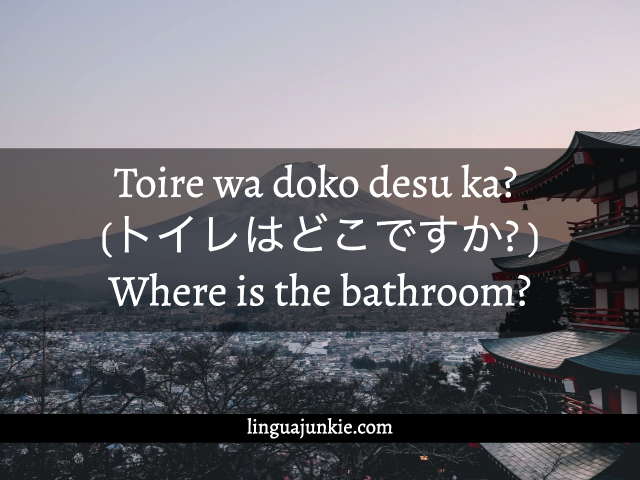
- Pronounced: Toy-re
- Doko – where
7. Ikura desu ka? いくらですか? – How much is it?
If you’re out shopping or on the street buying food, this is the perfect phrase to use. Keep in mind that Japan is a country that doesn’t haggle so there is usually a set price. If you’re lucky, some local shops might give you some extra products or food for free.
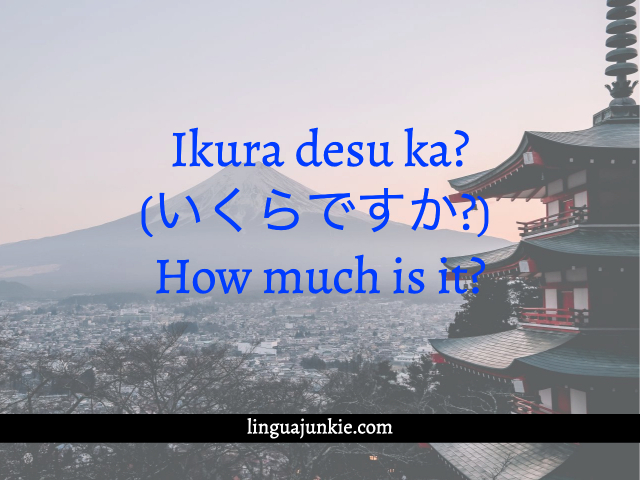
- Pronounced: ee-koo-ra
8. Betsu betsu de onegai shimasu. 別々でお願いします。) – We would like to pay separately.
When travelling as a group, it’s nice to be able to split the cost when you’re about to pay for your meal at a restaurant.This is a great phrase to use before they bring the bill.
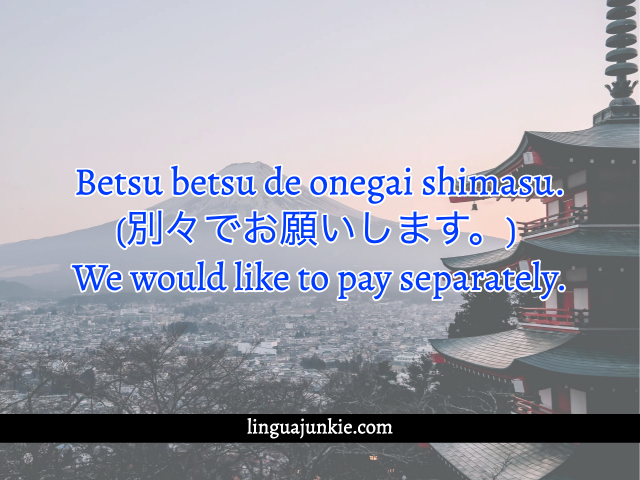
- Betsu betsu – separately
9. Sumimasen! すみません! – Excuse me! (or thank you!)
This phrase can be used for multiple purposes. It’s possible to use it to say “excuse me”, if someone is in your way or to ask a stranger a question. It also works as a “thank you”. In some cases, it’s more common to say “Sumimasen!” than to say “Arigato!”. “Sumimasen!” acknowledges someone going out of their way for you.
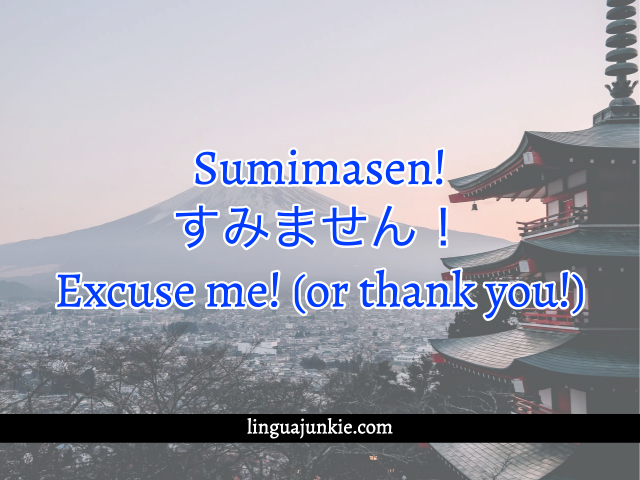
- pronounced (soo-mee-ma-sen)
10. _____wa doko desu ka? _____はどこですか? – Where is _____?
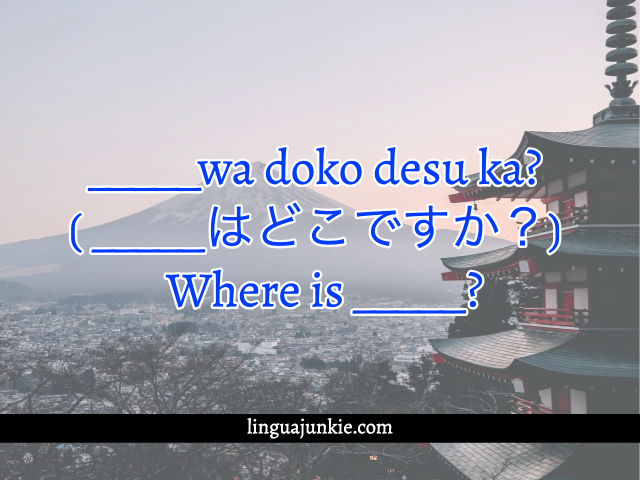
If you’re on the street trying to find a place or you get lost, simply ask this question. You can put any location in the blank part of the phrase. It could be a restaurant, landmark, or a train station.
11. _____wo kudasai. _____をください。 – I would like to have _____.
Use this phrase when asking for something. In the blank, you can add things like what you want on the menu, train tickets, or anything you might be looking to buy. Keep in mind that this phrase only works when asking for items or food, and it doesn’t work with verbs.
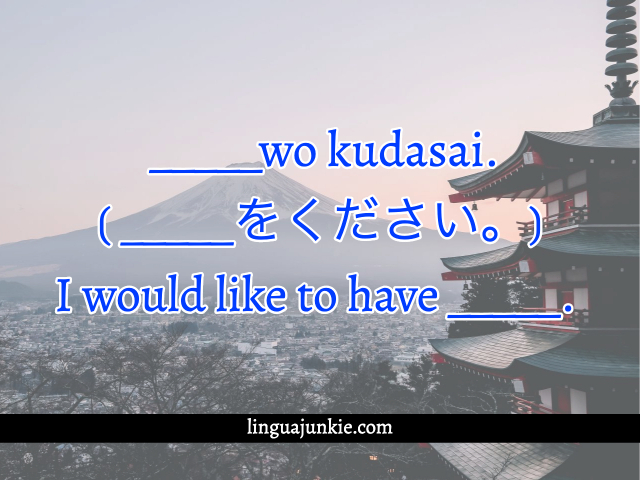
- Pronunciation: Koo-da-sai
12. Osusume wa nan desu ka? オススメはなんですか? What do you recommend?
This is useful for anyone who likes to explore food culture. If you’re confused with what to order on the menu, you can use this phrase to ask the waiter’s recommendation. It’s also useful, if you just need some advice on what is recommended. For example, if there are two trains you can take to get somewhere and you need to decide.
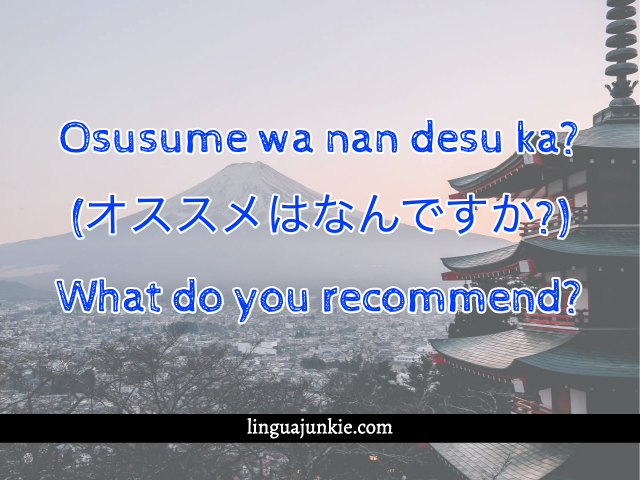
- Pronunciation: oh-soo-soo-me
13. Shashin totte moratte mo ii desu ka? 写真とってもらっても良いですか? Could you take a picture for me (or us)?
This probably the second most useful Japanese travel phrases
If you’re at a beautiful landmark, you might want a picture as a keepsake. Use this phrase to ask a stranger to take a picture for you. Taking pictures is a big part of Japanese culture so someone will definitely help you out.
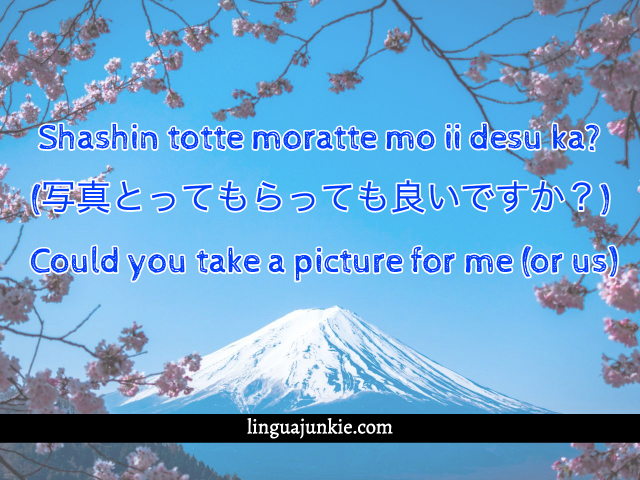
- shashin – picture
14. Yoyaku ga arimasu. 予約があります。I have a reservation.
This phrase can be used if you’ve made a reservation for a restaurant or any other kind of service. They’ll usually need to check your confirmation number or name to verify your reservation.
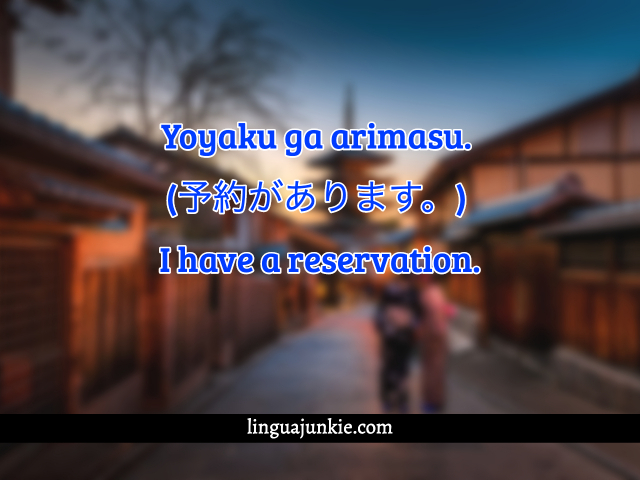
- Yoyaku – reservation
15. Chizu o kudasai. 地図をください。 Could I have a map?
The train and metro lines in the big cities of Japan can be crazy. Use this phrase if you want to have a train or metro map. It’s also useful if you’re in need of a map at a landmark, museum, or other location.

- Chizu – map
16. Takushii noriba wa dokodesuka? タクシー乗り場はどこですか? Where can I grab a taxi?
There are often designated locations that taxi’s can be picked up in Japan. They’re usually in front of airports, train stations and in busy city centers. If you see taxis parked one after another and try to approach one of them, they’ll refuse you because you’ve come across a taxi line, and somewhere at the front is a taxi stand. So, you’ll have to find it. Or you can ask someone using this phrase. That being said, you can always wave down a cab.
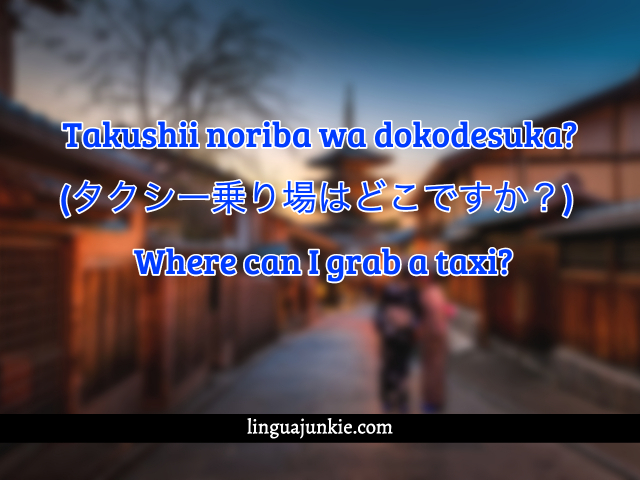
- Takushii – taxi
- Noriba – Taxi stand
17. Okaikei onegaishimasu お会計お願いします。 Could I have the bill?
This phrase is useful if you’re at a restaurant and want to get the bill. In Japan, depending on the restaurant, they have many small dishes that they will need to calculate for you.
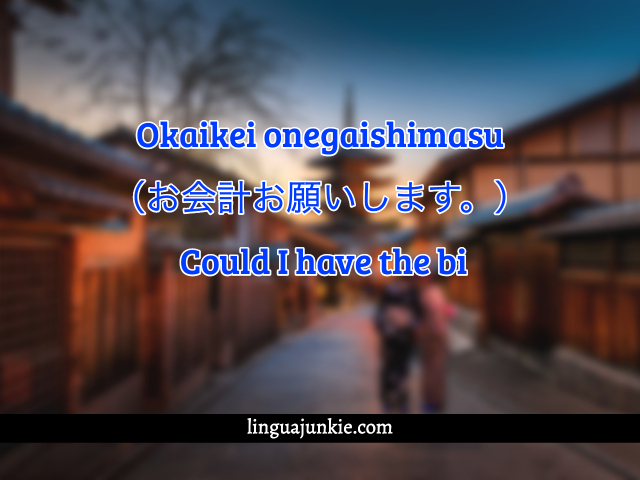
- Kaikei – bill/check
18. Eigo shaberemasuka? 英語喋れますか? Can you speak English?
Even if you’re trying to practice your Japanese, it might be necessary to speak in English if you get confused. Ask this phrase to see if the other person can speak with you in English. These days, it’s common that many shops or train stations will have English speaking representatives.
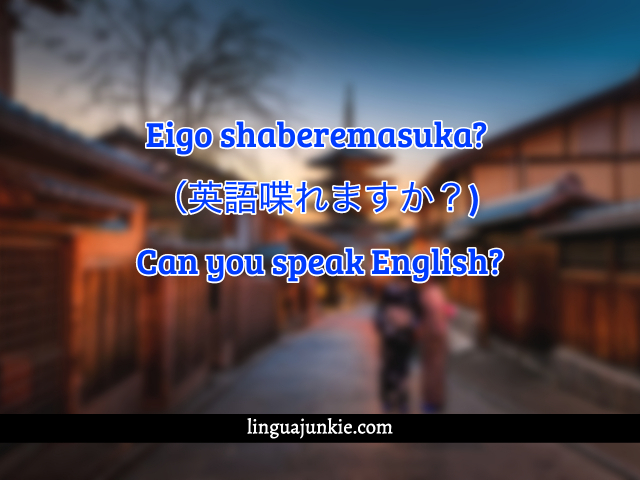
- Eigo – English
19. Shichaku shite mo ii desu ka? 試着しても良いですか? Can I try this on?
This is a useful phrase for clothes shopping. Clothing shop assistants are usually very attentive in Japan. It’s important to keep in mind that it can be considered rude if you end up not buying anything after trying on lots of clothes.

- Shichaku – try on
20. Wai fai wa arimasu ka? ワイファイはありますか?Do you have Wifi?
Internet connection is important to navigate an unknown city or to stay connected with friends and family. Ask this phrase to check if a place has any Wi-Fi connection. Convenience stores and train stations will usually have free Wifi!

- Wai Fai – WiFi
21. Kaado uketsuke masuka? カード受け付けますか? Can I use card payment?
It’s important to check if a restaurant accepts credit cards in Japan. In some restaurants, it is possible that it would be cash only.
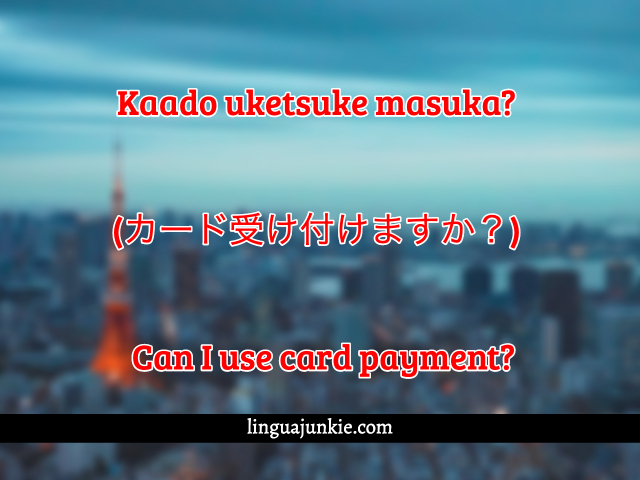
- Kaado – (credit) card
22. _____no arerugii ga arimasu. ______のアレルギーがあります。I have an allergy to ______.
If you have any allergies it’s essential to learn this phrase. It’s also recommended to learn the names of the specific allergens in Japanese. These days, many restaurants in Japan are very sensitive to food allergies. They will have a chart with all of the menu items and the common food allergens in each dish.
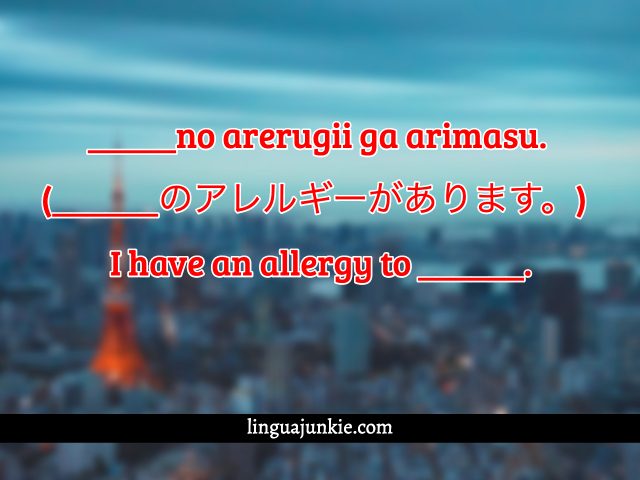
- Arerugii – allergy
23. Menyuu, onegai shimasu. メニュー、お願いします。Menu Please.
Here’s one of the more easier Japanese travel phrases.
Menu in Japanese is… “menyuu.” Yes, it sounds pretty much the same. So if you’re at a restaurant and need a menu, you won’t go wrong.
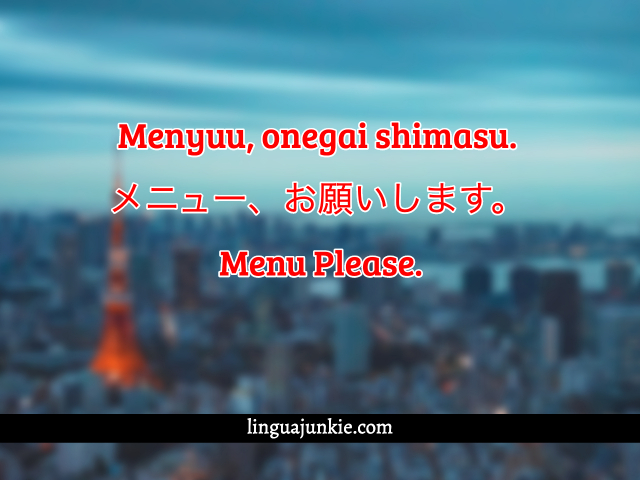
- Menyuu – menu
24. Kore wo kudasai. これをください。 This please.
This another one of the most useful Japanese travel phrases.
It’s likely you’ll go shopping and want something out of reach. So, you can point to the object and say “kore wo kudasai” and the shop staff will help you out. You can also use this phrase while pointing at a menu – in case you can’t read it and are going by pictures.

- Kore – this
- Kudasai – please
25. Mizu, onegai shimasu. 水、お願いします。Water, please.
What if you’re at a restaurant and need water?
Or, what if you’re feeling dehydrated? Remember the word “mee-zoo” meaning water. You can tell this to a waiter, a bartender, or whoever can provide you with water.
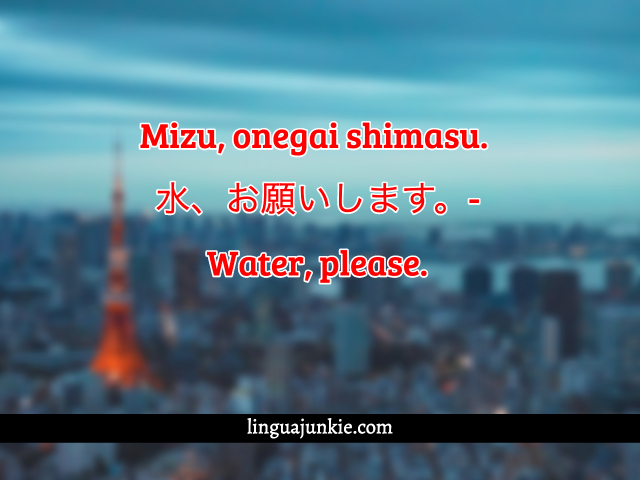
- Mizu – Water
Now you know a whole bunch of Japanese travel words and phrases.
Also, if you want to learn some beautiful Japanese words, then check my other post here .
Do you know any other Japanese travel phrases?
Leave a comment below.
The Main Lingua Junkie
[…] Japanese Travel Phrases […]

73+ Essential Japanese Travel Phrases for Tourists Visiting Japan & Free cheat sheet
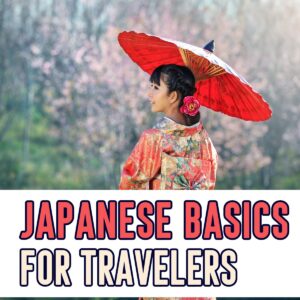
Disclosure: This essential Japanese travel phrases for tourists article may contain affiliate links. If you click it and buy something you like, I’ll earn a small commission at no extra cost to you. Thank you! Read more in Disclaimer .
Going to Japan? Searching for essential Japanese travel phrases for tourists ? Look no further! When in Japan, being familiar with common Japanese phrases for tourists will be beyond helpful! Trust me! I have been to Japan and knowing basic Japanese phrases helped me to enjoy exploring the vibrant streets of Tokyo , serene temples of Kyoto , or the natural beauty of Mount Fuji during sakura.
Before you travel to the land of the rising Sun, learn Japanese travel phrases which will help to order ramen, and to deepen your understanding of Japanese culture and their way of life. Curious, what are some common phrases I need to learn before my trip to Japan ?
🥘 If you have been wondering “What is Anja’s favorite Japanese food?”, you will find the answer hidden in the blog.

Japan is one of the most sought-after and visited countries in Asia, known for its fascinating blend of tradition and modernity, breathtaking landscapes, and renowned cuisine. Especially popular in Spring at sakura or in Autumn for fall foliage. There are people in Japan, who speak English. But it is not as common as you would think. Thus, japanese phrases to know when traveling will come in handy. By knowing basic Japanese words you will also be able to show respect to the locals. In this common travel phrases Japanese language guide , you are going to find useful phrases in Japanese for tourists. From typical Japanese phrases for greetings, Japanese hotel phrases and Japanese words for simple conversation. Inside the post you will also find a FREE Japanese travel phrases pdf , that you can download and bring with you to Japan. Let’s begin your Japanese adventure by learning essential Japanese phrases for travel .
for ESSENTIAL TRAVEL PHRASES: • 73+ Essential ENGLISH Travel Phrases and Words You Should Know • 73+ Essential ARABIC Travel Phrases for Tourists in Arab Countries & Free PDF • 73+ Essential GREEK Travel Phrases for Tourists on a Greek Holiday & Download • 73+ Essential JAPANESE Travel Phrases for Tourists Visiting Japan & Free cheat sheet • 73+ Essential SLOVENIAN Travel Phrases for your trip to Slovenia & Free Download • 73+ Essential SWAHILI Travel Phrases for Travelers to East Africa + Free Download for WORDS & PHRASES in 101 different languages: • How to say You have beautiful eyes in 101 different languages • How to say What is the WiFi password in 101 different languages • How to say Hello in 101 different languages spoken around the World • How to say Love in 101 different languages spoken around the World • How to say I love you in 101 different languages spoken around the World • How to say Thank you in 101 different languages spoken around the World • How to say Happy Birthday in 101 different languages spoken In the World • How to say Happy New Year in 101 different languages spoken around the World • How to say Friend in 101 different languages spoken around the World with Pronunciation
for general JAPAN TRAVEL TIPS: • GET OVER JET LAG WITH THESE 19 EASY-TO-FOLLOW TIPS • ULTIMATE TRAVELER SAFETY GUIDE: WHAT TO DO DURING AN EARTHQUAKE for JAPAN TIPS: • Ultimate List of 23 Best Apps for Travel to Japan • JAPAN COST OF TRAVEL AND DETAILED BUDGET BREAKDOWN • HOW TO SPEND SEVENTEEN DAYS IN JAPAN: FIRST TIME ITINERARY • 73+ Essential Japanese Travel Phrases for Tourists Visiting Japan & Free cheat sheet for best TOURS IN JAPAN: • TOP 5 RAMEN TOURS IN TOKYO TO UNLOCK YOUR TASTEBUDS • 10 STUNNING JAPAN CHERRY BLOSSOM TOURS THAT YOU WILL ABSOLUTELY LOVE for INSTAGRAM CAPTIONS about JAPAN: • 55 BEST KYOTO CAPTIONS FOR INSTAGRAM – GOLDEN AND KAWAII • 55 BEST TOKYO CAPTIONS FOR INSTAGRAM – KAWAII AND CUTE • 73 Best Ramen Captions for Instagram – Delicious Like Broth • 87 Simplistic Cherry Blossom Captions for Sakura – Sweet and Dreamy • 135 Best Japan Captions for Instagram – Puns, Quotes, Riddles & Jokes
Table of Contents
📌 Don’t have time for a quiz now? Pin i t for later!
Don’t have time to read now? Pin it for later!
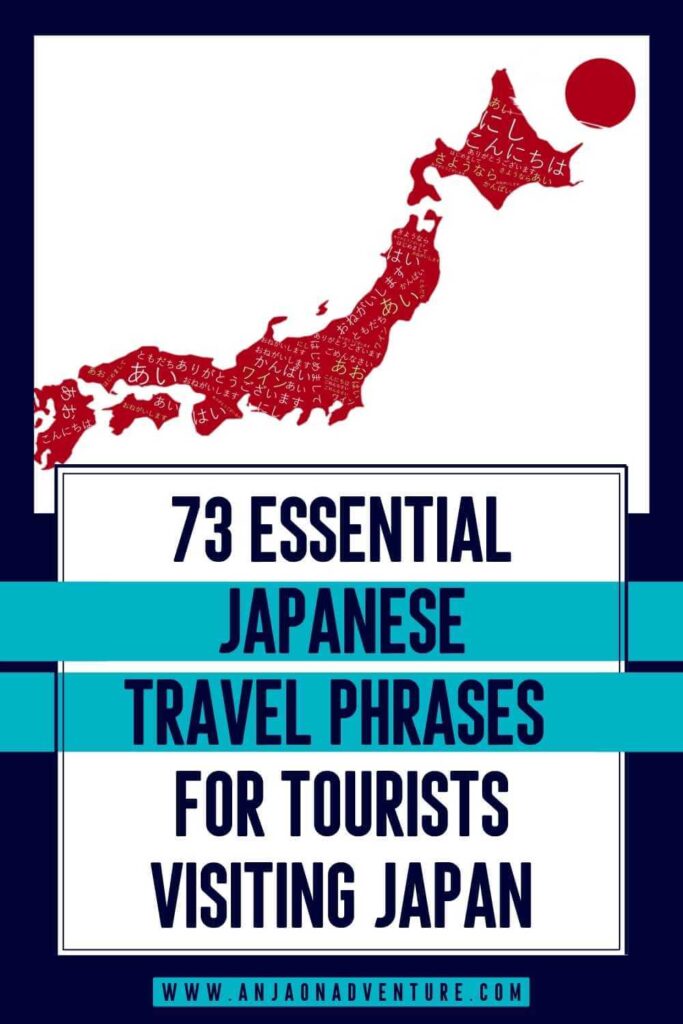
1. Where is Japanese spoken?
Did you know that more than 125 million people speak Japanese? Japanese is primarily spoken in Japan. It is the official language of Japan and is spoken by the majority of the population there. Due to globalization and the popularity of Japanese culture, Japanese is studied and spoken by learners in many countries worldwide. There are Japanese-speaking communities in countries around the world, particularly in the United States, Brazil, Canada, Australia, and the Philippines. The best way to learn Japanese for travel is by using apps like Duolingo or Memrise. If your Japan itinerary is longer than 2 weeks, maybe sign up for a language course. To master the basic Japanese phrases for conversation the best way would be going on a language exchange but if you don’t have time, just download Japanese cheat sheet in this blog post.

2. Japanese language basics: alphabet and pronunciation
Before you start learning common Japanese phrases for tourists, you have to familiarize yourself with the basics of the Japanese language . The Japanese writing system consists of three alphabets: Hiragana, Katakana, and Kanji . Hiragana and Katakana are native to Japan. They both use 46 characters , each representing one syllable and a specific phonetic sound . Hiragana is used for native Japanese words and Katakana for words borrowed from foreign languages. Kanji is a writing system borrowed from China, where each ideogram stands for a certain meaning and can have multiple pronunciations. Don’t get scared, let me tell you that Japanese alphabet has fewer letters than English alphabet, 21 in total. It uses the same sounds that you use in the English language. Each character represents a specific sound , and once you grasp the sounds, you will be able to read and pronounce Japanese with ease. Below you will find a guide for Hiragana and Katakana symbols and a similar sound in English language.
Pinning is winning and sharing is caring! What are you choosing?
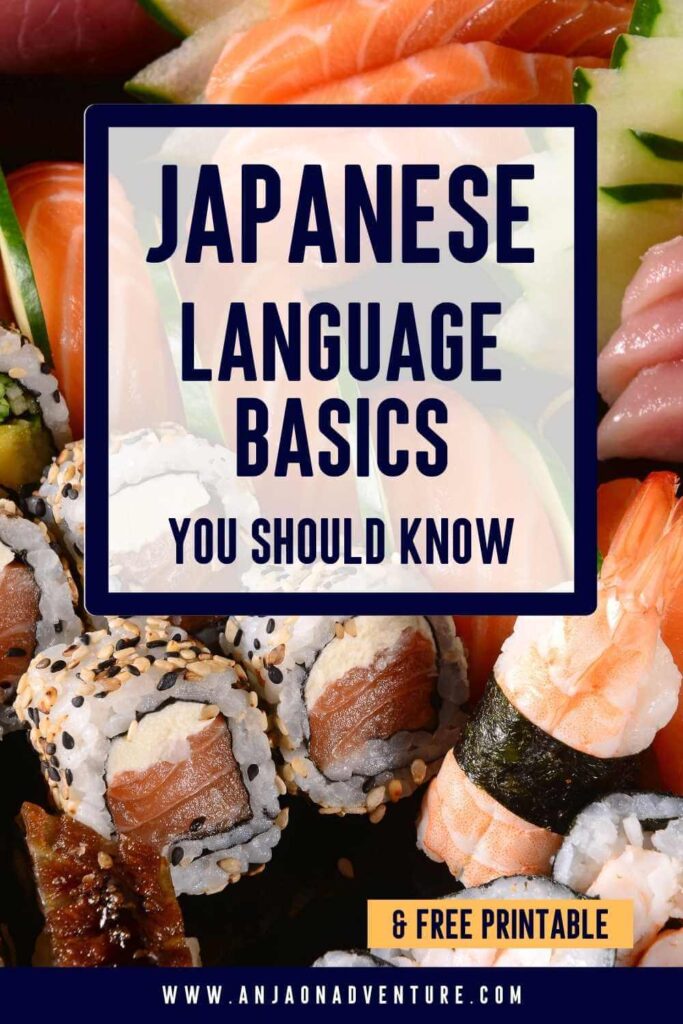
3. Essential Japanese travel phrases
3.1. basic japanese phrases for travelers.
Basic Japanese phrases for conversation that showcase politeness and cultural respect, encouraging positive interactions with locals and are a base for every communication. Those are basic phrases to know when visiting Japan.
ALSO READ: • HOW TO SPEND SEVENTEEN DAYS IN JAPAN: FIRST TIME ITINERARY

3.2. Essential Japanese phrases for greetings and introductions
Japanese words and phrases for greetings lay the foundation for any interaction, allowing you to initiate conversations and make a positive first impression. They are easy Japanese words to learn.
ALSO READ: • How to say You have beautiful eyes in 101 different languages around the World
3.3. Essential Japanese travel phrases for directions and getting around
Japanese travel phrases when asking for directions will enable you to navigate unfamiliar streets and find your way around.
ALSO READ: • Japan Cost of Travel and Detailed Budget Breakdown
3.4. Useful Japanese phrases for tourists when ordering food and drinks
Japanese language phrases for ordering meals, asking for recommendations, and specifying dietary preferences ensure enjoyable dining experiences and help you explore local cuisines.

3.5. Essential phrases in Japanese for shopping
Japanese basics terms for inquiring about prices, negotiating, and Japan tourist phrases for asking for sizes or colors are handy when exploring markets and boutiques.
ALSO READ: • Ultimate List of 23 Best Apps for Travel to Japan
🥘 “What is Anja’s favorite Japanese food?” It is ramen. I love ramen and could eat it every day.
3.6. Useful Japanese hotel phrases
Japanese language words and hotel phrases you will need when checking in a hotel, asking for towels, fixing air conditioning, enquiring what time is breakfast, and what is included in your room rate.
ALSO READ: • How to say Thank you in 101 different languages in the World
3.7. Survival Japanese phrases and Japanese travel terms in case of emergencies
Here you will find helpful Japanese travel terms in case of emergencies, natural disasters, or if you will be needing assistance in difficult or dangerous situations.
ALSO READ: • Best Japan Captions for Instagram – Puns, Quotes, Riddles & Jokes
3.8. Beyond tourist Japanese phrases
If you’re like me and really love learning a few phrases in new languages, expand your study beyond the essential travel phrases . I always learn how to say please and thank you, never visit a country without knowing the local word for “coffee” and never leave without knowing how to say;

4. Best language App for traveling abroad
Learning a language is a long process. If you think you won’t have time to learn basic Japanese phrases , or if the situations come your way when above mentioned Japanese travel phrases won’t be enough, use Google Translate. This is my favorite language app, that I use on (almost) every trip.
4.1. Google Translate
Google Translate is the most popular language travel app that can be used everywhere. I personally use it on all my travels, when going to Tanzania to learn what some Swahili words mean, when in Mexico to help with my not-the-best Spanish, when in Italy, in Japan and other places. I’m sure you are familiar with the language app already. The most obvious feature is it will help you translate the destination language into your own one. But the absolute best feature is that it can translate the text using ‘ camera translation ’. All you have to do is open the app, point your camera toward the text in a foreign language and Google Translate will do the rest. Perfect for menus! It also translates text from the photos on your camera roll. And it also works offline, when you download the language pair on your phone. Language: 133 languages Download: iOS | Android | Website Price: Free
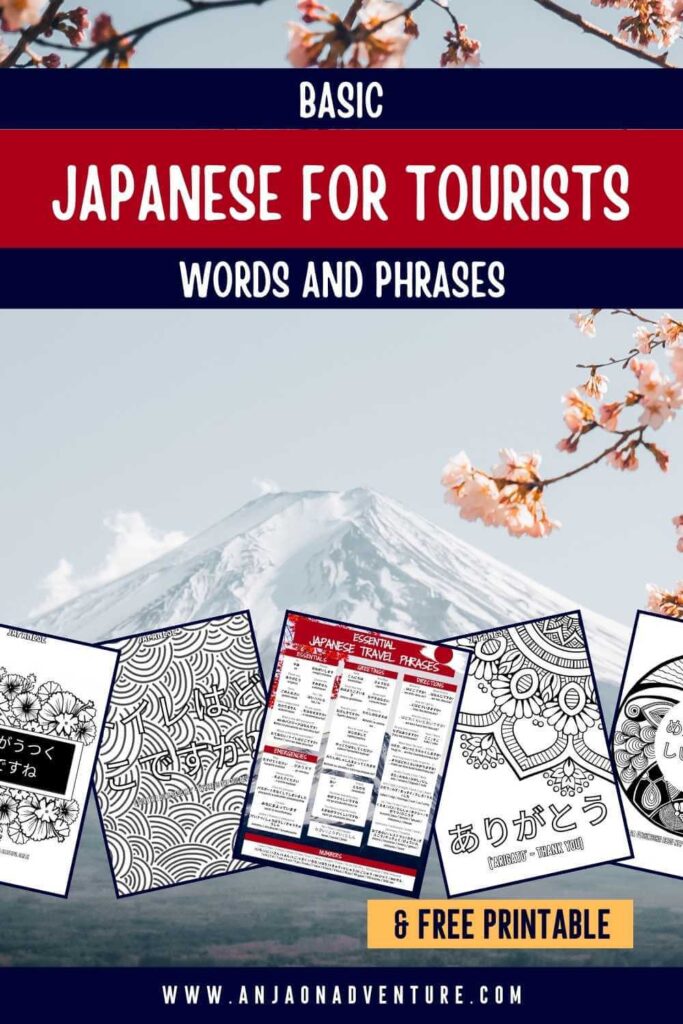
5. Final Thoughts on Essential Japanese Travel Phrases for Tourists
Whether it’s a warm greeting, ordering a meal, or expressing gratitude, this travel japanese guide and Japanese for tourists not only open doors to easier communication, but also show respect and will help you to understand Japanese culture in a different way. Before traveling to Nippon, learn Japanese words for tourists that will help you to navigate through this modern but culturally entwined land, full of history, sushis, shrines, and geishas. How to say Hello in Japanese and how to say thank you in Japanese language. Basic Japanese phrases for directions, ordering food, and checking in a hotel. And don’t forget to download Japanese travel cheat sheet . Which of these must know Japanese phrases for travel have you managed to memorize so far? Let me know in the comments! Safe travels = 安全な旅行 [anzen’na ryokō], Anja
➤ What you should read next …
• How to spend 17 days in Japan • Japan Cost of Travel and Detailed Budget Breakdown • Ultimate List of 23 Best Apps for Travel to Japan • 135 Best Japan Captions for Instagram – Puns, Quotes, Riddles & Jokes • How to say Hello in 101 different languages
📌 Lik e it? Pin it!

✈ Travel like a PRO
Are you ready to travel like a PRO? Save time and money with these travel tips and resources . I personally use these companies to save time and money. They do the work by providing a list of options, prices, and reviews from actual guests, for anywhere I am traveling worldwide. ✈️ FLIGHTS: I use Skyscanner in combination with Google Flights to find amazing flight fares (try the Explore feature). I book directly with an airline or pair it with Iwantthatflight for the best deals. 🏨 ACCOMMODATION: Booking.com is my favorite site for finding great hotel deals. They return the best rates and reviews are from actual guests! 🚘 RENTAL CARS: Discover Cars are my go-to, when planning an epic road trip. 🗽 TOURS & ACTIVITIES: I like to wander around on my own, but when I want to explore with a group, skip the line with an entrance ticket, I book it with GetYourGuide or Viator . ❤️🩹 TRAVEL INSURANCE: I never, under any circumstances travel without insurance. In most cases, I use yearly global travel medical insurance. But, if you don’t have that and some impromptu travel plans occur, use SafetyWing . With them, you can buy travel insurance even when you are already abroad. Better be safe, than sorry! 📲 ONLINE SAFETY: NordVPN keeps your devices’ browsing safe and malware-free. Stream shows from around the world, access social media in countries where they are blocked and buy cheap flights by changing your virtual location. 🛜 STAY CONNECTED WITH eSIM: Ditch the plastic SIM cards and waiting in lines at the airport! Airalo eSIMs allow you to connect as soon as you land at your destination. They have eSIMs for over 190+ countries worldwide.
Where is Japanese spoken?
Japanese is an official language in Japan. There are some Japanese-speaking communities in various other countries around the world, like the United States, Brazil, Canada and Australia.
How to say Good Morning in Japanese?
おはようございます pronounced as “ohayou gozaimasu” Learn basic Japanese words and quick Japanese phrases easy on Anja On Adventure blog. Here you can also FREE DOWNLOAD Japanese phrases for travelers pdf and key Japanese phrases for tourists.
How to say Thank you in Japanese?
Thank you in Japanese is ありがとうございます, which is pronounced as “ arigatou gozaimasu”. Learn more Japanese language basics and easy Japanese phrases for tourists on Anja On Adventure blog. Here you can also FREE DOWNLOAD basic Japanese travel phrases pdf and coloring pages with Japanese words.
How to say Hello in Japanese?
こんにちは pronounced as “konnichiwa” Learn basic Japanese for tourists and important Japanese phrases for travel on Anja On Adventure blog. Here you can also FREE DOWNLOAD Japanese for travelers pdf and Japan basic words.
How to say My name is in Japanese?
わたしのなまえは …, pronounced as “ Watashi no namae wa …”. Learn Japan travel phrases and top Japanese phrases for tourists on Anja On Adventure blog. Here you can also FREE DOWNLOAD basic Japanese words pdf and Japanese phrases while travelling Japan.
How to say How are you in Japanese?
おげんきですか? , pronounced as “ Ogenki desu ka?” Learn more Japanese phrases to know and basic Japanese phrases for tourists on Anja On Adventure blog. Here you can also FREE DOWNLOAD Japanese phrase cheat sheet pdf and useful kanji for tourists.
How do you say Hi in Japanese?
Hi in Japanese language is やあ , pronounced as “ya”. Learn learn basic Japanese for travel and Japanese phrases for travelling on Anja On Adventure blog. Here you can also FREE DOWNLOAD japanese cheat sheet tourist pdf and Japan phrases for travelers.
❥ About Anja On Adventure

Anja On Adventure is a travel blog, a collection of insider tips and information on destinations, that I visited as a solo female traveler, tour guide, teacher, yacht stewardess, and Survivor challenge tester. Anja, is a thirty-something adventure-seeking, sun chasing, beach hopping, gin-loving, tropics enthusiast with a creative mind and sarcastic spirit, who loves coconut and mango but doesn’t like chocolate and sweets. I am passionate about all things travel, maps, and puzzles. Click here to learn more About me .
About the author: Anja
21 Essential Japanese Travel Phrases

Are you planning a trip to Japan soon?
Worried you won’t have time to learn Japanese before you go? While learning Japanese might seem daunting, rest assured that you can get by on your trip with the Japanese travel phrases below, along with hand motions and a lot of bowing. You might run into people who speak English, especially in cities like Tokyo, but don’t count on it. Using Japanese, even if it’s only to say “please” or “thank you”, goes a long way–people will appreciate your efforts.
Essential Japanese Travel Phrases
The following Japanese travel phrases and words will get you through almost any situation in Japan. This list isn’t all-inclusive, but in my experience you will use these the most.
1. ありがとうございます ( arigatou gozaimasu )
Useful in many situations. You’ll find yourself saying this one often.
2. お願いします ( onegaishimasu )
Use when ordering food, asking for something or requesting help.
3. すみません ( sumimasen )
If you bump into someone or want to get someone’s attention, such as a waiter or hotel staff or a stranger on the street, say “ sumimasen” . You will probably use this phrase and “ hai ” the most in Japan.
4. はい ( hai )
Saying yes can also mean “I understand”.
5. いいえ ( iie )
6. ごめんなさい ( gomen nasai ).
Sumimasen will help you in most situations, but if you do something more serious, like roll over someone’s foot with your suitcase, you should say “ gomen nasai ” while bowing repeatedly. After apologizing, ask if they are all right by saying, “ daijoubu desu ka? ”
7. わかりません ( wakarimasen )
I don’t understand.
If you don’t understand what someone is saying to you, use “ wakarimasen “.
8. 日本語がわかりません ( nihongo ga wakarimasen )
I don’t understand Japanese.
If someone is speaking to you and you have no idea why, or if you are trying to do something, at a hotel, for example, use this phrase.
9. 英語を話せますか? ( eigo o hanasemasu ka? )
Can you speak English?
Alternatively, you can ask “ eigo ii desu ka ?” or “ eigo OK ?” and this usually gets the message across.
10. もう一度お願いします ( mou ichido onegai shimasu )
Could you repeat that, please?
Don’t be surprised if you say this and the person says something completely different than they did the first time. In my experience, asking someone to say something slowly doesn’t work. They usually try to rephrase in simpler Japanese and use hand motions. So, try asking them to repeat it, and hope for the best.
11. _______ はどこですか?( ______ wa doko desu ka? )
Where is _____ ?
For example, you can ask, “where is the train station?” by saying “ eki wa doko desu ka? ”
Fill in the blank with whatever place you are trying to find:
- police station = 交番 ( kouban )
- convenience store = コンビニ ( konbini )
- hotel = ホテル ( hoteru )
- bathroom / toilet = トイレ ( toire )
お手洗い ( otearai ) is another word for bathroom or toilet, but it isn’t used everywhere, although you will see it in kanji in some places to indicate the bathroom.
12. いくらですか? ( ikura desu ka? )
How much is it?
You can also say “ sore wa ikura desu ka ” for “how much is that?” when pointing at something near the other person. When pointing at something close to you, say “ kore wa ikura desu ka ” for “how much is this?”
13. ______ はありますか? ( ______ wa arimasu ka? )
Do you have ______?
14. ごちそうさまでした ( gochisousama deshita )
Thank you for the meal.
This phrase is polite and used after a meal if you’re eating at a place that requires you to turn in your dishes, such as in a cafeteria, or when visiting someone’s home.
15. どこでインターネットを使えますか? ( doko de intaanetto o tsukaemasu ka? )
Where can I use the internet?
16. いらない ( iranai )
I don’t need it.
When shopping, you might be asked if you want a ふくろ ( fukuro , bag). If you don’t need one, say “いらない .”
Phrases You Might Hear
While some of the Japanese travel phrases below are good to know how to say, you should try to become familiar with them.
17. いらっしゃいませ ( irasshaimase ) or いらっしゃい ( irasshai )
When entering any store, restaurant or shop at least one voice, if not a chorus, will enthusiastically call out “irasshaimase!”
18. 店内でお召し上がりですか? ( tennai de omeshiagari desu ka )
Will you be eating here?
When ordering at a place that also offers takeout, someone might ask you if you plan to eat there (they also might rephrase as koko de if they sense you don’t understand). Answer “hai” if you are, or “omochikaeri” if you want takeout.
19. お持ち帰りですか? ( omochikaeri desu ka )
Is this takeout?
As I wrote under number 18, you might be asked this when ordering at a place that does takeout. Answer “yes” if takeout, or “iie” if you plan to eat there.
20. 喫煙ですか ( kitsuen desu ka ) or 禁煙ですか ( kinen desu ka )?
Smoking or Non-Smoking?
Although the majority of Japan’s restaurants allow smoking, some are separated, family restaurants in particular. Simply state which you prefer: kinen desu for non-smoking or kitsuen desu for smoking.
21. 大丈夫ですか?( daijoubu desu ka ) or 大丈夫 ( daijoubu )?
Are you OK?
If you trip, fall, run into something, or look lost, chances are someone will ask if you are all right by using 大丈夫.” If you’re fine, answer “大丈夫です.” Or, if you are lost or confused, ask your question.
Not yet a member?
Create an account with Grasshopper Adventures today, receive updates, gift rewards...
- 1-844-874-3720
- Free Catalog
- WAYS TO SAVE
- Request Catalog
Home > Articles
23 basic japanese phrases for your next vacation to japan.
By Lirene Cilliers Posted 15th Aug 2023
Just as the Land of the Rising Sun beckons with mysteries waiting to be unraveled, diving into the Japanese language can feel like entering a maze blindfolded. However, amidst these linguistic twists and turns lies an opportunity to savor the magic that unfolds in every conversation, every shared smile, and every unforgettable encounter. In this article, we’ll share 23 common Japanese phrases that will help you navigate your journey with confidence, whether you're planning a vacation or going on a cycle tour in Japan .
“But do I need to speak Japanese to visit Japan?”
In short, no, you don't. However, learning a few common Japanese phrases is like adding that extra layer of flavor to your adventure sundae—not essential, but oh, what a delightful difference it makes!
Rest assured, if you book one of our guided cycling tours , our friendly local guides have your back to bridge any language gap.
Our guests on our Stunning Shikoku Bike Tour of Japan share smiles with welcoming locals.
The Basics: Common Japanese Words and Phrases
1. Hello - Konnichiwa (こんにちは) Pronunciation: kohn-nee-chee-wah People in Japan greet one another with a bow. A bow can range from a modest nod of the head to a deep waist bend. A deeper, longer bow shows respect, while a short nod of the head is casual and informal. 2. Thank you - Arigatou Gozaimasu (ありがとうございます) Pronunciation: ah-ree-gah-toh goh-zah-ee-mahs 3. Please - kudasai (ください) Pronunciation: koo-dah-sigh 4. Excuse me/ I'm sorry - Sumimasen (すみません) Pronunciation: soo-mee-mah-sen This versatile phrase can mean "Excuse me," "I'm sorry," or be used to express your gratitude or start a conversation. Whether you're catching someone's attention in a busy train station or apologizing for a minor inconvenience, "Sumimasen" is your go-to phrase for maintaining the harmony of your interactions. 5. Yes - Hai (はい) Pronunciation: hi 6. No - Īe (いいえ) Pronunciation: ee-eh 7. Nice to meet you - Hajimemashite (はじめまして) Pronunciation: hah-jee-meh-mah-shee-teh 8. Goodbye - Sayōnara (さようなら) Pronunciation: sah-yoh-nah-rah 9. Beautiful - Utsukushii (美しい () Pronunciation: oo-tsoo-koo-shee This word carries some weight, is often reserved for describing nature, and is not tossed around lightly. So, save this word for those extra breathtaking moments!
Embrace the ' utsukushii ' on our Stunning Shikoku Bike Tour of Japan! An island of unimaginable natural beauty, epic coastal rides, verdant river valleys, and remote villages.
A quick pit stop to savor the flavors of Japan at a traditional Japanese restaurant on a cycling vacation in Japan.
Food and Drinks: How to order and appreciate food in Japanese
10. An expression of gratitude spoken before the first bite - Itadakimasu (いただきます) Pronunciation: ee-tah-dah-kee-mahs Just as the dining experience in Japan extends beyond taste to encompass cultural rituals, "itadakimasu" is more than a mere phrase; it's a heartfelt expression of gratitude spoken before the first bite, symbolizing the humility of saying 'I humbly receive’. 11. Delicious - Oishii (美味しい) Pronunciation: oh-ee-shee 12. Wine - Wain (ワイン) Pronunciation: wah-een 13. Beer - Bīru (ビール) Pronunciation: bee-roo 14. Japanese sake - Nihonshu (日本酒) Pronunciation: nee-hohn-shoo 15. Water please - O-mizu o onegai shimasu (お水をお願いします) Pronunciation: oh-mee-zoo oh oh-neh-guy shee-mahs 16. Check, please - Okaikei onegaishimasu (お会計 お願いします) Pronunciation: oh-kai-kay oh-neh-guy shee-mahs 17. I would like ___, please - __ o Kudasai (__をください) Pronunciation: ___ oh koo-dah-sigh
Treat your palate, bask in tranquil onsens, and delve into Japan's rich culture while practicing these phrases on our Japan Bike, Walk, and Onsen Tour .
Cyclists pause for a moment of laughter with the heartwarming community in rural Japan.
Useful Japanese Phrases to Use when Shopping
18. How much is this? - Ikura desu ka? (いくらですか?) Pronunciation: ee-koo-rah deh-soo kah? 19. I'll take it - Sore o moraimasu (それをもらいます) Pronunciation: soh-reh oh moh-rah-ee-mahs
Encounters with Nara's friendly deer.
Emergencies and Assistance: How to Ask for Help in Japanese
20. Help! - Tasukete! (助けて!) Pronunciation: tah-soo-keh-teh! 21. Hospital - Byōin (病院) Pronunciation: byoh-een 22. It hurts! - Itai desu (痛いです) Pronunciation: ee-tie deh-soo
Last, But Certainly Not Least:
23. I love Japan! - Nihon daisuki (にほんだいすき) Pronunciation: nee-hohn dahy-soo-kee You're guaranteed to warm the heart of your newfound connection with this phrase. Make sure to memorize it as you'll probably be using it a lot!
Local interactions like these on a Grasshopper Adventures Bike Tour bring you the real spirit of Japan.
Overcoming Language Hurdles to Unveil Unforgettable Adventures
By diving into these simple phrases, you're connecting with the country and its people on a deeper level and unlocking doors to experiences that will etch their way into your heart.
Every "konnichiwa" you utter is a bridge that spans the cultural divide, a key that opens the treasure trove of human interaction.
Sure, you might not become a fluent speaker overnight, but that's not the goal. The goal is to weave threads of understanding and to remember that it's not the words alone that matter; it's the intentions they carry, the stories they unveil, and the connections they forge.
Go forth with courage, for Japan is waiting to embrace you .
If you enjoyed learning about the Japanese language, here are some other articles that you will love: Top 7 Foods You Must Try in Japan Navigating Hot Springs in Japan 9 Reasons to Explore Japan by E-Bike
Related Tours
Stunning shikoku bike tour of japan, cycle kyoto to the coast - self-guided, japan bike, walk & onsen.
NEWSLETTER SIGNUP
Destinations
Tour Styles
Call Us (Toll Free)
Schedule a Call
NEXT: WHY US
FEATURED IN:
© 2024 Grasshopper Adventures. All Rights Reserved.
Recommended by
30+ Basic Japanese Phrases For Tourists
This page may contain affiliate links which earn us a commission at no extra cost to you to support the site. Thank you!
Travelling to Japan and want to learn some Japanese phrases? Learn these basic Japanese phrases to help you!
Whether you’re travelling to Japan in the future or if you simply want to start learning some basic Japanese for fun, you’ve come to the right place. Japanese may seem a bit intimidating at first. The writing system, for one, is completely different from English. And let’s not get started on the complicated grammar…
But when travelling, you don’t need to become fluent! During my visits to Japan, I’ve never had any issues and I am nowhere near fluent. Plus, it’s very doable to learn some basic phrases before your trip which can help you massively. Locals will definitely appreciate it.
Make sure to learn the following Japanese phrases for tourists before you go!

To make sure the Japanese sentences below are 100% correct, I paid a professional Japanese translator to double-check them and correct any mistakes.
Useful Basic Japanese Phrases
- Hello: Konnichiwa (こんにちは)
- Good morning: Ohayō (おはよう) or ohayō gozaimas (おはようございます)
- Good evening: Konbanwa (こんばんは)
- Goodbye (when going away for a long time or not coming back): Sayōnara (さようなら)
- See you later (when saying bye to friends): Matane (またね)
- Thank you: Arigatō gozaimas (ありがとうございます)
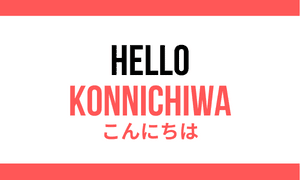
- Excuse me: Sumimasen (すみません)
- Sorry: Gomennasai (ごめんなさい)
- I don’t understand: Wakarimasen (わかりません)
- I don’t speak Japanese: Nihongo ga hanasemasen (にほんごがはなせません)
- Please (when asking for something): Onegaishimas (おねがいします)
- You’re welcome: Dōitashimashte (どういたしまして)
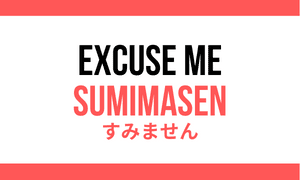
- Yes/No: Hai/iie (はい/いいえ)
- No, thank you (more polite): Kekkō des(けっこうです)
- Do you speak English?: Eigo ga hanasemas ka? (えいごがはなせます か)
- How are you?: O genki des ka (おげんきですか)
- I’m fine: Genki desu (げんきです)
- Nice to meet you: Hajimemashte (はじめまして)
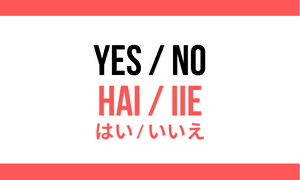
- I am [name]: [name] des ([name]です)
- Enjoy your meal (before eating): Itadakimas (いただきます)
- Thank you for the meal: Gochisōsamadeshta (ごちそうさまでした)
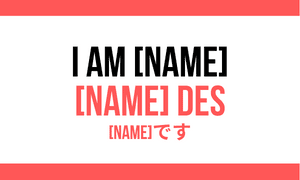
Japanese Phrases For Travelling
- How much does this cost?: Kore wa ikura des ka? (これはいくらですか?)
- What is this?: Kore wa nan des ka? (これはなんですか?)
- I would like…: … o kudasai (…をください)
- I would like… and …: … to … o kudasai (… と …をください)
- Do you have an English menu?: Eigo no menyuu wa arimas ka? (えいごのメニューはありますか?)
- Can I have the bill, please?: O kaikei onegaishimas (お かいけい おねがいします)
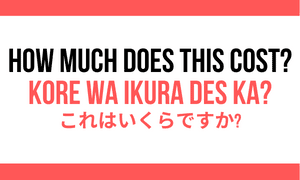
- Cheers!: Kanpai! (かんぱい!)
- Can you translate this?: Yakushite kudasai? (やくしてください?)
- Where is the toilet?: Toire wa doko des ka? (トイレはどこですか?)
- Do you accept credit card?: Kurejittokādo wa tsukaemaska?(クレジットカードはつかえますか?)
- Help! : Taskete! (たすけて!)
- This is delicious: Oishi des (おいしいです)
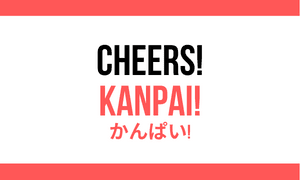
Japanese Writing System Explained
One thing that intimidates most people when they start learning Japanese is the different writing systems . Rather than English (where there is only one writing system), Japanese has three: Hiragana, Katakana and Kanji. When you are starting to learn the language, it’s best to stick with Hiragana.
Below, you can find the difference for the Japanese writing systems and what they are used for:
- Hiragana: The “round” one. Hiragana is a phonetic alphabet and is mainly used for function words and other native Japanese words that aren’t covered by Kanji. But because Kanji is very tough to learn, Hiragana is also used in children’s books and is perfect for those who are new to the language.
- Katakana: The “pointy” one. Another phonetic alphabet, but this one is used for loan words from other languages (like han-ba-ga for hamburger).
- Kanji: Kanji are Chinese characters and are used for nouns, stems of adjectives and stems of verbs. There are about 2,000 kanji characters, so it takes a long time to master them all. Often, the hiragana pronunciation is written above difficult kanji, making it a bit easier to learn/read.
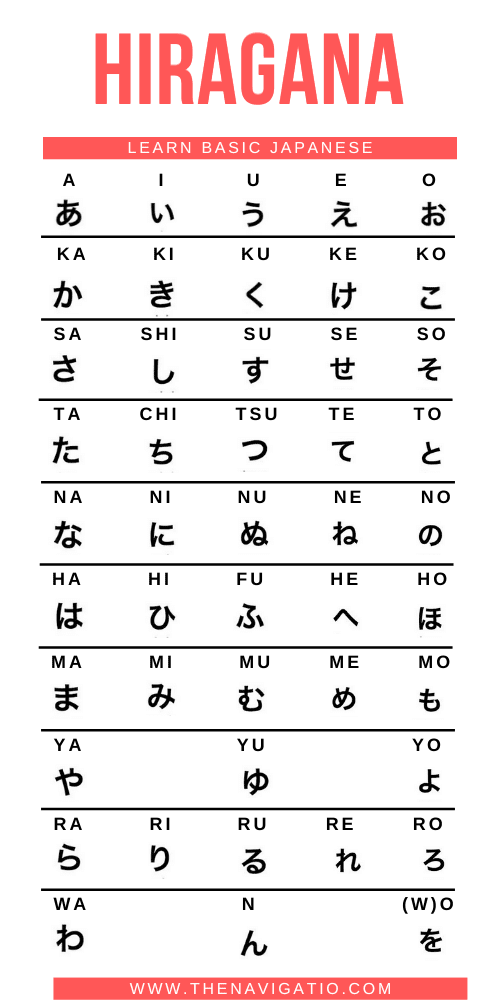
Japanese Numbers Explained
It’s also useful to know some Japanese numbers when learning Japanese.
- 1: Ichi (一)
- 4: Yon or Shi (四)
- 6: Roku (六)
- 7: Nana or Shichi (七)
- 8: Hachi (八)
- 9: Kyuu (九)
- 10: Juu (十)

Want To Learn More Japanese Phrases?
There are endless ways to learn Japanese, especially with the internet at our fingertips. I would personally recommend choosing a good textbook and sticking to the program. When studying Japanese at university, I used the books below:
You can also check out apps like Duolingo and Memrise, which can help you get started! Check out my articles on how to start learning Japanese for more info.
If you aren’t looking to learn an entire language, you can also get a Japanese phrasebook . This can help you when you are in Japan and need a phrase quickly to ask someone something. Taking one of these with you can be a huge help. I personally recommend the one from Lonely Planet.
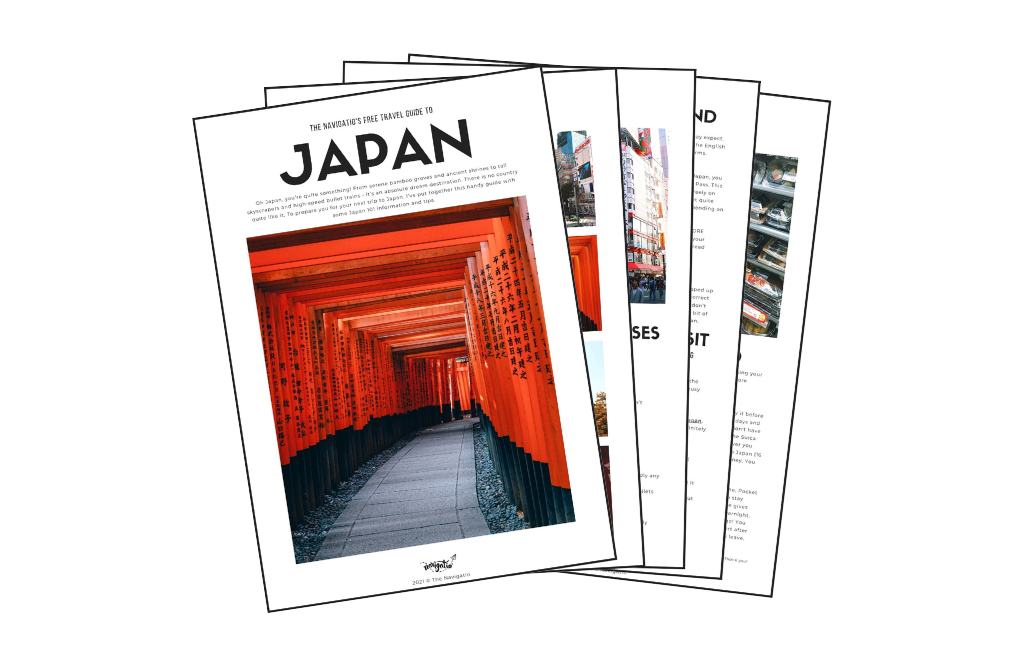
Get Your Free Japan Guide
Subscribe to get inspired! Receive insider tips, special discounts and travel stories. Plus, you’ll get a FREE downloadable Japan Travel Guide for signing up – including everything you need to know before visiting Japan!
You can unsubscribe anytime. For more details, review our Privacy Policy . (We promise not to spam!)
Almost there!
Thank you! Make sure to go to your inbox to confirm your newsletter subscription for your free Japan travel guide.
Basic Japanese Phrases For Tourists Printable
Want to keep a physical copy of these common Japanese phrases with you while travelling? You can print the following image:
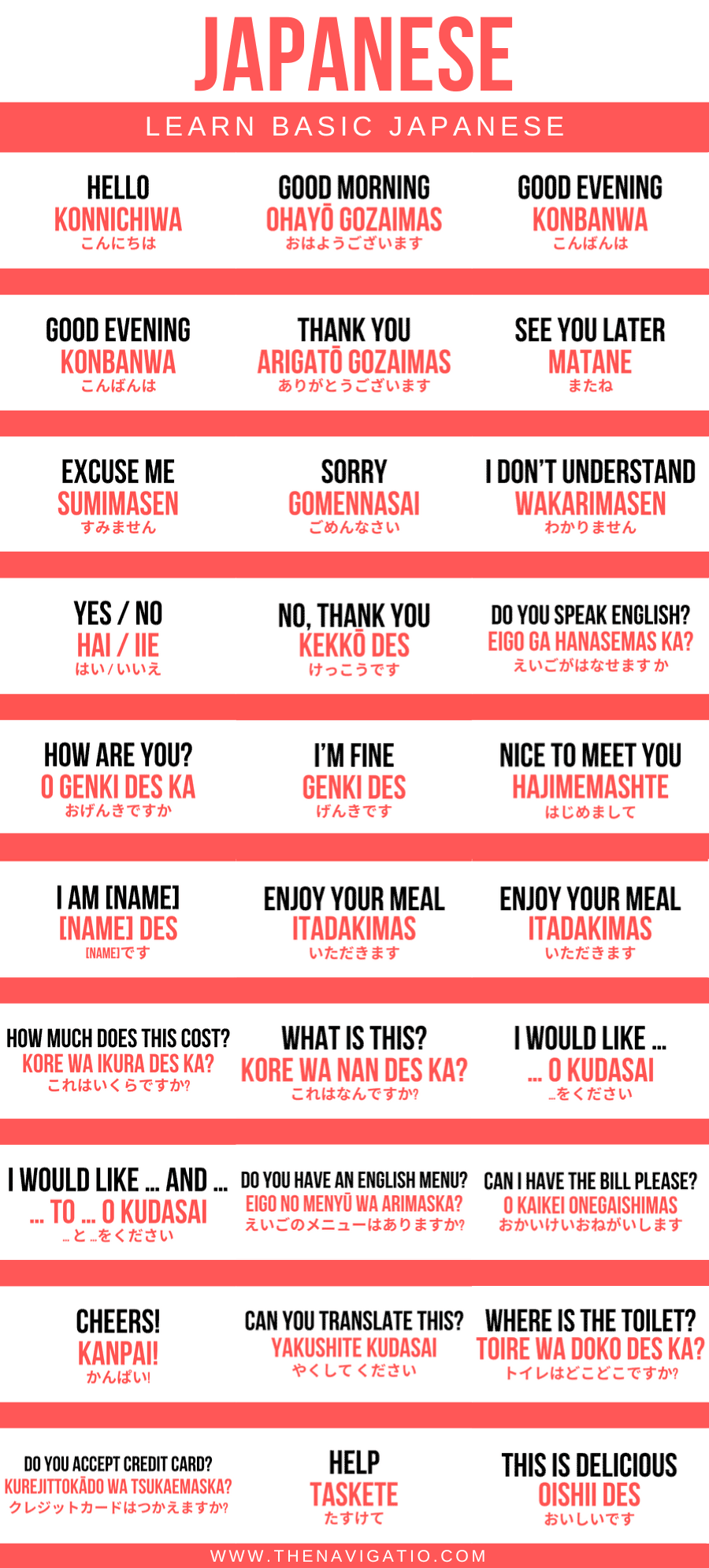
Nele (Nay-la) graduated from Manchester Metropolitan University with an English and Creative Writing Degree and has lived in the UK for nearly 10 years. She has had an interest in Japan and its culture for as long as she can remember. Since her first trip in 2018 surpassed all expectations, she has continued to return to Japan to explore more of all it has got to offer. You can read her full story here .
View all posts
2 thoughts on “30+ Basic Japanese Phrases For Tourists”
Hello! Do you think you could make study sheets for basic/everyday Kanji characters? I know there are millions of them so I was thinking just ones that are used or seen the most. Thank you for reading my comment!
That’s such a great idea! I’ll make sure to add some in the future, learning Kanji can be tough but adding some basic ones to this guide is a great idea 😀
Leave a Comment Cancel reply
This site uses Akismet to reduce spam. Learn how your comment data is processed .
Must-Read Articles

50+ Best Things To Do In Japan
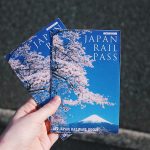
Is The Japan Rail Pass Worth it?
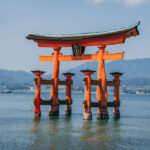
The Perfect Three Week Japan Itinerary
Japan Travel Tips Group

The Japan Travel Newsletter
Sign up to get inspired! Receive insider tips, special discounts and more to plan your perfect Japan trip.
You have successfully joined our subscriber list.
japan travel Blog
Tokyo Kyoto Osaka Hiroshima Hakone Kobe Nikko Nara Kyushu All Japan Content
Plan Your Trip
Best Things To Do Japan Rail Pass 2 Week Itinerary 3 Week Itinerary Accommodation Japanese Phrases
About The Navigatio Work With Us

- Privacy Policy
Basic Japanese Phrases for Travelers and Beginners
May 20, 2020
By Alexis Papa
Are you traveling to Japan soon? Perhaps you feel scared that you might get lost or buy the wrong item because of the language barrier? In this article, we will help you make your trip hassle-free by listing some of the basic words and phrases that you can use while in Japan.

Basic Japanese Greetings
こんにちは (konnichiwa) This means “good afternoon” or “hello”. This is the most common greeting and can be used anytime before the sun sets. おはようございます (ohayou gozaimasu) This means “good morning”. If you want to make it less formal, you can just say おはようor ohayou. こんばんは (konbanwa) This means “good evening”. さよなら (sayonara) This is the most formal way of saying “good bye” and could mean as a final goodbye. To make it more casual, you can say じゃねー (ja ne) meaning “bye”, or じゃあまたね (jaa mata ne) meaning “see you later”. おやすみなさい (oyasumi nasai) This means “good night”. To make it casual, you can say おやすみ or oyasumi. ありがとうございます (arigatou gozaimasu) This means “thank you”. To make it more polite, you may add どうも (doumo) in the beginning. To make it more casual, you can say ありがとうor arigatou. すみません (sumimasen) This word has different meanings and usages. You can say this when you want to excuse yourself, call the attention of a restaurant or a boutique staff, to ask a question (“pardon me”), or even say ‘thank you’. どういたしまして (dou itashimashite) This means “You’re welcome”. はい (hai) / いいえ (iie) These mean “yes” and “no”, respectively. おげんきですか (genki desu ka) This means “How are you?”
Introducing Oneself in Japanese
Here are some ways to introduce yourself in Japanese:
Let's take a look at other important phrases:
Ordering at a Restaurant in Japanese
Let's check out some common vocabulary first.
Common Food Vocabulary in Japanese
Sentence pattern.
For example:
Other Useful Phrases
Basic shopping phrases, common vocabulary, sentence patterns, asking for directions in japanese.
If you are lost or would like to go to a certain place, you can use the following sentence patterns to ask for directions.
Sentence Patterns
Other phrases.
Now that you have learned these travel-related and beginner-friendly words and phrases, you are now ready to navigate and discover the breathtaking views and colorful culture of Japan!
Other than that, learning these basic words and phrases will surely earn you comments like すごい( sugoi ) meaning “awesome”, or にほんごじょうず ( nihongo jouzu ) meaning “good at Japanese” from the locals.
Alexis Papa
Alexis is a Japanese language and culture enthusiast from the Philippines. She is a Japanese Studies graduate, and has worked as an ESL and Japanese instructor at a local language school. She enjoys her free time reading books and watching series.
Your Signature
Subscribe to our newsletter now!
LEARN JAPANESE WITH MY FREE LEARNING PACKAGE
- 300 Useful Japanese Adjectives E-book
- 100 Days of Japanese Words and Expressions E-book

Sign up below and get instant access to the free package!
Cyber Monday Sale 70% Off - Start Your Free Trial - LIMITED TIME

Basic Travel Phrases in Japanese (with Etiquette)

Irasshaimase! (いらっしゃいませ), or "welcome!" to your guide to Japanese travel phrases.
If you're planning a trip to Japan or simply interested in learning Japanese , this guide to using and understanding Japanese travel phrases is a must-read.
You don't need to learn the entire language before you make the trip of a lifetime. Still, knowing some key phrases, cultural differences and mannerisms will make Japan more accessible for English speakers.
Related: Saying Hello in Japanese: Pronouncing Japanese Greetings
First, we'll discuss the Japanese language and writing styles. Then, we'll cover some essential Japanese travel phrases, including "please", "thank you", "excuse me" and "I don't understand Japanese". Formality in Japanese will be explained, followed by restaurant vocabulary and etiquette.
Next, we'll cover certain phrases related to transport and travel, followed by pronunciation tips for common phrases used in Japan. Finally, we will answer frequently asked questions about Japanese phrases and travel to Japan.
The Japanese Language
Japanese words can be written in symbols or in Romanized characters, so beginners can still read and write before they learn the Japanese script.
However, when you learn Japanese characters you can better understand the nuances of the language.
Kanji are Chinese characters taken from the Chinese script and used in Japanese writing. This writing system was introduced to Japan in the 4th or 5th century, as Japan had a talking system but no means to write it down. Kanji are complex symbols that represent words or ideas.
However, Kanji characters are used along with the more recently created syllabic scripts of Hiragana and Katakana, which represent sounds.
Some people find these scripts easier to read as the symbols are simpler. Hiragana is generally used to represent Japanese words, while Katakana represents foreign words imported into the Japanese language.
While it is possible to write everything in Hiragana or Katakana, i t w o u l d l o o k l i k e t h i s . So, it is better to replace words with Kanji when possible. Japanese people use the three scripts interchangeably, as they are needed.
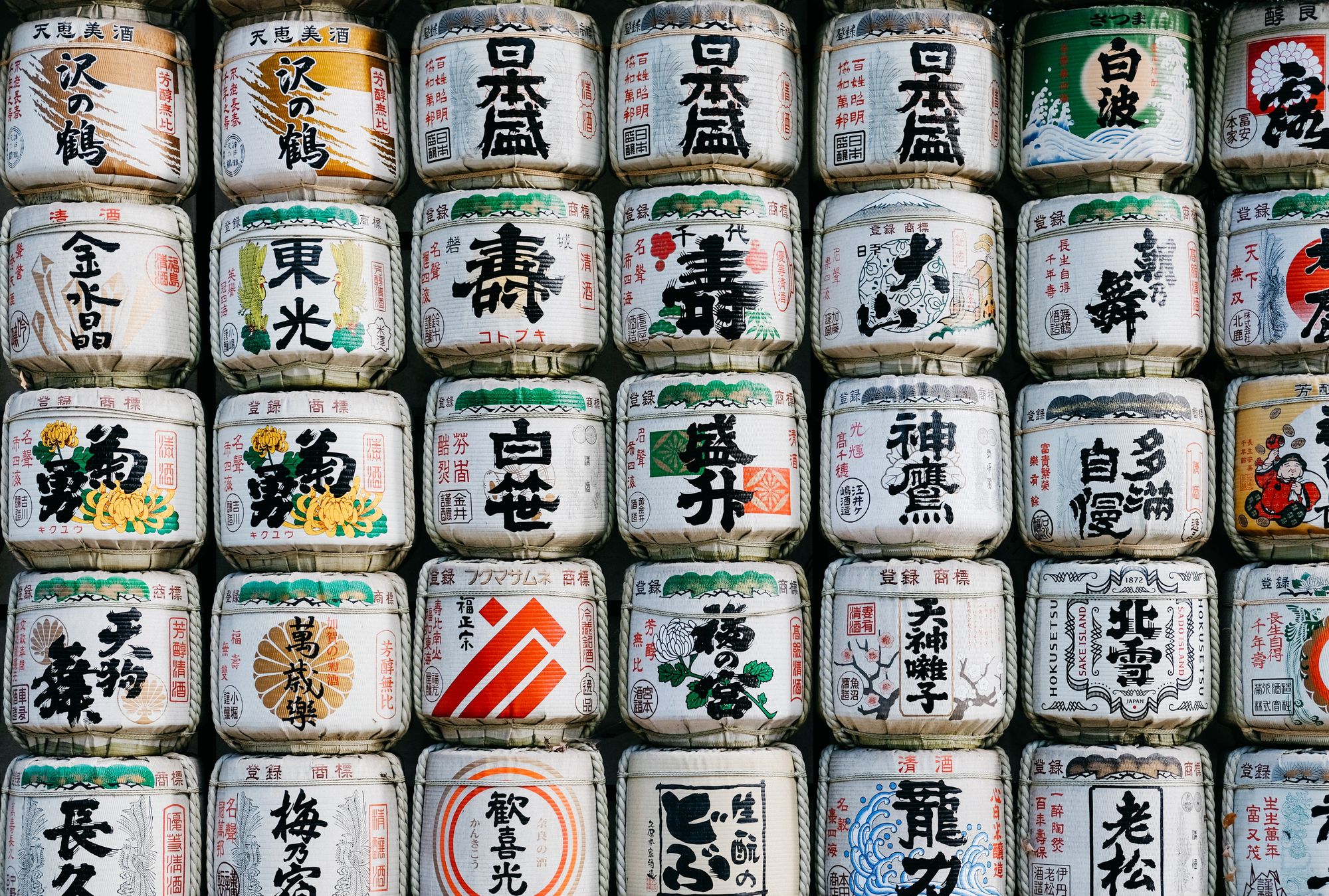
10 Essential Japanese Phrases
- Konnichiwa (こんにちは) – Hello/ good afternoon
- Ohayo Gozaimasu (おはよう ご ざ い ます) - Good morning
- Konbanwa (こんばんは) - Good evening This phrase is made up of Ohayo (おはよう), meaning "early" and Gozaimasu (ご ざ い ます) meaning "is"/"am"/"are". So, its literal translation is "it is early". As you can see below, Gozaimasu can be added to Arigatou, meaning "thank you", to make it more polite.
- Arigatou (Gozaimasu) (ありがとう (ご ざ い ます)) – Thank you (polite way)
- Onegaishimasu (お願い し ます)/ Kudasai (くだ さい) - Please
- Sumimasen (すみません) – Excuse me
- Hai (はい) - Yes/ I understand
- Iie (いいえ) - No
- Nihongo ga wakarimasen (日本語がわかりません) - I don't understand Japanese
- Gomen nasai (ごめんなさい) - I'm sorry
Formality In Japanese
Social hierarchy, or your rank compared to others, determines how you will talk to someone in Japanese.
The generally accepted pecking order puts parents above children, teachers above students, customers above shopkeepers, bosses above employees, and elders above younger people.
Moreover, familiarity plays a part in how formal or informal you are with someone. Families will speak more casual Japanese with one another, while strangers use formal terms. Good friends drop formalities entirely and use slang to communicate.
Japanese words are conjugated based on formality. Formal Japanese can be divided into three categories: polite language, honorific language, and humble language.
There is also an informal way of communicating in Japanese, but when you learn Japanese, you often learn the formal first as the conjugation is easier.
Gozimasu and Arigatou
You do not need to worry too much about this as an absolute beginner. Just remember that you can make simple adjustments such as adding gozimasu (ご ざ い ます) to ohayō (おはよう) when saying "good morning" to make it more formal, or to arigatou (ありがとう) to say "thank you" the formal way.
Domo arigato (共 ありがとう) "thank you so much" is also formal. This is a phrase many westerners are familiar with due to the song Mr Roboto by Styx!
Arigato or domo used in isolation are two ways to say "thanks", informally. Use the latter two with friends and family.

Onegaishimasu and Kudasai
Finally, let's revisit when we use Onegaishimasu (お願い し ます) and Kudasai (くだ さい) for "please".
- Kudasai is the more familiar term, while onegai shimasu is more polite and honorable.
- So, you can ask for water, for instance, by using Kudasai (ください) or onegai shimasu ( を お願い し ます), depending on who you are talking to. For example:
- Mizu o onegai shimasu ( 水を お願い し ます) - I would like water, please (formal)
- Mizu o kudasai (水 お ください) - Give me water, please (informal)
Kudasai is a familiar request word that you use when you know you are entitled to something.
For instance, asking a friend or peer for something, or making a request from someone of a lower rank than you. Take a look at the following phrases:
- Mō yamete kudasai (もう やめて くだ さい ) - Please stop
- Chotto matte kudasai (ちょっと 待って くだ さい) - Wait a minute, please
- Kutsu o nuide kudasai (靴を脱いで くだ さい) - Please remove your shoes
- Shio o watashite kudasai ( 塩を渡して くだ さい) - Pass the salt, please
If you are speaking to a teacher, elder, or boss in Japan and don't understand something, you can ask: Mou ichido onegai shimasu (もう一度お願いします) - Could you repeat that, please?
As well as language, gestures also play a part in formality and respect in Japanese culture. One such gesture is the bow, and it matters how deep you bend!
A short bow at 15° is appropriate for a casual greeting. A 30° bow is good for greeting strangers and bosses, while a 45° bow conveys deep respect or an apology.
10 Food & Drink Basic Phrases in Japanese
- Menyū (メニュー) - Menu
- O-sake (お酒) – General term for alcohol (not to be confused with the below)
- Nihonshu (日本酒) – Japanese saké (rice wine)
- Bīru (ビール) - Beer
- Mizu (水) - Water
- Gohan (ご飯) - Rice
- Misoshiru (みそ汁) - Miso Soup
- Sushi (すし) - Sushi
- Mochi (餅 ) - Mochi (a traditional Japanese glutinous rice cake)
- ___ o Kudasai ( をください) – I would like __, please ___ o onegai shimasu (を お願い し ます) - I would like ___ please
In addition to food and drink, you might want to know how to ask for other specific services in a Japanese restaurant.
- Kin'en seki (禁煙席) - Non-smoking seat
- Kurejittokādo wa tsukaemasu ka? (クレジットカードは使えますか) - Do you accept credit cards?
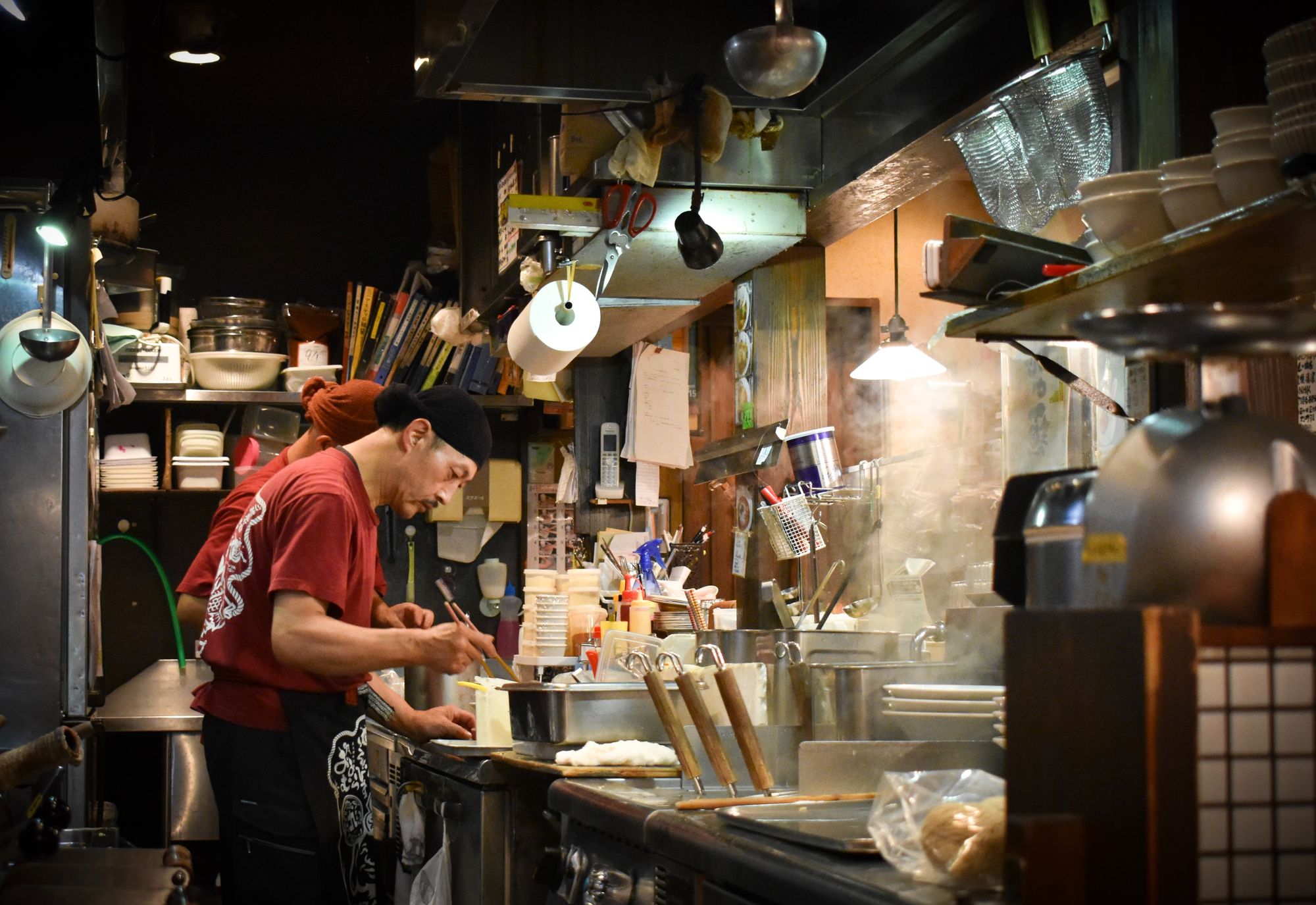
Japanese Restaurant Etiquette
It is not enough simply to know a few polite phrases in Japanese. You will also need to understand a bit about restaurant etiquette.
In many Japanese restaurants, there are low tables with cushions, rather than or in addition to western-style tables and chairs.
Cushions will be placed on tatami floors, which are a traditional kind of mat flooring in Japanese restaurants. You should never wear shoes or slippers on tatami flooring, and avoid stepping on anyone's cushion except your own.
Japanese Restaurant Vocabulary in Context
When the food comes, it is customary to wait for everyone's meals to arrive, then say:
- Itadakimasu (いただきます) - "I gratefully receive (this meal)"
You should say this before starting to eat. This is similar to the French "bon appetit".
However, if a dish is best eaten hot and it arrives before the others, the following phrase can be used:
- Osaki ni douzo (お先 に どうぞ) - "Please go ahead"
Other useful Japanese resturant phrases include:
- Daijyoubu Desu (だいじょうぶです) - "I'm fine now" (this is a polite way to decline something from a waiter offering you more water or food).
You can conclude the meal by saying the phrase:
- Gochisousama deshita (ごちそうさま でした) - "Thank you for the feast."
This expresses gratitude to the chef and for the ingredients of the meal.
At the end of your meal, you should use the following:
- Okaikei wo onegaishimasu (お会計 を お願いします) - "The check, please."
Manners in Convenience Stores
The following piece of vocaulary will be useful:
- Konbini (コンビニ) - Convenience store
In Japan, simple things like unfolding your bills before you hand them over to the cashier and not throwing down your coins are considered polite as they make the worker's job easier.
Customer service in Japan is famously excellent, so treat the clerk with respect and kindness, as you should in any other foreign country.

10 Transportation-Related Phrases to Get Around Japan
- ___wa doko desu ka ( は どこ です か) – Where is __?
- Eki (駅) - Train station eg. Eki wa doko desu ka (駅 は どこ です か) - Where is the train station?
- Basu noriba (バスのりば) - Bus stop
- Dono Densha (どの電車)/ Dono basu (どのバス) – Which train?/ Which bus?
- (Tōkyō) ni ikitai ( ([東京) に行きたい) – I want to go to (Tokyo)
- Kippu (切符) – Ticket
- Katamichi kippu (片道切符)/ Kaeri no kippu (帰りの切符) - One-way ticket/ return ticket
- Hoteru (ホテル) - hotel
- Toire ( = トイレ) - Bathroom / toilet
- Ikura desu ka (いくら です 化) - How much is it?
Japanese travel phrases in context
Now, you can start to put some of the words we have learned together to create a proper phrase.
- Hiroshima e no kaeri no kippu o onegai shimasu, ikura desu ka (広島への帰りの切符をお願いします、いくらですか) - "I would like a return ticket to Hiroshima, how much is it?"
These essential Japanese travel phrases will come in handy when visiting Japan, as an estimated 70% of the population does not speak English.
You'll find more people with some level of English in the top destinations, such as Tokyo, Kyoto, and Osaka, while you might hit a language barrier in smaller towns.
Basic Japanese Phrases and Pronunciation in Japanese
An important phrase you will likely say a lot is desu ka ( です か).
This indicates a question when placed at the end of a sentence. So, let's make sure you can say it correctly, as it may not be pronounced as you'd expect.
You want to pronounce desu like “dess.” Remember, the “u” sound at the end is dropped.
This happens a lot with words that end with “u” sounds, including:
- Arigatou Gozaimasu (ありがとう ご ざ い) - "thank you" (which is pronounced "arigatou gozaimas").
We have already seen desu ka in the phrase ikura desu ka, " how much is it?", and wa doko desu ka , "where is it?".
It is also used in the following key Japanese phrases:
- O genki desu ka (お元気 です 化) - How are you? (Pronounced "o genki dess ka").
- Nani desu ka (何ですか なにですか) - (polite) What?
- Sou desu ka (そうですか) - Is that so?/ Really? The response, Sou desu (そうです), pronounced "so dess", means "that is so" or "yes, really".
- Kore wa na ndesu ka (これ わ なん です か) - What is this?
You can create many more Japanese phrases for asking questions by using desu ka , so try to remember this pronunciation as it will get you a long way.
Basic Greetings Tourists Should Know in Japan
If you only have a short time before your trip to Japan, at the very least learn these simple greetings and make sure you know the dos and don'ts of public affection.
- Kon'nichiwa, watashinonamaeha ___ (こんにちは、私の名前は) - "Good afternoon, my name is ___"
- Konbanwa, hajimemashite (こんばんは、はじめまして) - "Good evening, nice to meet you."
- Namae wa nandesu ka? (名前はなん です か) - "What is your name?"
Making Friends in Japan
Now that you know how to greet Japanese people appropriately, you can start to build a relationship with them.
Generally, when you meet people while traveling abroad, you ask:
- Eigo o hanashimasu ka? (英語を話せますか) - "Can you speak English?"
- Anata wa doko no kuni no shusshindesu ka (あなたはどこの国の出身 です か) - "Which country are you from?"
- Doko no shusshindesu ka? ( どこの出身 です か) - "Where are you from?" (more simple phrase).
- Anata wa doko ni sun deru nodesu ka? (あなたはどこに住んでるの です か) - "Where do you live?"
If you would like to become friends or make a date, you might want to gauge the person's interests:
- Anata wa (eiga ga) sukidesuka? (あなたは (映画が) 好き です か) - "Do you like (the cinema)?"

Travel Tips for Japan
Remember Japanese manners! This includes restaurant etiquette, limiting public displays of affection, using polite language, and respecting the culture.
You cannot expect everyone in the world to speak your language, but by using a simple Japanese phrase here and there you can show that you are willing to try and meet them halfway.
Choose the season wisely. Visit Japan in Winter for the ski season, or in Spring for unforgettable views of cherry blossoms.
Or, choose an Autumn trip to avoid tourist crowds and peak travel seasons. The same applies to Summer, though this is typhoon season, which puts a lot of tourists off.
What is Ryokou?
Ryokou (旅行) is a Japanese noun meaning "travel" or "trip".
Broken down, 旅 is the kanji character meaning "travel", "trip", or "journey", and 行 is the kanji character used to express the act of going or visiting.
Use this next phrase if you want to impress your new Japanese friends by using their local language:
- Watashi wa ryokou ga sukidesu (私は旅行が好きです) - "I love traveling".
If you're studying Japanese so you can take a trip to Japan, this is undoubtedly true!
How to Learn Japanese Naturally
If you are looking for additional resources for learning Japanese, check out Lingopie .
This is an online streaming platform that is designed to get you speaking Japanese and learning Kanji with ease through immersion in Japanese TV and movies.
Lingopie provides an authentic and natural way to learn other languages and makes learning Japanese fun.
This is a great tool for busy people who cannot sit through hours of Japanese classes every week.
Simply relax in the evening and watch half an hour of Japanese TV. Allow your brain to absorb the language naturally and pick up useful phrases and pronunciation.
And if you want to keep binge watching awesome shows check out our other Japanese articles. We listed 9 Japanese Movies on Netflix that can help your studies and we also did a guide to learning Japanese with anime ! We also recommend you to check out our free guide " Best way to learn Japanese ".

Summing up: Basic Travel phrases in Japanese
Now you can travel to Japan armed with some useful Japanese phrases and a basic understanding of the culture and mannerisms of the country.
You will be able to conduct yourself appropriately while dining, make your way around train stations, and if you speak slowly and clearly, begin to build relationships.
Remember, nobody will expect you to speak Japanese fluently, but if you can use these simple phrases, your travels will be simplified.
The average Japanese native speaker is unlikely to speak English fluently. You may hit a language barrier, but if you remember your polite gestures and restaurant etiquette, you can still do very well in Japan and impress the locals.
Hopefully, this guide has given you some travel inspiration. Have a wonderful time on your trip and good luck on your path to learning Japanese!

Lorena Macedo
![basic japanese travel phrases German Cases Simply Explained: A Guide to German Cases [Grammar Guide]](https://lingopie.com/blog/content/images/2022/10/German-Cases--1-.webp)
German Cases Simply Explained: A Guide to German Cases [Grammar Guide]
![basic japanese travel phrases How to Learn Korean with Money Heist: Korea – Joint Economic Area [Free Guide]](https://lingopie.com/blog/content/images/size/w1200/2022/08/money-heist-korea.png)
How to Learn Korean with Money Heist: Korea – Joint Economic Area [Free Guide]
You might also like.

How to Count in Japanese From 1-100

Master the Basics: How to Quickly Count in Japanese

Japanese Valentine's Day Guide

7 Japanese Horror Stories to Learn Japanese
Get the secret guide to language learning with tv and music for free, browse posts by popular tags.
- Skip to primary navigation
- Skip to main content
- Skip to primary sidebar
- Skip to footer
StoryLearning
Learn A Language Through Stories
73 Basic Japanese Phrases to Survive Your First Conversation With a Native
Whether you’re in the early stages of learning Japanese or you’ve been practicing for a while, the thought of having a conversation with a native speaker can be nerve-wracking.
I've been there plenty of times too. So I bet your inner monologue is along these lines:
- Will they understand? What if I say something wrong by accident?
- What do I do if I don’t have the vocab to say what I’m thinking?
These thoughts are perfectly normal reactions to doing something scary in Japanese, like chatting to a native speaker.
Thankfully, you can go into your first conversation armed with a ton of useful basic Japanese phrases .
Check out the rest of this article to learn 73 handy turns of phrase that will serve you well in any Japanese conversation or when travelling in Japan.
These are also great starting points if you’re just jumping into Japanese for the first time. These basic Japanese phrases will be the backbone on which you can build your Japanese knowledge.
And for a little extra boost to your confidence before you head into a conversation with a native speaker, take a look at this detailed guide to Japanese pronunciation.
By the way, if you want to learn Japanese fast and have fun while doing it, my top recommendation is Japanese Uncovered which teaches you through StoryLearning®.
With Japanese Uncovered you’ll use my unique StoryLearning® method to learn Japanese naturally through story… not rules. It’s as fun as it is effective.
If you’re ready to get started, click here for a 7-day FREE trial.
Anyway, back to our basic Japanese phrases…. let's discover what they are!
8 Must-Know Japanese Greetings
When you meet someone for the first time, you tend to start out with a greeting like “Hello” or pleasantries like “It’s nice to meet you,” right? Japanese is full of simple phrases to start out a conversation.
If you're planning a trip to Japan, then the people you meet at your destination will be thrilled to hear you use these expressions, even if they're the only ones you know:
- #1 Konnichiwa (こんにちは) – Hello
- #2 Ohayou gozaimasu (おはようございます) – Good morning
- #3 Konbanwa (こんばんは) – Good evening
- #4 Moshi moshi (もしもし) – Hello (but only if you’re on the phone or something like Skype)
- #5 Ogenki desu ka? (お元気ですか) – How are you?
- #6 Genki desu (元気です) – I’m good/I’ve been doing well, thanks
- #7 Ohisashiburi desu ne (お久しぶりですね) – Long time no see
- #8 _______ – san mo? (______-さんも?) – And you? (Hint: fill in the blank with your friend’s name. This is a great response to things like “How are you?” because you can say, “I’m good! And you?”)
5 Ways To Learn More About Your Conversation Partner
After you’ve greeted your new conversation partner, it’s likely that you’ll need to know more about them. Keep it rolling—you’ve got this.
- #9 Namae wa nan desu ka? (名前は何ですか) – What’s your name?
- #10 Watashi no namae wa _____ desu (私の名前は__です) – My name is ______
- #11 Doko kara kimashita ka? (どこから来ましたか) – Where are you from?
- #12 Watashi wa ______ kara kimashita (私は__から来ました) – I’m from __________.
- #13 Sou desu ka ? (そうですか) – Is that so?/Really?/I see (Hint: this is a great thing to say after learning where someone is from, what they do, or other facts about their life.)
If you want to keep the conversation going and need some more expressions to help you out, check out these 28 Japanese conversation starters .
7 Essential Japanese Politeness Expressions
You’ve done great so far. You’ve introduced yourself, learned your friend’s name and maybe where they’re from. And now you’re ready to move on to other topics.
But first, try out some of these traditional Japanese politeness phrases so you can apologise, show off your good manners, and be polite at a restaurant before you tuck into a meal.
- #14 Arigatou gozaimasu (ありがとうございます) – Thank you
- #15 Douitashimashite (どういたしまして) – You’re welcome
- #16 Sumimasen (すみません) – I’m sorry/excuse me (Hint: you can use this for anything from apologising for stumbling into someone on the train to asking for help or asking for people to move out of your way.)
- #17 Gomen nasai (ごめんなさい) – I’m sorry (Hint: didn’t we already cover “I’m sorry”? Gomen nasai is less “excuse me” and more “I’m truly sorry from the bottom of my heart.” Use it if you knocked something over and broke it, not if you interrupted someone’s stroll to ask for directions.)
- #18 Yoroshiku onegaishimasu (よろしくおねがいします) – I’m in your debt! (Hint: this one isn’t used in its literal sense most of the time; it’s a way to say “thank you” to someone you are counting on or indebted to. For example, if you're starting out at a new job in Japan, you might introduce yourself and then add this at the end. You might also use it if you’ve asked someone a favour, such as to show you around or give you directions.)
- #19 Itadakimasu (いただきます) – Let’s dig in (Hint: say this before meals as a way to politely say you’re going to begin enjoying your food.)
- #20 Gochisousama deshita (ごちそうさまでした) – That was delicious (Hint: say this after meals as a way to say thank you.)
For more on Japanese culture, customs and politeness check out this post.
9 Ways To Get Clarification In A Japanese Conversation
You’ve been puttering along in a conversation for a while now! But what happens if everything you feared takes place and you get confused? First, remember not to panic.
Even in your native language, you probably have to ask people for clarification or to repeat themselves. You won’t offend anyone if you do the same in a foreign language. Memorise these expressions and just take it slow, one sentence at a time.
- #21 Eigo te iu no wa… (英語ていうのは) – And in English, that’s…?
- #22 Wakarimasen (わかりません) – I don’t understand
- #23 Shirimasen (知りません) – I don’t know
- #24 Wasuremashita (忘れました) – I forgot
- #25 Motto yukkuri kudasai (もっとゆっくり下さい) – Please go a little slower
- #26 Mou ichido kudasai (もう一度下さい) – Could you say that one more time?
- #27 Nihongo de perapera de wa nai desu (日本語でペラペラではないです) – I’m not very fluent in Japanese (Hint: you’re speaking Japanese already! So you can’t say “I don’t know Japanese at all,” right?)
- #28 ___ te iu no imi wa nan desu ka ? (__ていうの意味は何ですか) – What does _____ mean?
- #29 Tetsudatte kuremasen ka ? (手伝ってくれませんか) – Can you help me?
6 Can't-Live-Without Japanese Questions
Japanese is one of the easiest languages to ask questions in—so ask away! In order to make a question in Japanese, just add ka to the end of any sentence.
On top of that, though, there are a few question words that will make your conversations go a lot smoother. Plus knowing how to ask questions is essential for travellers in Japan if you need to find your way or get help.
- #30 Doko desu ka? (どこですか) – Where is it?
- #31 Itsu desu ka? (いつですか) – When is it?
- #32 Doushite? (どうして) – Why?
- #33 Dochira desu ka? (どちらですか) – Which one is it?
- #34 Nan desu ka? (何ですか) – What is it?
- #35 Dare desu ka? (だれですか) – Who is it?
Getting To Know Each Other In Japanese
Perfect! You’ve been talking with someone for a few minutes now, introducing yourself and asking any questions you need to know. Maybe you’ve found out your speaking partner’s name and you’re walking to a coffee shop together.
Now’s the perfect time to find out more about each other and maybe become friends. Try out some of these phrases to open up a whole new avenue of conversation!
- #36 Ima nanji desu ka? (今何時ですか) – What time is it right now?
- #37 Ima (今) – Now
- #38 Ato de (後で) – Later
- #39 Kyou (今日) – Today
- #40 Kinou (昨日) – Yesterday
- #41 Ashita (明日) – Tomorrow
- #42 Mainichi (毎日) – Everyday
- #43 Nansai desu ka? (何歳ですか) – How old are you?
- #44 Doko ni sundeimasu ka? (どこに住んでいますか) – Where do you live?
- #45 Kyoudai ga imasu ka? (兄弟がいますか) – Do you have siblings?
- #46 Ikura desu ka? (いくらですか) – How much does that cost?
- #47 Kore wa nan desu ka? (これはなんですか) – What is this?
- #48 Sore wa nan desu ka? (それはなんですか) – What is that?
- #49 Are we nan desu ka? (あれはなんですか) – What is that? (Hint: Use “ kore ” when something is close to you, “ sore ” when something is away from you but close to the person you’re speaking to, and “ are ” when something is far away from both of you.)
- #50 Toire wa doko desu ka? (トイレはどこですか) – Where’s the toilet?
11 Answers To Common Japanese Questions
You’ve been learning a lot about your new friend, but now the tables have turned—they’re the one asking you questions! How should you respond to many of the most common questions Japanese native speakers might ask you? Try these answers out.
- #51 Hai (はい) – Yes
- #52 Iie (いいえ) – No
- #53 Mada mada (まだまだ) – Not yet
- #54 Kamoshiremasen (かもしれません) – Maybe/I’m not sure
- #55 Tokidoki (時々) – Sometimes
- #56 Zenzen (全然) – Never
- #57 Itsumo (いつも) – Always
- #58 Taitei (たいてい) – Usually
- #59 Watashi wa _____ desu (私は__です) – I’m a _______ (Hint: you can fill this blank with anything you feel describes you. That might be a “student” ( gakusei ), “tourist” ( kankoukyaku ), or even “doctor” ( isha )!
- #60 Daijoubu desu (大丈夫です) – That’s okay
- #61 Ii desu (いいです) – That’s good
A special note on the difference between daijoubu and ii . If someone is asking you if something is “all right,” daijobu is what fits there (think “We don’t sell that here; can I get you X instead?” to which you’d respond with “yes, that’s all right, I suppose”).
If you approve of something or find it nice, that’s the time for ii (think of your friend saying “Hey, we should go to that sushi place!” and you’re really excited to go there. If your friend suggested sushi but you really wanted ramen instead, that would be a case for just using daijoubu .)
5 Japanese Phrases For Special Occasions
What if you’ve found yourself speaking to a native Japanese person for the first time because you decided to go to a celebration or special event, like a birthday or festival? Here are a few useful phrases for almost any situation you might find yourself in.
- #62 Ki o tsukete (気を付けて) – Be careful (Hint: you might say this to someone going on a trip.)
- #63 Yoku dekimashita (よくできました) – Great job
- #64 Omedetou gozaimasu (おめでとうございます) – Congratulations
- #65 Tanjoubi omedetou (誕生日おめでとう) – Happy birthday
- #66 Kanpai (乾杯) – Cheers (Hint: you should really only go for this one if you actually have a drink of some sort in your hand.)
4 Types Of Japanese Goodbye
You’ve had a lot to talk about, but now the time has come to finish your Japanese conversation. How do you wrap things up?
- #67 Ja (じゃ) – Well (Hint: used in the sense of “well, I guess I’d better get going.”)
- #68 Sayounara (さようなら) – Goodbye (Hint: use only if you don’t plan on seeing them again. This is a more final “goodbye.”)
- #69 Ja, mata (じゃまた) – Well, see you (Hint: this is the much more common “goodbye.”)
- #70 Oyasumi nasai (おやすみなさい) – Good night
By the way, if you're based in Tokyo or elsewhere in Japan, but you're still looking for someone to speak to here are my 4 tips for finding a language partner in Japan.
3 Japanese Phrases To Use In Emergencies
I can’t wrap up a list of some of the most important phrases in Japanese without making sure you know a few of the words that could come in very handy. If you find yourself in serious trouble, use these phrases to call for help.
- #71 Tasukete! (助けて) – Help me!
- #72 Keisatsu o yonde kudasai! (警察を呼んで下さい) – Please call the police!
- #73 Kyuu kyuusha o yonde kudasai! (救急車を呼んで下さい) – Please call an ambulance!
Hopefully you never have to use these last three. But it’s always a good thing to remember them in case you need them.
Your Next Steps In Japanese
So there you have it: all of the basic Japanese phrases you need to help you discover and start using the Japanese language.
With these phrases in your back pocket, you will soon find yourself having your first basic conversations with native speakers and getting excited about developing your conversational Japanese.
So now that you’ve learned the basics, are you ready to take the next step in your Japanese adventure?
I'm a big believer in the power of story to enable you to learn a foreign language. That's why I've created Japanese Uncovered , a course that takes you from beginner all the way to an Intermediate level, with my unique StoryLearning® method.
Thanks to StoryLearning®, you learn Japanese naturally through story… not rules. It’s as fun as it is effective.Along the way you'll learn all of the Japanese vocabulary you need for everyday conversations, as well as how to read, write and pronounce Japanese correctly.
The Key To Stress-Free Japanese Conversations
If you’ve mastered even a small number of the important Japanese phrases in this article, you’ll be well on your way to holding a solid conversation with any native speaker you might happen to encounter at home or when you travel.
In language learning, you don't need to re-invent the wheel each time you speak to someone new. Nor do you have to come up with all your answers on the spot.
Try thinking about your answers to some native speaker questions beforehand so you can find the right words (like your age, occupation, and country or language name) to describe yourself!
When you know what to expect, and you've prepared in advance, you'll find that conversations with native speakers go much more smoothly. And most importantly, you'll feel more confident about speaking in Japanese.
Language Courses
- Language Blog
- Testimonials
- Meet Our Team
- Media & Press
Download this article as a FREE PDF ?
What is your current level in Swedish?
Perfect! You’ve now got access to my most effective [level] Swedish tips…
Where shall I send the tips and your PDF?
We will protect your data in accordance with our data policy.
What is your current level in Danish?
Perfect! You’ve now got access to my most effective [level] Danish tips…
NOT INTERESTED?
What can we do better? If I could make something to help you right now, w hat would it be?
Which language are you learning?
What is your current level in [language] ?
Perfect! You’ve now got access to my most effective [level] [language] tips, PLUS your free StoryLearning Kit…
Where shall I send them?
Download this article as a FREE PDF?
Great! Where shall I send my best online teaching tips and your PDF?
Download this article as a FREE PDF ?
What is your current level in Arabic?
Perfect! You’ve now got access to my most effective [level] Arabic tips…
FREE StoryLearning Kit!
Join my email newsletter and get FREE access to your StoryLearning Kit — discover how to learn languages through the power of story!
Download a FREE Story in Japanese!
Enter your email address below to get a FREE short story in Japanese and start learning Japanese quickly and naturally with my StoryLearning® method!
What is your current level in Japanese?
Perfect! You’ve now got access to the Japanese StoryLearning® Pack …
Where shall I send your download link?
Download Your FREE Natural Japanese Grammar Pack
Enter your email address below to get free access to my Natural Japanese Grammar Pack and learn to internalise Japanese grammar quickly and naturally through stories.
Perfect! You’ve now got access to the Natural Japanese Grammar Pack …
What is your current level in Portuguese?
Perfect! You’ve now got access to the Natural Portuguese Grammar Pack …
What is your current level in German?
Perfect! You’ve now got access to the Natural German Grammar Pack …
Train as an Online Language Teacher and Earn from Home
The next cohort of my Certificate of Online Language Teaching will open soon. Join the waiting list, and we’ll notify you as soon as enrolment is open!
Perfect! You’ve now got access to my most effective [level] Portuguese tips…
What is your current level in Turkish?
Perfect! You’ve now got access to my most effective [level] Turkish tips…
What is your current level in French?
Perfect! You’ve now got access to the French Vocab Power Pack …
What is your current level in Italian?
Perfect! You’ve now got access to the Italian Vocab Power Pack …
Perfect! You’ve now got access to the German Vocab Power Pack …
Perfect! You’ve now got access to the Japanese Vocab Power Pack …
Download Your FREE Japanese Vocab Power Pack
Enter your email address below to get free access to my Japanese Vocab Power Pack and learn essential Japanese words and phrases quickly and naturally. (ALL levels!)
Download Your FREE German Vocab Power Pack

Enter your email address below to get free access to my German Vocab Power Pack and learn essential German words and phrases quickly and naturally. (ALL levels!)
Download Your FREE Italian Vocab Power Pack
Enter your email address below to get free access to my Italian Vocab Power Pack and learn essential Italian words and phrases quickly and naturally. (ALL levels!)
Download Your FREE French Vocab Power Pack
Enter your email address below to get free access to my French Vocab Power Pack and learn essential French words and phrases quickly and naturally. (ALL levels!)
Perfect! You’ve now got access to the Portuguese StoryLearning® Pack …
What is your current level in Russian?
Perfect! You’ve now got access to the Natural Russian Grammar Pack …
Perfect! You’ve now got access to the Russian StoryLearning® Pack …
Perfect! You’ve now got access to the Italian StoryLearning® Pack …
Perfect! You’ve now got access to the Natural Italian Grammar Pack …
Perfect! You’ve now got access to the French StoryLearning® Pack …
Perfect! You’ve now got access to the Natural French Grammar Pack …
What is your current level in Spanish?
Perfect! You’ve now got access to the Spanish Vocab Power Pack …
Perfect! You’ve now got access to the Natural Spanish Grammar Pack …
Perfect! You’ve now got access to the Spanish StoryLearning® Pack …
Where shall I send them?
What is your current level in Korean?
Perfect! You’ve now got access to my most effective [level] Korean tips…
Perfect! You’ve now got access to my most effective [level] Russian tips…
Perfect! You’ve now got access to my most effective [level] Japanese tips…
What is your current level in Chinese?
Perfect! You’ve now got access to my most effective [level] Chinese tips…
Perfect! You’ve now got access to my most effective [level] Spanish tips…
Perfect! You’ve now got access to my most effective [level] Italian tips…
Perfect! You’ve now got access to my most effective [level] French tips…
Perfect! You’ve now got access to my most effective [level] German tips…
Download Your FREE Natural Portuguese Grammar Pack
Enter your email address below to get free access to my Natural Portuguese Grammar Pack and learn to internalise Portuguese grammar quickly and naturally through stories.
Download Your FREE Natural Russian Grammar Pack
Enter your email address below to get free access to my Natural Russian Grammar Pack and learn to internalise Russian grammar quickly and naturally through stories.
Download Your FREE Natural German Grammar Pack
Enter your email address below to get free access to my Natural German Grammar Pack and learn to internalise German grammar quickly and naturally through stories.
Download Your FREE Natural French Grammar Pack
Enter your email address below to get free access to my Natural French Grammar Pack and learn to internalise French grammar quickly and naturally through stories.
Download Your FREE Natural Italian Grammar Pack
Enter your email address below to get free access to my Natural Italian Grammar Pack and learn to internalise Italian grammar quickly and naturally through stories.
Download a FREE Story in Portuguese!

Enter your email address below to get a FREE short story in Brazilian Portuguese and start learning Portuguese quickly and naturally with my StoryLearning® method!
Download a FREE Story in Russian!
Enter your email address below to get a FREE short story in Russian and start learning Russian quickly and naturally with my StoryLearning® method!
Download a FREE Story in German!
Enter your email address below to get a FREE short story in German and start learning German quickly and naturally with my StoryLearning® method!
Perfect! You’ve now got access to the German StoryLearning® Pack …
Download a FREE Story in Italian!
Enter your email address below to get a FREE short story in Italian and start learning Italian quickly and naturally with my StoryLearning® method!
Download a FREE Story in French!

Enter your email address below to get a FREE short story in French and start learning French quickly and naturally with my StoryLearning® method!
Download a FREE Story in Spanish!
Enter your email address below to get a FREE short story in Spanish and start learning Spanish quickly and naturally with my StoryLearning® method!
FREE Download:
The rules of language learning.

Enter your email address below to get free access to my Rules of Language Learning and discover 25 “rules” to learn a new language quickly and naturally through stories.
What can we do better ? If I could make something to help you right now, w hat would it be?
What is your current level in [language]?
Perfect! You’ve now got access to my most effective [level] [language] tips…
Download Your FREE Spanish Vocab Power Pack

Enter your email address below to get free access to my Spanish Vocab Power Pack and learn essential Spanish words and phrases quickly and naturally. (ALL levels!)
Download Your FREE Natural Spanish Grammar Pack
Enter your email address below to get free access to my Natural Spanish Grammar Pack and learn to internalise Spanish grammar quickly and naturally through stories.
Free Step-By-Step Guide:
How to generate a full-time income from home with your English… even with ZERO previous teaching experience.
What is your current level in Thai?
Perfect! You’ve now got access to my most effective [level] Thai tips…
What is your current level in Cantonese?
Perfect! You’ve now got access to my most effective [level] Cantonese tips…
Steal My Method?
I’ve written some simple emails explaining the techniques I’ve used to learn 8 languages…
I want to be skipped!
I’m the lead capture, man!
Join 84,574 other language learners getting StoryLearning tips by email…
“After I started to use your ideas, I learn better, for longer, with more passion. Thanks for the life-change!” – Dallas Nesbit
Perfect! You’ve now got access to my most effective [level] [language] tips…
Perfect! You’ve now got access to my most effective [level] [language] tips…
Join 122,238 other language learners getting StoryLearning tips by email…
Find the perfect language course for you.
Looking for world-class training material to help you make a breakthrough in your language learning?
Click ‘start now’ and complete this short survey to find the perfect course for you!
Do you like the idea of learning through story?
Do you want…?

- Intensive Japanese Courses
- Lite Intensive Japanese Courses
- Part-time Japanese Classes
- Private Lessons
- JLPT Prep Courses
- Online Japanese Lessons
- JLPT Online Instruction & Exercise – 6 Month Course
- Self-Study Courses
- About Coto Japanese Academy
- Iidabashi Japanese Language School
- Shibuya Japanese Language School
- Yokohama Japanese Language School
- Minato Japanese Language School
- Our Teaching Philosophy
- Student Visa Support
- Corporate Solutions
- Japanese Blog
- All articles
Japanese Common Words: What to say while travelling in Japan

Are you planning on traveling Japan soon , but you don’t know any Japanese? Or are you looking to learn some Japanese common words that can help you get around in Japan?
Then this blog is right up your alley, with some simple Japanese travel words as well as some transportation related phrases to help you get around Japan!
In this article, we will review the basic travel Japanese phrases Nakamura sensei teaches in the video below.
Beginner Japanese Travel Phrases – Basic Vocabulary
Before getting into some more difficult phrases, let’s take a look at some basic travel Japanese words in the appropriate context. You may already be familiar with this vocabulary.
However Japanese words often carry slightly different meanings in different contexts.
So let’s look at some vocabulary!
大丈夫/だいじょうぶ/Daijoubu
The video below depicts a traveling Nakamura-sensei searching for their passport.
“Daijoubu” meaning “ok” or “fine”. This extremely handy phrase is used in all sorts of situations in Japan! And travel scenarios are no exception.
だいじょうぶですか? Daijoubu desu ka? Is everything ok/Are you ok?
はい、だいじょうぶです! Hai, daijoubu desu! Yes, I’m fine/Everything is fine!
すみません・すいません/Sumimasen ・ suimasen
“Sumimasen” meaning “please excuse me” or “pardon me”. Another common phrase heard in various contexts in Japan!
Nakamura-sensei almost forgot her passport – but luckily the attendant got her attention with “sumimasen”. すみません、お客様! Sumimasen, okyaku sama! Excuse me, miss! And how did Nakamura-sensei respond?
ありがとうございます/Arigatou gozaimasu
“Arigatou gozaimasu” meaning “thank you” – this is a polite expression of gratitude. The casual form shortens to “arigatou”.
え? あー、すいません、ありがとうございます! Eh? Ah-, suimasen, arigatou gozaimasu! Hm? Oh, excuse me, thank you!
Perhaps a direct translation of this exchange into English sounds a bit rigid or stiff – but that’s part of what makes polite Japanese – or keigo language – polite.
どうぞ・おさきにどうぞ/ Douzo ・ O saki ni douzo
“Douzo” meaning “please” – to offer someone a favor. “O saki ni douzo” is a way to say “after you”, and is an appropriate phrase to use with strangers.
“O saki ni” roughly translates to “first”. So it’s a little bit like saying “you first”! Now that we have reviewed these basic words, let’s dig into some phrases!
Simple Travel Japanese Phrases
タクシーのりばはどこですか? Where is the taxi platform?
To understand how to use this phrase, let’s first break it down. タクシー (takushii) of course means “taxi”, and のりば (noriba) is a “terminal” or “platform”. So タクシーのりば is a taxi stop or taxi platform.
は (wa) is the grammar particle identifying the taxi stop as the subject of the sentence. You can read more about は in this blog post about Japanese grammar particles !
〜はどこですか? Where is~?
〜はどこですか (doko desu ka) is a useful question ending that simply means “where is~?” “Doko” means where and “desu ka” is the to be verb. The か (ka) indicates it is a question.
This phrase can be used with all sorts of other places or items, travel-related or otherwise. Below is a short vocabulary list of some travel-related words you can use with 〜はどこですか?
バスのりば – basu noriba – bus stop 駅(えき) – eki – train station トイレ – toire – washroom, bathroom 3番線 (さんばんせん)- san ban sen – platform number 3
You can replace 3番線 with any number necessary to refer to whichever platform you need. That’s all for today’s blog! Remember to watch the video and subscribe 🙂
Looking for Online Japanese Lessons?
Interested in learning Japanese online? Look no further than Coto’s Online Japanese lessons ! Sign up for a free account and browse our teachers!
Test your Japanese level!
Recent Articles

Start Learning Japanese With Coto Online

Japanese Proverbs: Interesting ways to learn the language and culture

How to Use Ganbare, Ganbatte, Ganbarimasu in Japanese: Give It Your Best!
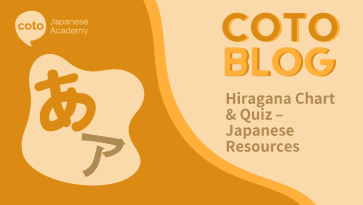
Hiragana Chart & Quiz – Japanese Resources

Useful Japanese travel phrases for your everyday life in Japan
by Venese | Jun 11, 2020 | Blogs , Japanese Language | 0 comments
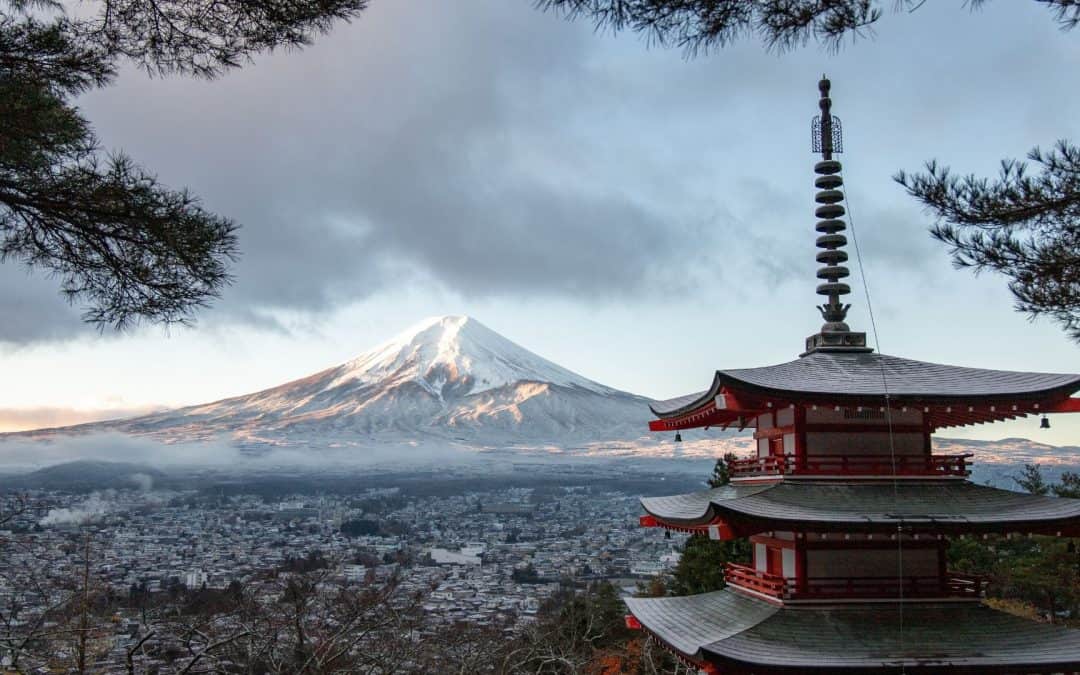
If you are planning to travel or move to Japan and don’t speak any Japanese, here are some common daily Japanese phrases you can memorise easily and quickly to get by every day!
If you are learning Japanese phrases or want to grasp the Japanese language quickly and easily , check out our FREE Japanese language 5-day challenge ! You will be able to master simple casual Japanese conversation in just 5 days!
Want to find out more about Japan language? Check out:
- Top 30 Japanese slangs to help you sound like a pro
- Common mistakes people make when learning Japanese
- Best way and tips to learn the Japanese language quickly and easily
- Japanese Phrases For Your Night Out in Tokyo
- Useful Japanese slangs
- Japanese onomatopoeia
Table of Contents
Japanese travel phrases
Basic greetings and phrases .

Here are some essential travel phrases you would need when travelling in Japan.
“ Ohayou gozaimasu (おはようございます)” means “good morning”. You can shorten it to just ‘ohayou’ if you’re speaking to a friend or someone you know well.
“ Konnichiwa (こんにちは)’ is usually translated as “good afternoon”, but it’s also understood as ‘hello’ and you’ll hear it throughout the day.
“ Konbanwa (こんばんは) means “good evening” and is used throughout the evening and night.
“ Arigatou gozaimasu (ありがとうございます)” means “thank you”. Similarly to “ohayou gozaimasu”, you can omit ‘gozaimasu’ if you’re speaking to a friend or someone you know well.
“ Douzo (どうぞ)’ means “please go ahead”. You can use this when opening the door for someone, offering a seat to someone, or asking someone to eat.
“ Sumimasen (すみません)’ has been said to be one of the most difficult Japanese words to translate as it can mean several things. It can mean “I’m sorry” or “thank you”, but it’s most commonly translated as “excuse me”.
For example, when a waiter refills your glass, you’ll use ‘sumimasen’ to say “thank you” (instead of “arigatou gozaimasu”) in a roundabout way: “excuse me for making you fill my glass.” Or, if you accidentally bump into someone, you use ‘sumimasen’ to say “I’m sorry”: “excuse me for bumping into you.” You’ll probably use it more commonly to get someone’s attention or to get past someone.
“ Gomennasai (ごめんなさい)’ means “I’m sorry”. We’ve just discussed that ‘sumimasen’ can also mean “I’m sorry”, but unlike ‘sumimasen’ that has more humble connotations, ‘gomennasai’ has more sorrowful, guilty connotations. If you were to cause a person great distress, for example if you spilled a drink down their shirts or if you lost something of theirs, you would use ‘gomennasai’ instead of ‘sumimasen’.
Essential phrases
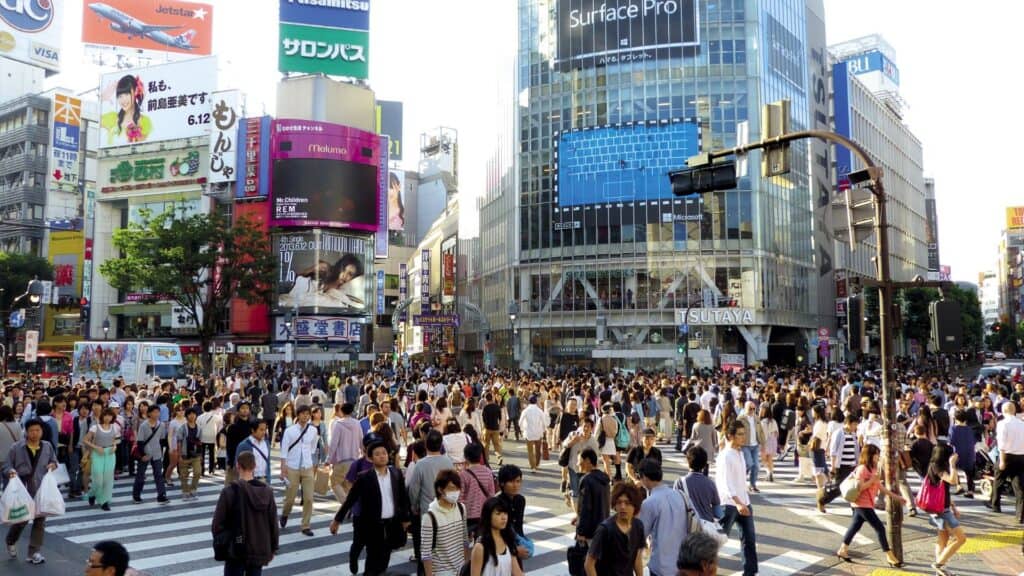
When you are travelling in Japan, these Japanese common daily phrases are very important for you. Check these Japanese travel phrases so your travel in Japan will be more convenient.
Both “ onegaishimasu (お願いします)” and “ kudasai (ください)” mean “please”, but “onegaishimasu” is tied more to actions, while “kudasai” is tied more to things. For example, if a cashier in a convenience store asks if you’d like them to microwave your meal (an action), you would use “onegaishimasu” to say “yes, please do this.” In a restaurant, if you’d like a glass of water (a thing), you would say “mizu (水) kudasai” to say, “water, please.”
They’re used interchangeably in some situations so don’t worry too much about using the “correct” one; you’ll be understood just fine either way.
“ Daijoubu (大丈夫)” means “okay” or “fine”. For example, if a cashier asks if you’d like a plastic bag, you can say “daijoubu desu” to say “I’m fine, thanks.” Or you may ask a cashier, “kurejitto kaado (クレジットカード) wa daijoubu desu ka” to ask, “Is [paying with] a credit card okay?”
For the following few phrases, remember these basics.
~masu is positive. ~masen is negative. ~ka is a question mark.
For example:
“ Ari masu (あります)” means “I have” or “there is”. “ Ari masen (ありません)” means “I do not have” or “there isn’t”. “ Arimasu ka (ありますか)” asks “do you have” or “is there”.
For example, you may ask a bar owner, “toire (トイレ) wa arimasu ka ” to ask, “is there a toilet?”, and he/she may reply, “toire wa ari masu /ari masen ” to answer “there is/isn’t a toilet.” This will be particularly handy in shops and restaurants when you’re looking for a particular product or food item.
“ Deki masu (できます)” means “I can”. “ Deki masen (できません)” means “I cannot”. “ Dekimasu ka (できますか)” asks “Can you”.
For example, someone may ask you “tenisu (テニス) dekimasu ka (can you play tennis)”, and you can reply with “tenisu deki masu /deki masen ” to answer “I can/cannot play tennis.”
“ Wakari masu (わかります)” means “I understand”. “ Wakari masen (わかりません)” means “I do not understand”. “ Wakarimasu ka (わかりますか)” asks “do you understand.”
For example, you may ask someone, “eigo (英語) ga wakarimasu ka (Do you understand English?)”, and they will reply “eigo ga wakari masu /wakari masen ” to answer “I do/do not understand English.”
Restaurant Phrases
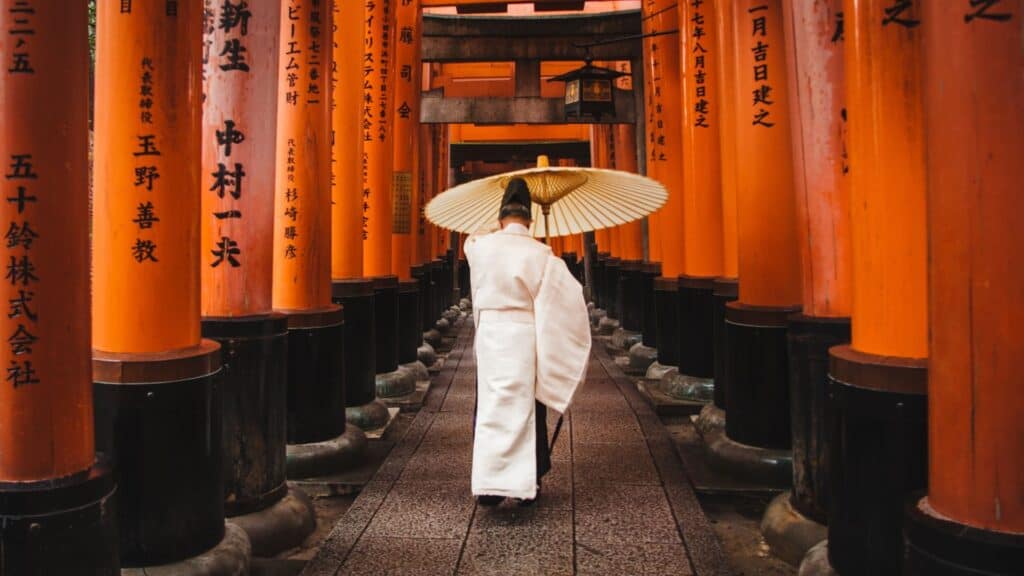
Here are some amazing travel phrases you would need in a restaurant to easily communicate with the waiters and restaurant staff. You can use these Japanese common daily phrases everyday in Japan.
‘ Yoyaku (予約)’ means ‘reservation’. To tell someone you have a reservation, you say, “yoyaku ga ari masu ”.
‘ Otooshi (お通し)’ refers to an appetiser that you receive in exchange for paying a mandatory entry/table fee that some restaurants will charge. These entry/table fees range anywhere between 300 and 1000 yen (USD$2.8 to $9.35).
‘ Omakase (お任せ)’ is derived from the verb “omakase masu” which means to “leave it up to” someone. When asking for ‘omakase’ in a restaurant, you are “leaving it up to” the chef to decide what to serve you. This is usually available only in high-end restaurants, especially sushi restaurants.
‘ Osusume (おすすめ)’ means ‘recommendation”. This is really useful if you visit restaurants that don’t have English menus; you can simply ask the waiter/waitress for a recommendation, which is usually the restaurant’s signature dish.

“___ wa nan desu ka (___はなんですか)” asks “what is”. For example, “kore (これ) wa nan desu ka” means “what is this?”
“___ wa doko desu ka (___はどこですか)” asks “where is”. For example, “eki (駅) wa doko desu ka” means “where is the station?”
“___ wa ikura desu ka (___はいくらですか)” asks “how much is”. For example, “biiru (ビール) wa ikura desu ka” means “how much is a beer?”
Which of these Japanese travel phrases do you like the most? Let us know which Japanese common daily phrase you will use in the comment section below.
Learning a new language can be challenging but with the right tools, it will be a more fun and exciting journey for you. To get your foot in the door in the world of Japanese language, we have prepared a 5-day challenge for you . Each day, we will send you an email with easy and quick tips for learning Japanese language and essential Japanese phrases straight to your mailbox. By the end of the 5-days, you will be able to hold a small conversation in Japanese! It is completely free so if you’re interested, just click here to sign up!
Want to find out more about Japan? check out Honest review on this Japanese language platform and Rocket Languages review on this Japanese learning platform and 25 Useful Japanese descriptive words
If you want to learn more about how to introduce yourself, say “this” and “that”, “here” and “there”, and just master the casual Japanese language, come and join the Japanese language 5-day challenge .
Submit a Comment Cancel reply
Your email address will not be published. Required fields are marked *
Save my name, email, and website in this browser for the next time I comment.
Recent Posts
- The Best Japan Internet Access Options: Budget SIM Card Versus Pocket WiFi
- 29 Best Summer Destinations in Japan
- Top Places to Visit in Japan in June: Revealing 15 Must-See Destinations
- One Night in Tokyo: Insider Tips for an Epic Mini Adventure
- 17 Spine-Chilling Haunted Places in Japan to Discover
Recent Comments
- Tere Bellido on Autumn in Japan: 60+ Spots to Enjoy Autumn Leaves (Koyo) from September to December
- Vijay Singh on Ultimate guide to Zamami Island in Okinawa: What to do and hidden gems
- Lori on Overnight and Weekend Trips from Tokyo: 12 Enchanting Destinations for a Picture-Perfect Getaway!
- Robie on How much does it cost to live in Japan? You might be surprised
- Sidney Johnson on How much does it cost to live in Japan? You might be surprised
30+ common Italian phrases for your trip to Italy
There's no better way to level up your trip to Italy than by practicing your Italian! Learning a few key phrases will help you feel more confident ordering in an Italian gelateria (gelato shop) and chatting with locals over an espresso and colazione (breakfast).
Here are the most important phrases you'll need in Italy!

Italian 101
You don't have to be fluent to have fun with Italian. You're on vacation, so don't stress! Enjoy using the Italian you know and see what else you learn along the way. (And you might be pleasantly surprised that even beginners can have real conversations !)
It's the effort that counts. Using some Italian shows locals that you're interested in their culture and community .
Study smart, not hard. Focus on the most useful Italian words and phrases , and worry less about getting every grammar detail right. A few key words go a long way!
Asking for help
Getting around town, ordering food.

Local language
Buon giorno! It's considered polite to greet people with "good morning" or "good afternoon" when you enter stores, cafés, or souvenir shops.
Soften those "k" sounds. In Tuscany, many "k" sounds are pronounced like "h"—so order a Coca Cola by asking for a Hoha Hola!
The beginning of your journey with Italian 🇮🇹
These basics will get you far in Italy, but there's a lot more Italian where that came from. To make real connections during your trip, let Duolingo be your guide! Our bite-sized lessons make it easy to fit study time into your busy schedule, and our entire Italian course is free—so you can save your euros for souvenirs.
Related Posts All Posts
16 common english acronyms every learner should know, how math can turn every meal into a masterpiece.

IMAGES
VIDEO
COMMENTS
Greetings and Basic Japanese Phrases. I'll provide the hiragana, kanji and romaji for each word, and will explain the use of certain Japanese phrases for tourists in context. 1. Hello — konnichiwa. こんにちは. 2. Good morning — ohayou gozaimasu. おはようございます. 3.
Asa (朝) - Morning. This one is fairly self-explanatory: asa means morning. While it's no surprise that a food-loving culture like Japan has multiple words for breakfast, one of the most common is asagohan ( gohan literally means rice, but is more generally used to mean food ). 14. Kyou (今日) - Today.
This guide to basic Japanese phrases for travel will cover: 37 Basic Japanese phrases for tourists' everyday use; How to pronounce simple Japanese words and phrases ; The three Japanese language systems simplified; The Japanese number system simplified; FREE Japanese for tourists cheat sheet PDF download for offline use
If you spend time learning any basic Japanese phrases and words, start with these 83 Japanese travel phrases so that you can head into Japan on the right foot! Regardless of where you are or what you're doing, two of the most important words you'll need to know are arigatou gozaimasu and sumimasen. Arigatou (gozaimasu) means "thank you ...
Read on to learn one hundred basic Japanese phrases with their meaning and pronunciation. For a smooth trip, ... Top 100 Japanese Phrases for Travel. 1. Basic Expressions: Greetings and Thanks 2. Transportation: Trains, Taxis, Payment 3. Destinations: Shrines, Temples, etc. 4.
I am (name). A humble and polite way to introduce yourself. 4. どうぞよろしく。. (Dōzo yoroshiku. ): Pleased to meet you. The nuance of this phrase is closer to "Please take care of me.". This is because you are "asking for their favor" (to become friends, for their help, etc.) in the future.
Top 30 Japanese Phrases. Outside of Japanese greetings, here are the top 30 phrases that you should learn before visiting Japan: Excuse me - Sumimasen* (すみません) - This phrase is important when trying to get the attention of your waiter in restaurants, and when passing people in tight quarters.
To begin our list of essential Japanese travel phrases, we'll go over greetings and basic travel phrases in Japanese for solid communication. These simple Japanese travel phrases can make a world of difference in your conversations and overall experience in Japan. 1- こんにちは. Romanization: Kon'nichiwa; English Translation: Hello
If you plan to travel to Japan someday, learning some basic Japanese phrases will not onl y help you to survive in Japan, ... If you are interested in learning more Japanese phrases, check out LingoDeer's travel phrasebook and learn 1000+ common Japanese travel phrases for free. You may also encounter some anime expressions;)
The phrase 一つをください ( Hitotsu o kudasai) means "one, please.". You can use it to ask for one ticket, one pastry, one of anything while you're out. Simply point and say Hitotsu o kudasai. 8. "Yes" and "No" in Japanese - はい ( Hai) and いいえ ( Iie) To say "yes" in Japanese, you say はい and "no" is ...
So, here are the most useful Japanese travel phrases. 1. Konnichiwa こんにちは Hello/Good Day. You're probably somewhat aware of this word "Konnichiwa.". A very common Japanese greeting. You can use it to greet people during the day. This means, you wouldn't use it during the morning or evening. 2.
About Japanese language. Learning Japanese phrases can feel intimidating, but don't worry, this article is designed to lead you step by step through the basic Japanese phrases for tourists that will be most useful when visiting Japan.Speaking Japanese fluently requires a few years of commitment, but the idea is to start with a few useful Japanese words and basic phrases before further ...
Essential Japanese travel phrases. 3.1. Basic Japanese phrases for travelers. Basic Japanese phrases for conversation that showcase politeness and cultural respect, encouraging positive interactions with locals and are a base for every communication. Those are basic phrases to know when visiting Japan.
3. すみません ( sumimasen) Excuse me. If you bump into someone or want to get someone's attention, such as a waiter or hotel staff or a stranger on the street, say " sumimasen". You will probably use this phrase and " hai " the most in Japan. 4. はい ( hai) Yes. Saying yes can also mean "I understand".
The Basics: Common Japanese Words and Phrases. 1. Hello - Konnichiwa (こんにちは) People in Japan greet one another with a bow. A bow can range from a modest nod of the head to a deep waist bend. A deeper, longer bow shows respect, while a short nod of the head is casual and informal. 2.
Useful Basic Japanese Phrases. Hello: Konnichiwa (こんにちは) Good morning: Ohayō (おはよう) or ohayō gozaimas (おはようございます) Good evening: Konbanwa (こんばんは) Goodbye (when going away for a long time or not coming back): Sayōnara (さようなら) See you later (when saying bye to friends): Matane (またね)
こんにちは (konnichiwa) This means "good afternoon" or "hello". This is the most common greeting and can be used anytime before the sun sets. おはようございます (ohayou gozaimasu) This means "good morning". If you want to make it less formal, you can just say おはようor ohayou. こんばんは (konbanwa)
This article introduces beginner Japanese phrases handy for practical communication. Learn how to greet people, ask for directions at train stations, order at restaurants, and ask for help. These basic phrases also include audio files to listen to and practice with.
Summing up: Basic Travel phrases in Japanese. Now you can travel to Japan armed with some useful Japanese phrases and a basic understanding of the culture and mannerisms of the country. You will be able to conduct yourself appropriately while dining, make your way around train stations, and if you speak slowly and clearly, begin to build ...
Here are a few useful phrases for almost any situation you might find yourself in. #62 Ki o tsukete (気を付けて) - Be careful (Hint: you might say this to someone going on a trip.) #63 Yoku dekimashita (よくできました) - Great job. #64 Omedetou gozaimasu (おめでとうございます) - Congratulations.
In this article, we will review the basic travel Japanese phrases Nakamura sensei teaches in the video below. Beginner Japanese Travel Phrases - Basic Vocabulary. Before getting into some more difficult phrases, let's take a look at some basic travel Japanese words in the appropriate context. You may already be familiar with this vocabulary.
This list of basic Japanese words and phrases for travelers and tourists is divided into the standard categories of food, locations, transportation, etc. Categories are arranged alphabetically. You do not need to learn all to have a great trip. Pick and choose based on your needs.
You can use these Japanese common daily phrases everyday in Japan. ' Yoyaku (予約)' means 'reservation'. To tell someone you have a reservation, you say, "yoyaku ga ari masu ". ' Otooshi (お通し)' refers to an appetiser that you receive in exchange for paying a mandatory entry/table fee that some restaurants will charge.
There's no better way to level up your trip to Italy than by practicing your Italian! Learning a few key phrases will help you feel more confident ordering in an Italian gelateria (gelato shop) and chatting with locals over an espresso and colazione (breakfast). Here are the most important phrases you'll need in Italy! Italian 101